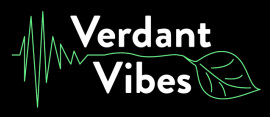PROGRAM NOTES and COMPOSER BIOGRAPHIES
VERDANT VIBES ALBUM PREVIEW SHOW!
June 4, 2023 at 7:30 pm
Grant Recital Hall @ Brown University, 1 Young Orchard Ave, Providence, RI
June 4, 2023 at 7:30 pm
Grant Recital Hall @ Brown University, 1 Young Orchard Ave, Providence, RI
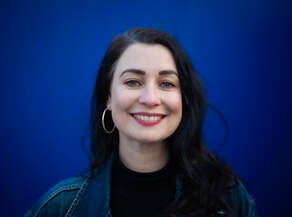
Interruptions, imperfections, and glitches carry negative connotations, but in On Shuffle they are celebrated. I wanted to play the role of an enthusiastic, if somewhat attention-deficient DJ—sampling small riffs to interrupt material, crossfading opposing material, and disjointing the structure with abrupt changes. Structure always looms when working on a piece, so I wanted to liberate myself from the notion of seamlessness and embrace inconsistency.
Amanda Feery is a composer working with acoustic, electronic, and improvised music, having written for chamber and vocal ensembles, film, theatre, installation, and multimedia.
After graduating from Trinity College Dublin with a degree in Music in 2006, she continued her studies in Music and Media Technologies at Trinity College Dublin, completing an M.Phil in 2009. Amanda was the Mark Nelson Fellow in Music at Princeton University, completing her PhD in Music Composition in 2019. Her research focused on Kate Bush’s song suite, The Ninth Wave. Whilst in the U.S, she formed collaborative relationships with a number of ensembles and musicians including Alarm Will Sound, Third Coast Percussion, Ensemble Mise-en, Bearthoven, Quince Contemporary Vocal Ensemble, and cellist Amanda Gookin. Closer to home, past collaborators include Crash Ensemble, RTÉ ConTempo Quartet, the National Symphony Orchestra, This is How We Fly, Chamber Choir Ireland, Dublin Guitar Quartet, Paul Roe, Michelle O’Rourke, and Lina Andonovska.
Her work has been featured at New Music Dublin, First Fortnight Festival, and Dublin Fringe Festival, among others, and she has been composer-in-residence at Bang on a Can Summer Festival, SOUNDscape, and Greywood Arts. Her 2019 residency at Centre Culturel Irlandais focused on recording piano improvisations on public pianos in Paris.
Recent projects include A Thing I Cannot Name, a 20-minute opera film commissioned by Irish National Opera, a score for Tadhg O’Sullivan’s film To the Moon, and the piece Longwave, commissioned by Cork International Choral Festival and Chamber Choir Ireland. Future projects include works for solo violin, solo cello, and orchestra. • amandafeery.com
Amanda Feery is a composer working with acoustic, electronic, and improvised music, having written for chamber and vocal ensembles, film, theatre, installation, and multimedia.
After graduating from Trinity College Dublin with a degree in Music in 2006, she continued her studies in Music and Media Technologies at Trinity College Dublin, completing an M.Phil in 2009. Amanda was the Mark Nelson Fellow in Music at Princeton University, completing her PhD in Music Composition in 2019. Her research focused on Kate Bush’s song suite, The Ninth Wave. Whilst in the U.S, she formed collaborative relationships with a number of ensembles and musicians including Alarm Will Sound, Third Coast Percussion, Ensemble Mise-en, Bearthoven, Quince Contemporary Vocal Ensemble, and cellist Amanda Gookin. Closer to home, past collaborators include Crash Ensemble, RTÉ ConTempo Quartet, the National Symphony Orchestra, This is How We Fly, Chamber Choir Ireland, Dublin Guitar Quartet, Paul Roe, Michelle O’Rourke, and Lina Andonovska.
Her work has been featured at New Music Dublin, First Fortnight Festival, and Dublin Fringe Festival, among others, and she has been composer-in-residence at Bang on a Can Summer Festival, SOUNDscape, and Greywood Arts. Her 2019 residency at Centre Culturel Irlandais focused on recording piano improvisations on public pianos in Paris.
Recent projects include A Thing I Cannot Name, a 20-minute opera film commissioned by Irish National Opera, a score for Tadhg O’Sullivan’s film To the Moon, and the piece Longwave, commissioned by Cork International Choral Festival and Chamber Choir Ireland. Future projects include works for solo violin, solo cello, and orchestra. • amandafeery.com
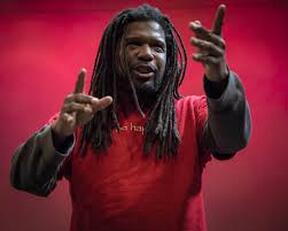
The Story of Asha
+
A Love Supreme Pt. 4: Psalm
My name is Christopher Johnson. I am a Providence resident artist, artist educator, curator and producer here in the city since 2001. Upon arriving in the city I have independently organized and produced performances and events on small and large scales for nonprofit organizations, clubs and citywide festivals. When I started in this city I worked with no budget and focused on building relationships with artist, audiences, businesses, art organizations, and funding organizations. My rapport with afore mentioned individuals has allowed me to gain success after success in grant writing and finding alternative funding for projects (such as Poetry in Public Places for Sound Session 2004 through 2010), in being an agent of intersectionality between organizations (Pairing Everett Dance “Freedom Project” with WaterFire and Roger Williams Memorial Park 2015 &20016), organize and curate independent artist for pop up and stage performance for downtown festivals (First Works 2004, Sound Session 2004-10, Straight Mixed Culture 2005-09, Wilbury Theater’s PVD Fringe Fest 2014-15, PVDFest 2015-16). • thencredibull.com
+
A Love Supreme Pt. 4: Psalm
My name is Christopher Johnson. I am a Providence resident artist, artist educator, curator and producer here in the city since 2001. Upon arriving in the city I have independently organized and produced performances and events on small and large scales for nonprofit organizations, clubs and citywide festivals. When I started in this city I worked with no budget and focused on building relationships with artist, audiences, businesses, art organizations, and funding organizations. My rapport with afore mentioned individuals has allowed me to gain success after success in grant writing and finding alternative funding for projects (such as Poetry in Public Places for Sound Session 2004 through 2010), in being an agent of intersectionality between organizations (Pairing Everett Dance “Freedom Project” with WaterFire and Roger Williams Memorial Park 2015 &20016), organize and curate independent artist for pop up and stage performance for downtown festivals (First Works 2004, Sound Session 2004-10, Straight Mixed Culture 2005-09, Wilbury Theater’s PVD Fringe Fest 2014-15, PVDFest 2015-16). • thencredibull.com
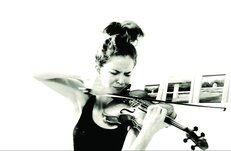
Lullabies for Icarus [for voice/violin]
From within the space and time of the changed world, I wanted to make a performance from the banks of my solitude reaching across toward the banks of yours.
Lullabies for Icarus is in seven miniature movements that are imbued with the story and messages from the Greek myth :
Imprisoned in a tower on the island of Crete and desperate to regain physical freedom, Daedelus (a great inventor) devises an escape plan for himself and his son, Icarus. With wings fashioned out of wax from candles and feathers from birds that circle the tower, the two plan to take flight across open waters toward liberation. "Remember," warns Daedalus to his son as they are about to embark on their journey, "you must keep to the middle point between ocean and sky. If you fly too close to the sun, your wings will melt, and you will fall. If you fly too close to the water, the feathers will become laden with moisture and you will also fall." However, as Icarus feels his mortal body soaring through the air, he is seized by a sense of divine power. Overcome by the ecstasy of flight, he speeds toward the bright allure of the sun and plummets to his quick demise as his father watches from a course of equilibrium. Icarus perishes needlessly because he is unable to find the balance between hubris and complacency, ambition and acceptance. He listens to ego over wisdom, believing himself immune to the elemental laws that govern the earth and that ultimately dictate the fate of all mortals.
Having completed this piece in December, 2019, the timing of it coming through feels like an eerie foreshadowing — some kind of unwitting hint at what has unfolded since.
From me in my own living room, for each one of you in yours, here is Lullabies for Icarus gently accompanied by intermittent clunks from ancient radiators, some faint twittering of birds outside the window, and an occasional thud as my cat, Whisker Moon, jumps down from a piece of furniture. I hope you find meaning, solace and beauty in this offering.
Roseminna Watson: I come from a large family of visual, literary, and performing artists. At the age of three I began work on the violin and one year later finally acknowledged my need for some help with the endeavor. My mother, Clyde Watson, taught me for the following seven years until I went on to study at the New England Conservatory’s Preparatory School with Melba Sandberg and Magdalena Richter. Alongside my musical endeavors, however, I have always pursued visual art and the written word, incorporating these mediums into my expressive practices. I was blessed with the choice of whether or not to attend “regular” school and have always taken charge of my own education. I chose to Home School until the third grade at which point I got curious and asked to go to public elementary school, only to announce that I was going back home a year later, then back, then to boarding school in sophomore year, then back to public, on to college and then two grad schools and a yoga teacher training.
Forever a seeker, I am never satisfied and am always curious about myself, other people, life, and the world. • roseminnawatson.com
From within the space and time of the changed world, I wanted to make a performance from the banks of my solitude reaching across toward the banks of yours.
Lullabies for Icarus is in seven miniature movements that are imbued with the story and messages from the Greek myth :
Imprisoned in a tower on the island of Crete and desperate to regain physical freedom, Daedelus (a great inventor) devises an escape plan for himself and his son, Icarus. With wings fashioned out of wax from candles and feathers from birds that circle the tower, the two plan to take flight across open waters toward liberation. "Remember," warns Daedalus to his son as they are about to embark on their journey, "you must keep to the middle point between ocean and sky. If you fly too close to the sun, your wings will melt, and you will fall. If you fly too close to the water, the feathers will become laden with moisture and you will also fall." However, as Icarus feels his mortal body soaring through the air, he is seized by a sense of divine power. Overcome by the ecstasy of flight, he speeds toward the bright allure of the sun and plummets to his quick demise as his father watches from a course of equilibrium. Icarus perishes needlessly because he is unable to find the balance between hubris and complacency, ambition and acceptance. He listens to ego over wisdom, believing himself immune to the elemental laws that govern the earth and that ultimately dictate the fate of all mortals.
Having completed this piece in December, 2019, the timing of it coming through feels like an eerie foreshadowing — some kind of unwitting hint at what has unfolded since.
From me in my own living room, for each one of you in yours, here is Lullabies for Icarus gently accompanied by intermittent clunks from ancient radiators, some faint twittering of birds outside the window, and an occasional thud as my cat, Whisker Moon, jumps down from a piece of furniture. I hope you find meaning, solace and beauty in this offering.
Roseminna Watson: I come from a large family of visual, literary, and performing artists. At the age of three I began work on the violin and one year later finally acknowledged my need for some help with the endeavor. My mother, Clyde Watson, taught me for the following seven years until I went on to study at the New England Conservatory’s Preparatory School with Melba Sandberg and Magdalena Richter. Alongside my musical endeavors, however, I have always pursued visual art and the written word, incorporating these mediums into my expressive practices. I was blessed with the choice of whether or not to attend “regular” school and have always taken charge of my own education. I chose to Home School until the third grade at which point I got curious and asked to go to public elementary school, only to announce that I was going back home a year later, then back, then to boarding school in sophomore year, then back to public, on to college and then two grad schools and a yoga teacher training.
Forever a seeker, I am never satisfied and am always curious about myself, other people, life, and the world. • roseminnawatson.com
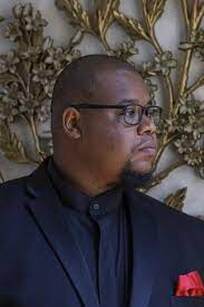
GRIME takes much of its inspiration from composer Giacinto Scelsi and is essentially an exploration of the pitch G. The work is also inspired by Rock music, using extended techniques to recreate the sound of an electric guitar with a distortion pedal. GRIME was written for the 2013 Fresh Inc Festival and premiered at the Grand Finale of Make Music Chicago 2013.
Drawing from inspirations as diverse as Medieval chant to contemporary pop, the music of composer and conductor Evan Williams (b. 1988) explores the thin lines between beauty and disquieting, joy and sorrow, and simple and complex, while often tackling important social and political issues. Williams’ catalogue contains a broad range of work, from vocal and operatic offerings to instrumental works, along with electronic music.
He has been commissioned by notable performers and ensembles including the Cincinnati and Toledo Symphony Orchestras, Urban Playground Chamber Orchestra, Quince Ensemble, the Chamber Orchestra of Philadelphia, and more, with further performances by members of the Detroit, Seattle, and National Symphonies, the International Contemporary Ensemble, the American Brass Quintet, The U.S. Army Band “Pershing’s Own,” New Music Detroit, Fifth House Ensemble, Splinter Reeds, the Verb Ballets, and the Pacific Northwest Ballet. His work has also been featured at festivals such as MATA, RED NOTE, Strange Beautiful Music, SEAMUS, the New Music Gathering, the Electroacoustic Barn Dance, the New York City Electronic Music Festival, and the New Music Festival at Bowling Green State University.
Williams’ work can be heard on multiple commercial releases, including soprano Katherine Jolly’s critically acclaimed debut album Preach Sister, Preach. Gramophone Magazine described his song cycle Emily’s House as “wistful” and praised his settings of Emily Dickinson’s poetry as “rather beautifu[l].”
Williams has received awards and recognition from the American Prize, the National Federation of Music Clubs, ASCAP, Fellowships from the Virginia Center for the Creative Arts, and in 2018, was chosen as the Detroit Symphony’s inaugural African-American Classical Roots Composer-in-Residence. He currently serves as the Steven R. Gerber Composer-in-Residence for the Chamber Orchestra of Philadelphia.
Williams completed his Doctorate of Musical Arts in Composition with a cognate in Orchestral Conducting at the College-Conservatory of Music at the University of Cincinnati. There, he studied with Michael Fiday, Mara Helmuth, and Douglas Knehans, and served as a teaching assistant in electronic music. He holds a Masters degree from Bowling Green State University (Bowling Green, OH), and a Bachelors from the Conservatory of Music at Lawrence University (Appleton, WI). His other primary teachers have been Asha Srinivasan, Joanne Metcalf, Christopher Dietz, Mikel Kuehn, and Marilyn Shrude. He has also received instruction in festivals, masterclasses, and lessons from composers Julia Wolfe, Caroline Shaw, Nico Muhly, Bryce Dessner, David Maslanka, Libby Larson, Evan Chambers, Stacy Garrop, Dan Visconti, and others. He has also trained at the Bard Conductors Institute and the Band Conducting and Pedagogy Clinic at the University of Michigan.
Originally from the Chicagoland area, Williams currently resides in Boston, MA, and serves as Assistant Professor of Composition at the Berklee College of Music, where he teaches composition, conducting, music technology, harmony, and counterpoint. He previously held teaching positions at Rhodes College, Lawrence University, Bennington College, and at The Walden School’s Young Musicians Program. • www.evanwilliamsmusic.info
Drawing from inspirations as diverse as Medieval chant to contemporary pop, the music of composer and conductor Evan Williams (b. 1988) explores the thin lines between beauty and disquieting, joy and sorrow, and simple and complex, while often tackling important social and political issues. Williams’ catalogue contains a broad range of work, from vocal and operatic offerings to instrumental works, along with electronic music.
He has been commissioned by notable performers and ensembles including the Cincinnati and Toledo Symphony Orchestras, Urban Playground Chamber Orchestra, Quince Ensemble, the Chamber Orchestra of Philadelphia, and more, with further performances by members of the Detroit, Seattle, and National Symphonies, the International Contemporary Ensemble, the American Brass Quintet, The U.S. Army Band “Pershing’s Own,” New Music Detroit, Fifth House Ensemble, Splinter Reeds, the Verb Ballets, and the Pacific Northwest Ballet. His work has also been featured at festivals such as MATA, RED NOTE, Strange Beautiful Music, SEAMUS, the New Music Gathering, the Electroacoustic Barn Dance, the New York City Electronic Music Festival, and the New Music Festival at Bowling Green State University.
Williams’ work can be heard on multiple commercial releases, including soprano Katherine Jolly’s critically acclaimed debut album Preach Sister, Preach. Gramophone Magazine described his song cycle Emily’s House as “wistful” and praised his settings of Emily Dickinson’s poetry as “rather beautifu[l].”
Williams has received awards and recognition from the American Prize, the National Federation of Music Clubs, ASCAP, Fellowships from the Virginia Center for the Creative Arts, and in 2018, was chosen as the Detroit Symphony’s inaugural African-American Classical Roots Composer-in-Residence. He currently serves as the Steven R. Gerber Composer-in-Residence for the Chamber Orchestra of Philadelphia.
Williams completed his Doctorate of Musical Arts in Composition with a cognate in Orchestral Conducting at the College-Conservatory of Music at the University of Cincinnati. There, he studied with Michael Fiday, Mara Helmuth, and Douglas Knehans, and served as a teaching assistant in electronic music. He holds a Masters degree from Bowling Green State University (Bowling Green, OH), and a Bachelors from the Conservatory of Music at Lawrence University (Appleton, WI). His other primary teachers have been Asha Srinivasan, Joanne Metcalf, Christopher Dietz, Mikel Kuehn, and Marilyn Shrude. He has also received instruction in festivals, masterclasses, and lessons from composers Julia Wolfe, Caroline Shaw, Nico Muhly, Bryce Dessner, David Maslanka, Libby Larson, Evan Chambers, Stacy Garrop, Dan Visconti, and others. He has also trained at the Bard Conductors Institute and the Band Conducting and Pedagogy Clinic at the University of Michigan.
Originally from the Chicagoland area, Williams currently resides in Boston, MA, and serves as Assistant Professor of Composition at the Berklee College of Music, where he teaches composition, conducting, music technology, harmony, and counterpoint. He previously held teaching positions at Rhodes College, Lawrence University, Bennington College, and at The Walden School’s Young Musicians Program. • www.evanwilliamsmusic.info
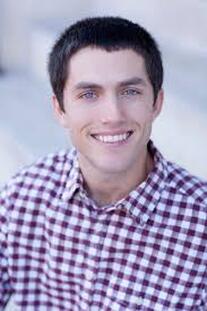
Growing up on a canal in Florida, my Dad would sometimes let me take our secondhand boat out to go fishing with friends. The engine was a bit unreliable though, and sometimes it wouldn’t start when we wanted to come back home, forcing us to pull the boat back ourselves, wading and swimming through the shallow water.In Engine Trouble you’ll hear the motor running smoothly at first, only for something to get stuck inside causing it to lose steam. It builds up some momentum only to putter out once again, leaving one final attempt to get the motor running.
Praised as “colorful” and “engaging” (The Philadelphia Inquirer), Scott Lee's music often takes inspiration from popular genres, exploring odd-meter grooves and interlocking hockets while featuring pointillistic orchestration and extended performance techniques. His music marries the traditional intricacy of classical form with the more body-centered and visceral language of contemporary popular music, creating a complex music of the present with broad appeal. The Berkshire Edge described the world premiere of his Slack Tide at Tanglewood Music Center as having “moments both of calm and maximum tension...we’ve never heard anything like it.”
Lee has worked with leading orchestras including the Baltimore Symphony Orchestra, the North Carolina Symphony, the Portland Symphony Orchestra, the Bozeman Symphony, Symphony in C, the Moravian Philharmonic, Raleigh Civic Symphony, the Occasional Symphony, the Peabody Symphony Orchestra, and members of the Winston-Salem Symphony, as well as chamber groups such as the JACK Quartet, yMusic, the Da Capo Chamber Players, Deviant Septet, chatterbird, ShoutHouse, Verdant Vibes, and pop artist Ben Folds. Recent commissioners include the Tanglewood Music Center, Aspen Music Festival, Atlanta Symphony Youth Orchestra, Florida State Music Teachers Association, loadbang, and the Raleigh Civic Symphony.
Notable performances include the world premiere of Lee’s Vicious Circles by Symphony in C and a reading and performance of Anadyr by the American Composers Orchestra, conducted by George Manahan, as part of the 27th Annual Underwood New Music Readings In New York City. Three pieces by Lee – Drip Study, Tourbillion, and Car Alarm Strut – were premiered at a Tanglewood Music Center concert led by Michael Gandolfi with coaching by composer Osvaldo Golijov. He is currently the Bozeman Symphony’s Composer-in-Residence, composing three orchestral works throughout the 2021-2024 seasons.
In November 2020, New Focus Recordings releases a recording of Lee’s 45-minute work Through the Mangrove Tunnels, performed by the JACK Quartet, pianist Steven Beck, and drummer Russell Lacy. Recorded at Duke University in 2018, the piece is inspired by the history and Lee's personal memories of Weedon Island, a nature preserve Lee grew up exploring in Florida.
Notable honors include a Charles Ives Scholarship from the American Academy of Arts and Letters, two ASCAP Morton Gould Young Composer Awards, winner of the Symphony In C Young Composer’s Competition, the Grand Prize in the 2015 PARMA Student Composer Competition, and the Gustav Klemm Award in Composition from the Peabody Institute. In 2020, Lee received fellowships from the Hermitage Artist Retreat and the Copland House’s CULTIVATE program.
Active as a music educator, Lee is currently Assistant Professor of Composition at the University of Florida School of Music, and has previously worked as a Lecturer at the University of North Carolina at Greensboro and an Instructor at Duke University. Lee earned a PhD in Composition at Duke University, and also holds degrees from the Peabody Institute and Vanderbilt University. • scottleemusic.net
Praised as “colorful” and “engaging” (The Philadelphia Inquirer), Scott Lee's music often takes inspiration from popular genres, exploring odd-meter grooves and interlocking hockets while featuring pointillistic orchestration and extended performance techniques. His music marries the traditional intricacy of classical form with the more body-centered and visceral language of contemporary popular music, creating a complex music of the present with broad appeal. The Berkshire Edge described the world premiere of his Slack Tide at Tanglewood Music Center as having “moments both of calm and maximum tension...we’ve never heard anything like it.”
Lee has worked with leading orchestras including the Baltimore Symphony Orchestra, the North Carolina Symphony, the Portland Symphony Orchestra, the Bozeman Symphony, Symphony in C, the Moravian Philharmonic, Raleigh Civic Symphony, the Occasional Symphony, the Peabody Symphony Orchestra, and members of the Winston-Salem Symphony, as well as chamber groups such as the JACK Quartet, yMusic, the Da Capo Chamber Players, Deviant Septet, chatterbird, ShoutHouse, Verdant Vibes, and pop artist Ben Folds. Recent commissioners include the Tanglewood Music Center, Aspen Music Festival, Atlanta Symphony Youth Orchestra, Florida State Music Teachers Association, loadbang, and the Raleigh Civic Symphony.
Notable performances include the world premiere of Lee’s Vicious Circles by Symphony in C and a reading and performance of Anadyr by the American Composers Orchestra, conducted by George Manahan, as part of the 27th Annual Underwood New Music Readings In New York City. Three pieces by Lee – Drip Study, Tourbillion, and Car Alarm Strut – were premiered at a Tanglewood Music Center concert led by Michael Gandolfi with coaching by composer Osvaldo Golijov. He is currently the Bozeman Symphony’s Composer-in-Residence, composing three orchestral works throughout the 2021-2024 seasons.
In November 2020, New Focus Recordings releases a recording of Lee’s 45-minute work Through the Mangrove Tunnels, performed by the JACK Quartet, pianist Steven Beck, and drummer Russell Lacy. Recorded at Duke University in 2018, the piece is inspired by the history and Lee's personal memories of Weedon Island, a nature preserve Lee grew up exploring in Florida.
Notable honors include a Charles Ives Scholarship from the American Academy of Arts and Letters, two ASCAP Morton Gould Young Composer Awards, winner of the Symphony In C Young Composer’s Competition, the Grand Prize in the 2015 PARMA Student Composer Competition, and the Gustav Klemm Award in Composition from the Peabody Institute. In 2020, Lee received fellowships from the Hermitage Artist Retreat and the Copland House’s CULTIVATE program.
Active as a music educator, Lee is currently Assistant Professor of Composition at the University of Florida School of Music, and has previously worked as a Lecturer at the University of North Carolina at Greensboro and an Instructor at Duke University. Lee earned a PhD in Composition at Duke University, and also holds degrees from the Peabody Institute and Vanderbilt University. • scottleemusic.net
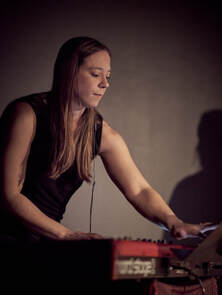
for Anna Atkins was inspired by the first woman photographer, who used sunlight to capture cyanotypes of ferns and other plants as part of her research. She published Part I of British Algae: Cyanotype Impressions in 1843 and wrote "The difficulty of making accurate drawings of objects so minute as many of the Algae and Confervae has induced me to avail myself of Sir John Herschel’s beautiful process of Cyanotype, to obtain impressions of the plants themselves, which I have much pleasure in offering to my botanical friends.” Light painting of all kinds continues to thrive today, whether with projectors and darkness, or a long exposure and sparklers. Written for Verdant Vibes with video by Alexander Dupuis and movement by Meg Sullivan. • kirstenvolness.com
Kirsten Volness's biography is available on the Artists page.
Kirsten Volness's biography is available on the Artists page.
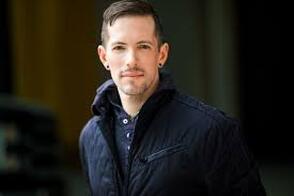
lean — It is about 8:30 on a windy October night. The moaning of the wind sounds like a banshee's cry. Inside the drawing room is a woman staring out the window, half searching for someone and half lost in brooding thought. Aged 56, of medium height, but with a proud, upright bearing that makes her seem taller than she is. There is strength, power and determination in this woman, and yet a fleeting echo of pain is etched in the sharp lines around her mouth. The drawing room is large and gloomy. Paneled walls, portraits of family founders, a large grand piano, an unlit fireplace.
The music of Brooklyn-based composer Matt Frey creates intimately sentimental sonic worlds inflected with churning rhythms, minimalist-like textures, and extended moments of restless tension.
Frey’s catalog of vocal works—comprising song cycles, music-theater works, and opera—include the recent release of his first studio album, One-Eleven Heavy, a chamber opera dedicated to the victims of the 1998 Swissair Flight 111 crash and recorded with ensemble Hotel Elefant featuring soprano Jenny Ribeiro and Grammy-award-winning tenor Karim Sulayman. Other vocal works include the musical Mary, written with playwright Melisa Tien and based on the life of controversial schoolteacher Mary Kay Letourneau; the chamber opera The Fox and the Pomegranate, a parable-like tale of love and infidelity which won the 2014 Pellicciotti Opera Prize; and the co-written oratorio Moby Dick: Extracts on Death and Other Curiosities, co-commissioned by Contemporaneous and MATA. Frey’s vocal music has been performed and workshopped across the U.S. and in Canada at festivals and programs including The American Opera Project’s Composers & the Voice program, Fort Worth Opera’s Frontiers, the Crane School of Music, Opera From Scratch, the New Dramatists Composer-Librettist and PlayTime Development Studios, the John Duffy Composers Institute, and the BMI Lehman Engel Musical Theater Workshop.
Frey’s instrumental music explores a more abstract approach to narrative, focusing on the concept of tension and release. Often using harmonic or melodic inspiration from popular or electronic music to infuse his compositions, his music has been commissioned and presented in collaboration with ensembles and companies such as the String Orchestra of Brooklyn, PUBLIQuartet (in collaboration with BODYART Dance Company), Synergy Percussion, the JACK String Quartet, Young Dancemakers Company, the West Point Woodwind Quintet, the NYU Symphony Orchestra, Cadillac Moon Ensemble, Echo Chamber, andPlay, and the Manhattan Wind Ensemble in venues including Roulette (Brooklyn), ISSUE Project Room (Brooklyn), 92Y TriBeCa (Manhattan), and the Bang on a Can Summer Festival at MASS MoCA.
With musical interests extending to performing (clarinet and piano), conducting, and arts management, Frey has been an employee of Carnegie Hall’s Weill Music Institute (where he helped bolster a national music curriculum for elementary school recorder students) and has been known as an event curator and producer with West 4th New Music Collective (W4). He is a graduate of the Masters program in Music Composition at New York University and holds an undergraduate degree in Music Composition from Brooklyn College, where he studied with composers including Jason Eckardt, Douglas Geers, Joan La Barbara, Tania León, Robert Maggio, and Julia Wolfe. • musicbymattfrey.com
The music of Brooklyn-based composer Matt Frey creates intimately sentimental sonic worlds inflected with churning rhythms, minimalist-like textures, and extended moments of restless tension.
Frey’s catalog of vocal works—comprising song cycles, music-theater works, and opera—include the recent release of his first studio album, One-Eleven Heavy, a chamber opera dedicated to the victims of the 1998 Swissair Flight 111 crash and recorded with ensemble Hotel Elefant featuring soprano Jenny Ribeiro and Grammy-award-winning tenor Karim Sulayman. Other vocal works include the musical Mary, written with playwright Melisa Tien and based on the life of controversial schoolteacher Mary Kay Letourneau; the chamber opera The Fox and the Pomegranate, a parable-like tale of love and infidelity which won the 2014 Pellicciotti Opera Prize; and the co-written oratorio Moby Dick: Extracts on Death and Other Curiosities, co-commissioned by Contemporaneous and MATA. Frey’s vocal music has been performed and workshopped across the U.S. and in Canada at festivals and programs including The American Opera Project’s Composers & the Voice program, Fort Worth Opera’s Frontiers, the Crane School of Music, Opera From Scratch, the New Dramatists Composer-Librettist and PlayTime Development Studios, the John Duffy Composers Institute, and the BMI Lehman Engel Musical Theater Workshop.
Frey’s instrumental music explores a more abstract approach to narrative, focusing on the concept of tension and release. Often using harmonic or melodic inspiration from popular or electronic music to infuse his compositions, his music has been commissioned and presented in collaboration with ensembles and companies such as the String Orchestra of Brooklyn, PUBLIQuartet (in collaboration with BODYART Dance Company), Synergy Percussion, the JACK String Quartet, Young Dancemakers Company, the West Point Woodwind Quintet, the NYU Symphony Orchestra, Cadillac Moon Ensemble, Echo Chamber, andPlay, and the Manhattan Wind Ensemble in venues including Roulette (Brooklyn), ISSUE Project Room (Brooklyn), 92Y TriBeCa (Manhattan), and the Bang on a Can Summer Festival at MASS MoCA.
With musical interests extending to performing (clarinet and piano), conducting, and arts management, Frey has been an employee of Carnegie Hall’s Weill Music Institute (where he helped bolster a national music curriculum for elementary school recorder students) and has been known as an event curator and producer with West 4th New Music Collective (W4). He is a graduate of the Masters program in Music Composition at New York University and holds an undergraduate degree in Music Composition from Brooklyn College, where he studied with composers including Jason Eckardt, Douglas Geers, Joan La Barbara, Tania León, Robert Maggio, and Julia Wolfe. • musicbymattfrey.com
VERDANT VIBES BENEFIT CONCERT
February 12, 2022 at 7:30 pm EST
The Music Mansion, 88 Meeting Street, Providence, RI
February 12, 2022 at 7:30 pm EST
The Music Mansion, 88 Meeting Street, Providence, RI
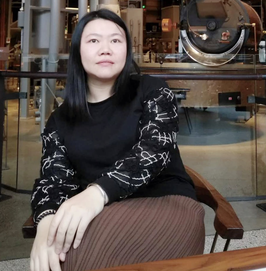
Tres Aurorae by LI Tao
performed by Chuck Furlong, clarinet
This piece draws inspiration from the sculpture Bust by Nevine Mahmoud. The surrounding auroras created by light diffused through the many complex surfaces of Bust immediately drew my attention and lead to the title of this piece Tres Aurorae. The human subject of the work and the abstract light effects create a strong contrast of real and surreal. These abstract auroras, represented by electronic textures “surrounding” the acoustic clarinet, symbolize the feminine power and its inclusivity and strength. In this way, Tres Aurorae adopts this concept of contrast between live acoustic sounds from solo clarinet and processed electronic sounds also derived from clarinet.
Tao Li 李陶, Ph.D., is a composer and performer from China. While Chinese traditional culture profoundly influences her, years of living in the U.S. have formed her distinct multicultural musical language. The philosophy, literature, and spirituality of the ancient East play a formative role in the aesthetic of Dr. Li’s work. Her music consists of vivid soundscapes, colorful timbres, and interdisciplinary elements that often lead her audiences on a multi-dimensional journey full of imagination. As an Asian female musician, Dr. Li is devoted to promoting gender equity and cultural diversity through her music as well as through collaboration with other artists.
Dr. Li’s music has been performed at concerts and music festivals throughout the world including China, Japan, Korea, Australia, Ireland, Ukraine, and the U.S.A. Her primary interests include acoustic and electroacoustic composition, performance practices, and analysis of compositional techniques, aesthetics, and intercultural dialogues. Currently, she is working on her second Doctoral degree in Intermedia Music Technology Data-Driven Instruments at University of Oregon. For more information, please go to taolimusic.com.
performed by Chuck Furlong, clarinet
This piece draws inspiration from the sculpture Bust by Nevine Mahmoud. The surrounding auroras created by light diffused through the many complex surfaces of Bust immediately drew my attention and lead to the title of this piece Tres Aurorae. The human subject of the work and the abstract light effects create a strong contrast of real and surreal. These abstract auroras, represented by electronic textures “surrounding” the acoustic clarinet, symbolize the feminine power and its inclusivity and strength. In this way, Tres Aurorae adopts this concept of contrast between live acoustic sounds from solo clarinet and processed electronic sounds also derived from clarinet.
Tao Li 李陶, Ph.D., is a composer and performer from China. While Chinese traditional culture profoundly influences her, years of living in the U.S. have formed her distinct multicultural musical language. The philosophy, literature, and spirituality of the ancient East play a formative role in the aesthetic of Dr. Li’s work. Her music consists of vivid soundscapes, colorful timbres, and interdisciplinary elements that often lead her audiences on a multi-dimensional journey full of imagination. As an Asian female musician, Dr. Li is devoted to promoting gender equity and cultural diversity through her music as well as through collaboration with other artists.
Dr. Li’s music has been performed at concerts and music festivals throughout the world including China, Japan, Korea, Australia, Ireland, Ukraine, and the U.S.A. Her primary interests include acoustic and electroacoustic composition, performance practices, and analysis of compositional techniques, aesthetics, and intercultural dialogues. Currently, she is working on her second Doctoral degree in Intermedia Music Technology Data-Driven Instruments at University of Oregon. For more information, please go to taolimusic.com.
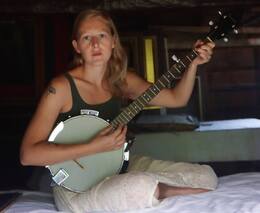
Kate Mick's music manifests light and dark, mostly dark. Her lyrically-driven vocals and strumming banjo create songs that are time-worn yet timeless. Listen to her 2019 album, "Sugar in Your Teeth" on BandCamp or Spotify. She has been compared to Cat Power, Hurray For the Riff Raff, Sharon Van Etten, and Hedy West. She enjoys playing her original songs as well as cover songs by Wilco, David Bowie, Tom Petty, Daniel Johnston, Karen Dalton, The Breeders, and John Prine, amongst others. Kate Mick is also a member of the Providence-based band, The SwampBirds! Find more about Kate Mick and upcoming shows at katemick.com.
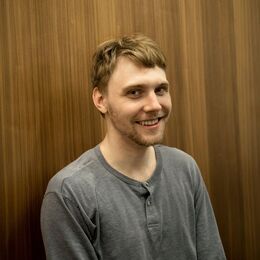
it comes in waves by Samn Johnson
performed by Piero Guimaraes, vibraphone
it comes in waves is a piece for vibraphone and electronics, with the electronics built entirely from samples of the vibraphone. Some of these samples are mutated beyond recognition, sounding more like drums or synthesizers, while others sound more natural. It was commissioned by Gloria Yehilevsky, who worked closely with me recording samples and discussing the piece; both in terms of broader formal considerations, and workshopping specific aspects of the vibraphone writing. Formally, the piece is a series of “waves” comprised of repetitions of a 5-chord progression, with shifting harmonic rhythms controlled by strict predetermined cycles. These cycles are designed to push each wave forward, with rhythm incrementally accelerating as each wave crests. This form is designed to reflect stages of grief and healing, or other forms of self-discovery that can often build up, dissipate, and then return with enhanced clarity before breaking into some kind of resolution.
Samn Johnson is a composer and producer based in Kalamazoo, Michigan. Ever curious for new sound combinations, Samn’s music takes on a variety of forms including orchestral, choral, electronic, and solo piano music. Renaissance style canons, swung down-tempo grooves, and idiosyncratic instrumental flourishes are some of the many colors in his imaginative pallet. Often slow, atmospheric, and designed to explore a sense of wonder, Samn’s music is tinged with a fascination with memory and the passage of time. His background includes composition degrees from the University of Michigan and New York University, where he studied with Julia Wolfe, and Robert Honstein. • samnjohnsonmusic.com
performed by Piero Guimaraes, vibraphone
it comes in waves is a piece for vibraphone and electronics, with the electronics built entirely from samples of the vibraphone. Some of these samples are mutated beyond recognition, sounding more like drums or synthesizers, while others sound more natural. It was commissioned by Gloria Yehilevsky, who worked closely with me recording samples and discussing the piece; both in terms of broader formal considerations, and workshopping specific aspects of the vibraphone writing. Formally, the piece is a series of “waves” comprised of repetitions of a 5-chord progression, with shifting harmonic rhythms controlled by strict predetermined cycles. These cycles are designed to push each wave forward, with rhythm incrementally accelerating as each wave crests. This form is designed to reflect stages of grief and healing, or other forms of self-discovery that can often build up, dissipate, and then return with enhanced clarity before breaking into some kind of resolution.
Samn Johnson is a composer and producer based in Kalamazoo, Michigan. Ever curious for new sound combinations, Samn’s music takes on a variety of forms including orchestral, choral, electronic, and solo piano music. Renaissance style canons, swung down-tempo grooves, and idiosyncratic instrumental flourishes are some of the many colors in his imaginative pallet. Often slow, atmospheric, and designed to explore a sense of wonder, Samn’s music is tinged with a fascination with memory and the passage of time. His background includes composition degrees from the University of Michigan and New York University, where he studied with Julia Wolfe, and Robert Honstein. • samnjohnsonmusic.com

Pablo Escalante (Pol Escalante) is from Medellín, Colombia and currently resides in Providence, RI. He is a graphic designer/photographer by profession, but his real passion is music. Pablo is primarily a singer-songwriter/sitarist/producer/sound engineer, but also plays many instruments from all over the world. He is a founding member of Humming Owl, a duo with his wife - violinist and singer, Roseminna Watson. Please email : polescalante [at] gmail [dot] com for information about studio recording sessions.
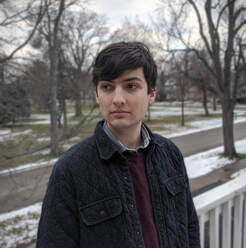
Alma by Daniel Whitworth
performed by Roseminna Watson, violin
Alma Rosé (1906-1944) was an Austrian violinist of Jewish descent and the niece of composer Gustav Mahler. An extraordinarily talented performer, Alma had a promising musical career until she was deported to Auschwitz in 1943 where she died a year later. Alma musically depicts this tragic story using an electronic accompaniment primarily comprised of Alma Rosé’s only existing recording: a performance of Bach’s Concerto for Two Violins. The recording is twisted, expanded, and often transformed beyond recognition. This piece intends to both celebrate the achievements of a life cut short and commemorate the artistry and soul that was unjustly exploited.
Daniel Whitworth (b.1996) is a Seattle-based composer and saxophonist dedicated to expanding the relevance and accessibility of contemporary music. Frequently collaborating with dancers, visual artists, and actors, he aims to connect and engage with audiences in unique ways. One of his most recent projects, a recital entitled “Snapshots of America,” explored themes of politics and social justice in contemporary music and reflected Daniel’s passion for music with sociopolitical relevance.
In the summer of 2019, Daniel served as the composer-in-residence at the Lake George Music Festival after his piece Ripples in Infinity won the Lake George Composition Competition. Other recent awards include winning the 2020/2022 Jon Vickers Film Scoring Award and earning first prize in the 2018 Frost International Composition Contest. Daniel earned his master’s degree from the Jacobs School of Music at Indiana University with a major in both Composition and Scoring for Film and Multimedia. • DanielWhitworthMusic.com
performed by Roseminna Watson, violin
Alma Rosé (1906-1944) was an Austrian violinist of Jewish descent and the niece of composer Gustav Mahler. An extraordinarily talented performer, Alma had a promising musical career until she was deported to Auschwitz in 1943 where she died a year later. Alma musically depicts this tragic story using an electronic accompaniment primarily comprised of Alma Rosé’s only existing recording: a performance of Bach’s Concerto for Two Violins. The recording is twisted, expanded, and often transformed beyond recognition. This piece intends to both celebrate the achievements of a life cut short and commemorate the artistry and soul that was unjustly exploited.
Daniel Whitworth (b.1996) is a Seattle-based composer and saxophonist dedicated to expanding the relevance and accessibility of contemporary music. Frequently collaborating with dancers, visual artists, and actors, he aims to connect and engage with audiences in unique ways. One of his most recent projects, a recital entitled “Snapshots of America,” explored themes of politics and social justice in contemporary music and reflected Daniel’s passion for music with sociopolitical relevance.
In the summer of 2019, Daniel served as the composer-in-residence at the Lake George Music Festival after his piece Ripples in Infinity won the Lake George Composition Competition. Other recent awards include winning the 2020/2022 Jon Vickers Film Scoring Award and earning first prize in the 2018 Frost International Composition Contest. Daniel earned his master’s degree from the Jacobs School of Music at Indiana University with a major in both Composition and Scoring for Film and Multimedia. • DanielWhitworthMusic.com
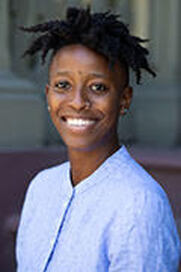
Ashley Lauren Frith is a violist, song writer, facilitator and educator. She is currently the Director of Racial Equity and Belonging at Community MusicWorks, and core faculty of the LA Philharmonics YOLA National Institute. Focusing on care partnerships, her anti-racism work particularly addresses how racism affects our individual and collective interiority; with an emphasis on how we can enter this work through embodied trauma practice. Ashley’s work is held and supported by a contemplative end of life practice and yogic training, and is driven by deep healing and total liberation for all beings.
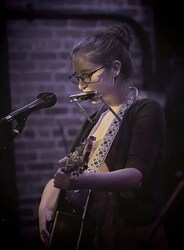
Hailing from Rhode Island, Morgan Johnston is an indie folk singer-songwriter stomping, strumming, speaking, and singing her way to empowering both herself and her listeners. Her lyrics are inspired by the natural landscape of places as much as by the emotional landscape of human experiences. While most often found singing with her guitar, Morgan is known to experiment with different stringed instruments and tunings as well as vocal arrangements on loop pedal. As a music therapist, she is constantly reminded of the healing power of the music she aims to share.
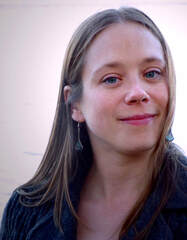
The Pathless Woods by Kirsten Volness
performed by EmmaLee Holmes-Hicks, violin/kick drum
and Piero Guimaraes, vibraphone
I. By allowing the will to float, we might see and hear more clearly.
II. Trees bend in submission to storms.
III. The good times of today are the sad thoughts of tomorrow.
IV. A place where no one knows...
The title is taken from a quote on a tea bag—"There is a pleasure in the pathless woods”—an excerpt from Lord Byron’s poem, Childe Harold’s Pilgrimage, in which a disillusioned world wanderer marvels at the ways in which Nature’s sheer power overwhelms Humankind. Written in December 2020, amidst peak burnout and COVID spike, my piece is a stream-of-consciousness reflection on this critical moment when we have awakened to an opportunity to reimagine the world together. Our priorities have come into focus, new paths forward have been illuminated, a hopeful spirit rises, and as much as action is overdue and necessary, we must also rest and gather strength to navigate difficult times ahead. Many musical choices were inspired by my dear friends for whom it was written, EmmaLee Holmes-Hicks and Piero Guimaraes, who also graciously provided percussion samples.
Kirsten Volness is an electro/acoustic composer and pianist whose music is inspired by nature, myth, science, spirituality, and environmental and sociopolitical issues. She has received commissions from BMI Foundation, ASCAP/SEAMUS, World Future Council Foundation, and Third Practice Electroacoustic Festival, writing new works for Hotel Elefant, NOW Ensemble, Transient Canvas, Metropolis Ensemble, Ann Arbor Symphony, and Experiential Orchestra. She performs with NYC-based Hotel Elefant and Providence-based Verdant Vibes, a new music ensemble and concert series she co-founded in 2015. Recipient of the MacColl Johnson and RISCA Fellowships in Music Composition, Kirsten was 2017 composer-in-residence at the Music Mansion creating the First Fridays concert series, and served on the board of directors as Secretary. She collaborates with Meridian Project on multimedia performances exploring astrophysics, writes and performs operas with homeless advocacy group Tenderloin Opera Company, and is an affiliate artist of Sleeping Weazel theatre company. Her first opera Letters That You Will Not Get: Women’s Voices From The Great War is in development with The American Opera Project with support from a 2020 OPERA America Discovery Grant. She taught privately and at the University of Rhode Island before joining the faculty at Reed College as Visiting Assistant Professor of Music • kirstenvolness.com
performed by EmmaLee Holmes-Hicks, violin/kick drum
and Piero Guimaraes, vibraphone
I. By allowing the will to float, we might see and hear more clearly.
II. Trees bend in submission to storms.
III. The good times of today are the sad thoughts of tomorrow.
IV. A place where no one knows...
The title is taken from a quote on a tea bag—"There is a pleasure in the pathless woods”—an excerpt from Lord Byron’s poem, Childe Harold’s Pilgrimage, in which a disillusioned world wanderer marvels at the ways in which Nature’s sheer power overwhelms Humankind. Written in December 2020, amidst peak burnout and COVID spike, my piece is a stream-of-consciousness reflection on this critical moment when we have awakened to an opportunity to reimagine the world together. Our priorities have come into focus, new paths forward have been illuminated, a hopeful spirit rises, and as much as action is overdue and necessary, we must also rest and gather strength to navigate difficult times ahead. Many musical choices were inspired by my dear friends for whom it was written, EmmaLee Holmes-Hicks and Piero Guimaraes, who also graciously provided percussion samples.
Kirsten Volness is an electro/acoustic composer and pianist whose music is inspired by nature, myth, science, spirituality, and environmental and sociopolitical issues. She has received commissions from BMI Foundation, ASCAP/SEAMUS, World Future Council Foundation, and Third Practice Electroacoustic Festival, writing new works for Hotel Elefant, NOW Ensemble, Transient Canvas, Metropolis Ensemble, Ann Arbor Symphony, and Experiential Orchestra. She performs with NYC-based Hotel Elefant and Providence-based Verdant Vibes, a new music ensemble and concert series she co-founded in 2015. Recipient of the MacColl Johnson and RISCA Fellowships in Music Composition, Kirsten was 2017 composer-in-residence at the Music Mansion creating the First Fridays concert series, and served on the board of directors as Secretary. She collaborates with Meridian Project on multimedia performances exploring astrophysics, writes and performs operas with homeless advocacy group Tenderloin Opera Company, and is an affiliate artist of Sleeping Weazel theatre company. Her first opera Letters That You Will Not Get: Women’s Voices From The Great War is in development with The American Opera Project with support from a 2020 OPERA America Discovery Grant. She taught privately and at the University of Rhode Island before joining the faculty at Reed College as Visiting Assistant Professor of Music • kirstenvolness.com
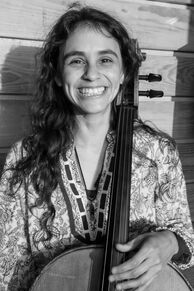
Isabel Castellvi is a cellist, multi-instrumentalist, vocalist, songwriter, and composer. As a versatile musician you can find her collaborating with musicians from around the globe. These collaborations span many genres, including world music inspired projects, indie rock bands, her own solo projects, free improvisation, performance art, western classical music, and music for dance and film. Isabel is grateful to share music all over the world through performances, recordings and teaching. Her musical travels have taken her throughout North America, Europe, Asia, Central and South America and the Middle East. These experiences continue to be a great source of inspiration, deepening her understanding of music’s powerful ability to connect people and communities. She received a Bachelor’s in music performance at DePaul University and a Master's in the Contemporary Performance Program at Manhattan School of Music. Isabel has studied North Indian Classical Music with renowned vocalist Rajyasree Ghosh in Kolkata, India and Falu Shah in New York City. She currently lives in Providence, RI. • isabelcastellvi.com
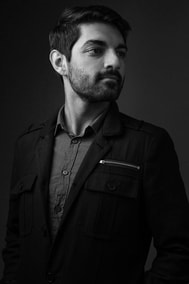
Rustling by Anuj Bhutani
performed by EmmaLee Holmes-Hicks, violin
Zan Berry, cello
and Piero Guimaraes, vibraphone
I've always loved the seemingly innocuous sound of rustling leaves. It's one of the only ways we are able to physically perceive the presence of the wind, aside from feeling the breeze on our skin. For me, there is a sort of magic there. When I find myself paying attention to that sound, it often evokes memories from many different times in my life. Just imagine how many times, and in how many difference places you’ve heard that sound…walking to school, on a hike, on vacation, before a terrible storm, some time when you felt lonely…The omnipresence of the sound of rustling leaves has the ability to become associated with as many moments in your life as you let it and, in this way, has the potential to become powerfully evocative. For me, this is the real magic of the wind, and the power of the rustling leaves.
Anuj Bhutani is quickly emerging as a versatile composer for the concert stage, dance, and film. In 2020, he won 1st prize in Cerddorion Vocal Ensemble’s Composer Competition, and held fellowships at “1:2:1”, Arts, Letters & Numbers, and The Walden School. His work was also selected for the Norfolk Chamber Music Festival, SCI National Conference and Student Mixtape, New York City Electroacoustic Music Festival, and Electric LaTex Festival. In 2019, he was commissioned by Inversion Ensemble as part of Carlos Corderos’ inaugural Happy Composer Commissioning Project. He is pursuing bachelor’s degrees in composition and music theory at the University of North Texas. His primary teachers have included Andrew May, Sungji Hong, Drew Schnurr, and UNT Composer-in-Residence Bruce Broughton. He also holds a BA in Psychology from UT Austin, where he graduated with High Honors and a Presidential scholarship in 2015.
performed by EmmaLee Holmes-Hicks, violin
Zan Berry, cello
and Piero Guimaraes, vibraphone
I've always loved the seemingly innocuous sound of rustling leaves. It's one of the only ways we are able to physically perceive the presence of the wind, aside from feeling the breeze on our skin. For me, there is a sort of magic there. When I find myself paying attention to that sound, it often evokes memories from many different times in my life. Just imagine how many times, and in how many difference places you’ve heard that sound…walking to school, on a hike, on vacation, before a terrible storm, some time when you felt lonely…The omnipresence of the sound of rustling leaves has the ability to become associated with as many moments in your life as you let it and, in this way, has the potential to become powerfully evocative. For me, this is the real magic of the wind, and the power of the rustling leaves.
Anuj Bhutani is quickly emerging as a versatile composer for the concert stage, dance, and film. In 2020, he won 1st prize in Cerddorion Vocal Ensemble’s Composer Competition, and held fellowships at “1:2:1”, Arts, Letters & Numbers, and The Walden School. His work was also selected for the Norfolk Chamber Music Festival, SCI National Conference and Student Mixtape, New York City Electroacoustic Music Festival, and Electric LaTex Festival. In 2019, he was commissioned by Inversion Ensemble as part of Carlos Corderos’ inaugural Happy Composer Commissioning Project. He is pursuing bachelor’s degrees in composition and music theory at the University of North Texas. His primary teachers have included Andrew May, Sungji Hong, Drew Schnurr, and UNT Composer-in-Residence Bruce Broughton. He also holds a BA in Psychology from UT Austin, where he graduated with High Honors and a Presidential scholarship in 2015.
VERDANT VIBES SUMMER FESTIVAL
June 27, 2021 at 7pm EDT
June 27, 2021 at 7pm EDT
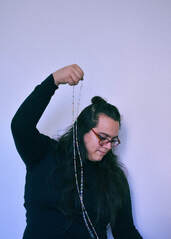
INBHIR [for cello solo] is an old gaelic word for a 'confluence of waters' or 'the mouth of a river'
Tamalh (land) [for string quartet]: nem-talamh-muir : the sky, the earth, the sea — old Irish
inti figgis-vizueta (b. 1993) writes magically real musics through the lens of personal identities, braiding a childhood of overlapping immigrant communities and Black-founded Freedom schools—in Chocolate City (DC)—with Andean heritage and a deep connection to the land. Reviewers say her music constantly toes the line between "all turbulence" and "quietly focused" (National Sawdust Log). inti has been commissioned by JACK Quartet, Crash Ensemble, National Sawdust, Music from Copland House, the Forward Music Project, and cellist Andrew Yee, among many others. She lives in New York and, like a plant, needs a lot of sunlight.
Tamalh (land) [for string quartet]: nem-talamh-muir : the sky, the earth, the sea — old Irish
inti figgis-vizueta (b. 1993) writes magically real musics through the lens of personal identities, braiding a childhood of overlapping immigrant communities and Black-founded Freedom schools—in Chocolate City (DC)—with Andean heritage and a deep connection to the land. Reviewers say her music constantly toes the line between "all turbulence" and "quietly focused" (National Sawdust Log). inti has been commissioned by JACK Quartet, Crash Ensemble, National Sawdust, Music from Copland House, the Forward Music Project, and cellist Andrew Yee, among many others. She lives in New York and, like a plant, needs a lot of sunlight.
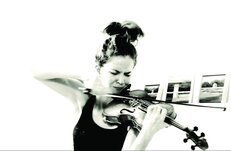
Lullabies for Icarus [for voice/violin]
From within the space and time of the changed world, I wanted to make a performance from the banks of my solitude reaching across toward the banks of yours.
Lullabies for Icarus is in seven miniature movements that are imbued with the story and messages from the Greek myth :
Imprisoned in a tower on the island of Crete and desperate to regain physical freedom, Daedelus (a great inventor) devises an escape plan for himself and his son, Icarus. With wings fashioned out of wax from candles and feathers from birds that circle the tower, the two plan to take flight across open waters toward liberation. "Remember," warns Daedalus to his son as they are about to embark on their journey, "you must keep to the middle point between ocean and sky. If you fly too close to the sun, your wings will melt, and you will fall. If you fly too close to the water, the feathers will become laden with moisture and you will also fall." However, as Icarus feels his mortal body soaring through the air, he is seized by a sense of divine power. Overcome by the ecstasy of flight, he speeds toward the bright allure of the sun and plummets to his quick demise as his father watches from a course of equilibrium. Icarus perishes needlessly because he is unable to find the balance between hubris and complacency, ambition and acceptance. He listens to ego over wisdom, believing himself immune to the elemental laws that govern the earth and that ultimately dictate the fate of all mortals.
Having completed this piece in December, 2019, the timing of it coming through feels like an eerie foreshadowing — some kind of unwitting hint at what has unfolded since.
From me in my own living room, for each one of you in yours, here is Lullabies for Icarus gently accompanied by intermittent clunks from ancient radiators, some faint twittering of birds outside the window, and an occasional thud as my cat, Whisker Moon, jumps down from a piece of furniture. I hope you find meaning, solace and beauty in this offering.
Roseminna Watson: I come from a large family of visual, literary, and performing artists. At the age of three I began work on the violin and one year later finally acknowledged my need for some help with the endeavor. My mother, Clyde Watson, taught me for the following seven years until I went on to study at the New England Conservatory’s Preparatory School with Melba Sandberg and Magdalena Richter. Alongside my musical endeavors, however, I have always pursued visual art and the written word, incorporating these mediums into my expressive practices. I was blessed with the choice of whether or not to attend “regular” school and have always taken charge of my own education. I chose to Home School until the third grade at which point I got curious and asked to go to public elementary school, only to announce that I was going back home a year later, then back, then to boarding school in sophomore year, then back to public, on to college and then two grad schools and a yoga teacher training.
Forever a seeker, I am never satisfied and am always curious about myself, other people, life, and the world.
From within the space and time of the changed world, I wanted to make a performance from the banks of my solitude reaching across toward the banks of yours.
Lullabies for Icarus is in seven miniature movements that are imbued with the story and messages from the Greek myth :
Imprisoned in a tower on the island of Crete and desperate to regain physical freedom, Daedelus (a great inventor) devises an escape plan for himself and his son, Icarus. With wings fashioned out of wax from candles and feathers from birds that circle the tower, the two plan to take flight across open waters toward liberation. "Remember," warns Daedalus to his son as they are about to embark on their journey, "you must keep to the middle point between ocean and sky. If you fly too close to the sun, your wings will melt, and you will fall. If you fly too close to the water, the feathers will become laden with moisture and you will also fall." However, as Icarus feels his mortal body soaring through the air, he is seized by a sense of divine power. Overcome by the ecstasy of flight, he speeds toward the bright allure of the sun and plummets to his quick demise as his father watches from a course of equilibrium. Icarus perishes needlessly because he is unable to find the balance between hubris and complacency, ambition and acceptance. He listens to ego over wisdom, believing himself immune to the elemental laws that govern the earth and that ultimately dictate the fate of all mortals.
Having completed this piece in December, 2019, the timing of it coming through feels like an eerie foreshadowing — some kind of unwitting hint at what has unfolded since.
From me in my own living room, for each one of you in yours, here is Lullabies for Icarus gently accompanied by intermittent clunks from ancient radiators, some faint twittering of birds outside the window, and an occasional thud as my cat, Whisker Moon, jumps down from a piece of furniture. I hope you find meaning, solace and beauty in this offering.
Roseminna Watson: I come from a large family of visual, literary, and performing artists. At the age of three I began work on the violin and one year later finally acknowledged my need for some help with the endeavor. My mother, Clyde Watson, taught me for the following seven years until I went on to study at the New England Conservatory’s Preparatory School with Melba Sandberg and Magdalena Richter. Alongside my musical endeavors, however, I have always pursued visual art and the written word, incorporating these mediums into my expressive practices. I was blessed with the choice of whether or not to attend “regular” school and have always taken charge of my own education. I chose to Home School until the third grade at which point I got curious and asked to go to public elementary school, only to announce that I was going back home a year later, then back, then to boarding school in sophomore year, then back to public, on to college and then two grad schools and a yoga teacher training.
Forever a seeker, I am never satisfied and am always curious about myself, other people, life, and the world.

Dissolve, O my Heart has its roots in a late-night conversation over Chinese food and cupcakes with violinist Jennifer Koh. She told me about her Bach & Beyond project, a program that combines Bach's Sonatas and Partitas with newly commissioned works, and asked if I would write a piece that referenced Bach's Partita in D Minor. This request was, to put it mildly, utterly terrifying; the last movement of the Partita, the Chaconne, is undoubtably the most famous piece of solo violin literature in the world. It overwhelmed Brahms, has been subject to hundreds of transcriptions and arrangements over the past two centuries, and is dizzying in its contrapuntal complexity. But something about Jennifer's enthusiasm was infectious, and I agreed to the project before I realized what I was getting myself into. Jennifer seemed to approach Bach through the lens of contemporary music, and I realized that this was what this new piece should do as well.
Dissolve, O my Heart begins with the first chord of Bach's Chaconne, a now-iconic d minor chord, and spins out from there into an off-kilter series of chords that doubles back on itself, collapses and ultimately dissolves in a torrent of fast passages. The only direct quote from the Partita is that first chord, which anchors the entire piece even as it threatens to spiral out of control. The title comes from an aria in the St. John's Passion, but has many potential interpretations.
Dissolve, O my Heart was commissioned by the Los Angeles Philharmonic and was premiered in 2011 as part of their Green Umbrella Series in Disney Hall.
Recently deemed “one of the more consistently inventive, surprising composers now working in New York” (NY Times) and “Brooklyn’s post-millennial Mozart” (Time Out NY), Missy Mazzoli has had her music performed by the Kronos Quartet, LA Opera, eighth blackbird, the BBC Symphony, Scottish Opera and many others. In 2018 she became one of the first two women, along with Jeanine Tesori, to receive a main stage commission from the Metropolitan Opera, and was nominated for a Grammy award. She is Composer-in-Residence at the Chicago Symphony Orchestra, and from 2012-2015 was Composer-in-Residence with Opera Philadelphia. Upcoming commissions include works for Opera Philadelphia, the National Ballet of Canada, Chicago Lyric Opera and Norwegian National Opera. Her works are published by G. Schirmer.
Dissolve, O my Heart begins with the first chord of Bach's Chaconne, a now-iconic d minor chord, and spins out from there into an off-kilter series of chords that doubles back on itself, collapses and ultimately dissolves in a torrent of fast passages. The only direct quote from the Partita is that first chord, which anchors the entire piece even as it threatens to spiral out of control. The title comes from an aria in the St. John's Passion, but has many potential interpretations.
Dissolve, O my Heart was commissioned by the Los Angeles Philharmonic and was premiered in 2011 as part of their Green Umbrella Series in Disney Hall.
Recently deemed “one of the more consistently inventive, surprising composers now working in New York” (NY Times) and “Brooklyn’s post-millennial Mozart” (Time Out NY), Missy Mazzoli has had her music performed by the Kronos Quartet, LA Opera, eighth blackbird, the BBC Symphony, Scottish Opera and many others. In 2018 she became one of the first two women, along with Jeanine Tesori, to receive a main stage commission from the Metropolitan Opera, and was nominated for a Grammy award. She is Composer-in-Residence at the Chicago Symphony Orchestra, and from 2012-2015 was Composer-in-Residence with Opera Philadelphia. Upcoming commissions include works for Opera Philadelphia, the National Ballet of Canada, Chicago Lyric Opera and Norwegian National Opera. Her works are published by G. Schirmer.
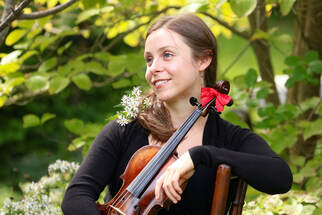
A lullaby is an intimate treasure: delicate memories from the fringes of sleep, singing to a loved one or the voice of a loved one singing to you. As cultural communities, we share these simples melodies and as human beings, we share this ritual of singing each other to sleep. There is an element of vulnerability etched into lullabies, letting loved ones go into a dreamworld beyond our reach. A lullaby is a talisman of love, a way of saying, "I am with you, wherever you may go."
Suantraí, means "lullaby" in the Irish language.
(world premiere)
Boston-based artist, Christine Delphine Hedden, draws upon many wells: traditional, classical and contemporary. She is a composer, a fiddle player and violist, a percussive dancer, and a storyteller in word and song. Hailing from the highlands of western Connecticut, Christine grew up playing New England folk music and fell in love with Irish traditional music along the way. Now, her work seeks to bring her diverse musical communities to a place of appreciation and awe for one another. Her primary teachers include Evan Chambers and Gabriela Lena Frank (composition), George Keith (fiddle) and Kieran Jordan (dance).
Suantraí, means "lullaby" in the Irish language.
(world premiere)
Boston-based artist, Christine Delphine Hedden, draws upon many wells: traditional, classical and contemporary. She is a composer, a fiddle player and violist, a percussive dancer, and a storyteller in word and song. Hailing from the highlands of western Connecticut, Christine grew up playing New England folk music and fell in love with Irish traditional music along the way. Now, her work seeks to bring her diverse musical communities to a place of appreciation and awe for one another. Her primary teachers include Evan Chambers and Gabriela Lena Frank (composition), George Keith (fiddle) and Kieran Jordan (dance).
Learn more about our Guest Artists and Ensemble members.
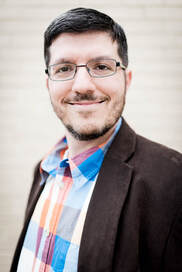
Yuri Gagarin uniquely represents a nexus of space exploration and music. Gagarin was the first person to orbit the Earth and broadcast a live musical performance from space. While in orbit, Gagarin sang and broadcast the Shostakovich song "The Homeland Hears" (Rodina Slushit). In my piece, I roughly paraphrase part of the Shostakovich melody. The "clicks" in the electronic part are actual samples I recorded of switches and dials from an old Moog synthesizer. The rest of the electronic part uses sine waves, square waves, and filtered noise in homage to the electronic music technology of the time period.
Composer Daniel Eichenbaum’s (b. 1977) music has been performed and published throughout the United States, Europe, and Asia. Recent works include Green Bank, a piano and fixed media work about the Green Bank radio observatory commissioned by the West Virginia Music Teacher’s Asssociation, Pacific (for the PEN Trio, published by TrevCo Music) and If your boy leads (for mezzo soprano Jenifer Weber), based upon poems by Fairmont State Professor of English Elizabeth Savage. His Sinfonietta, for wind ensemble augmented with string quartet, and his Trumpet Concertino were semi-finalists for the American Prize in wind ensemble composition. His music is published by Southern Music, Reynard Music, and Warwick Brass, as well as recorded on the Capstone Records label.
Composer Daniel Eichenbaum’s (b. 1977) music has been performed and published throughout the United States, Europe, and Asia. Recent works include Green Bank, a piano and fixed media work about the Green Bank radio observatory commissioned by the West Virginia Music Teacher’s Asssociation, Pacific (for the PEN Trio, published by TrevCo Music) and If your boy leads (for mezzo soprano Jenifer Weber), based upon poems by Fairmont State Professor of English Elizabeth Savage. His Sinfonietta, for wind ensemble augmented with string quartet, and his Trumpet Concertino were semi-finalists for the American Prize in wind ensemble composition. His music is published by Southern Music, Reynard Music, and Warwick Brass, as well as recorded on the Capstone Records label.
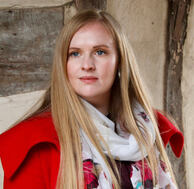
Spaces frozen explores small moments of numbness, like breaths, fleeting and fluid in their nature, a reflection of our times. The composition of this piece started while on a walk at 9.30am, firstly with just ide. The passage of time is fragile, fleeting and concentrates the mind.
Angela Elizabeth Slater is a UK-based composer. In her AHRC-funded PhD at University of Nottingham, Angela developed an interest in musically mapping different aspects of the natural world into the fabric of her music.
Recent significant achievements include being selected to become a 2020 Tanglewood Composition, a Britten-Pears Young Artist through which Angela worked with Oliver Knussen, Colin Matthews and Michael Gandolfi, developing Soaring in Stasis which received its premiere at 2018 Aldeburgh Festival. Angela recently became the New England Philharmonic’s 2018 call for scores winner resulting in the world-premiere of Roil in Stillness in April 2019.
Angela Elizabeth Slater is a UK-based composer. In her AHRC-funded PhD at University of Nottingham, Angela developed an interest in musically mapping different aspects of the natural world into the fabric of her music.
Recent significant achievements include being selected to become a 2020 Tanglewood Composition, a Britten-Pears Young Artist through which Angela worked with Oliver Knussen, Colin Matthews and Michael Gandolfi, developing Soaring in Stasis which received its premiere at 2018 Aldeburgh Festival. Angela recently became the New England Philharmonic’s 2018 call for scores winner resulting in the world-premiere of Roil in Stillness in April 2019.
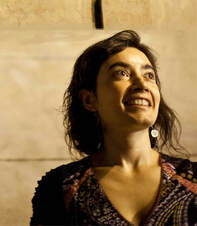
C'est l'amour (2018, for electric guitar) Le psychanalyse c’est l ‘amour Jacques Lacan conference at Université Catholigue de Louvai October 13, 1972 A man and his guitar. A metaphor of an unsolved equation. The electric guitar is one of the symbolic icons from XX Century. Rock & roll and pop music used it as an essential material. In between, many generations of young people approach to music through a guitar, and that instrument becomes a "whole" that also condenses their dreams and desires. In the meantime, a man, alone, suffering, with his guitar, surviving, thanks to his guitar. This etude for electric guitar is a performative-musical piece, in which the score is also a scenic cartography and where music, the performer and his/her instrument are organically inter-related.
Patricia Martinez is an active composer, interdisciplinary artist and performer, working and awarded internationally since the last 29 years, based in Buenos Aires. Her creative and research interests are focused on new music composition and interdisciplinary projects, specially contemporary music theatre, new opera, symphonic and chamber works, extended music composition & performance, a sensible use of technology (electroacoustic and video art), improvisation, and choreography-composition. She holds a Doctoral and Master degree in Music Composition (Stanford University) and she completed the annual course in Computer Music (Ircam). Her works won prizes such as the Argentinean Government’s; Casa de las Américas; International Young Composers' Meeting; American Prize; Ibermúsicas/Iberescena. She received commissions and grants including: International Music Theatre Competition/Internationales Musikinstitut Darmstadt; Bludenzer Tage zeitgemäßer Musik; Music Current; American Composers Forum; or Experimental Center of The Colón Theater. She participated at events and Festivals in America, Europe, and South Africa, including: MATA Festival, Donaueschinger Musiktage, Darmstädter Ferienkurse or ISCM. She is professor of composition at the CSMCBA, UNQ and the UNAM.
Patricia Martinez is an active composer, interdisciplinary artist and performer, working and awarded internationally since the last 29 years, based in Buenos Aires. Her creative and research interests are focused on new music composition and interdisciplinary projects, specially contemporary music theatre, new opera, symphonic and chamber works, extended music composition & performance, a sensible use of technology (electroacoustic and video art), improvisation, and choreography-composition. She holds a Doctoral and Master degree in Music Composition (Stanford University) and she completed the annual course in Computer Music (Ircam). Her works won prizes such as the Argentinean Government’s; Casa de las Américas; International Young Composers' Meeting; American Prize; Ibermúsicas/Iberescena. She received commissions and grants including: International Music Theatre Competition/Internationales Musikinstitut Darmstadt; Bludenzer Tage zeitgemäßer Musik; Music Current; American Composers Forum; or Experimental Center of The Colón Theater. She participated at events and Festivals in America, Europe, and South Africa, including: MATA Festival, Donaueschinger Musiktage, Darmstädter Ferienkurse or ISCM. She is professor of composition at the CSMCBA, UNQ and the UNAM.
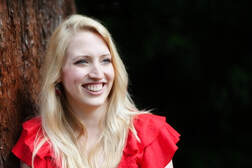
The Bells Are All Silent — During the Covid 19 lockdown, I spent 10 weeks in isolation in my apartment in Glasgow, Scotland. I live at the corner of a cross-roads which is flanked on all sides by churches of various denominations. One of the things that has struck me most during this time has been the change in my daily soundscape. With so much less traffic on the roads, I hear the bird song every morning, I hear the sound of the rain, of children in the local park. But most striking to me has been the absolute silence of the church bells.
Scottish composer Ailie Robertson (1983) won the inaugural 'Achievement in New Music’ prize at the Scottish Awards for New Music, was twice 'Composer of the Year' nominee in the Scottish Trad Music Awards, held a BBC Performing Arts Fellowship to work as Composer in Residence and was also awarded an Emerging Excellence Award from the Musicians Benevolent Fund.
She holds a PhD in composition from Trinity Laban Conservatoire, and currently lectures at the Royal Conservatoire of Scotland. Recent commissions include works for the London Philharmonic Orchestra, Bang on a Can, The St Magnus International Festival, Celtic Connections Festival, The Riot Ensemble, The Melbourne Recital Centre and Ensemble Perpetuo amongst others.
She is Composer-in-Residence for Sound Festival and Glyndebourne Opera.
Scottish composer Ailie Robertson (1983) won the inaugural 'Achievement in New Music’ prize at the Scottish Awards for New Music, was twice 'Composer of the Year' nominee in the Scottish Trad Music Awards, held a BBC Performing Arts Fellowship to work as Composer in Residence and was also awarded an Emerging Excellence Award from the Musicians Benevolent Fund.
She holds a PhD in composition from Trinity Laban Conservatoire, and currently lectures at the Royal Conservatoire of Scotland. Recent commissions include works for the London Philharmonic Orchestra, Bang on a Can, The St Magnus International Festival, Celtic Connections Festival, The Riot Ensemble, The Melbourne Recital Centre and Ensemble Perpetuo amongst others.
She is Composer-in-Residence for Sound Festival and Glyndebourne Opera.
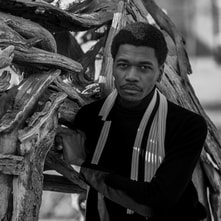
Wach ya HAYDN is based on Haydn's Sonata in D major Hob. XVI: 37. The title of this work is written in Jamaican patois and is a double entendre: 1. Watch here (literal translation) or Look here HAYDN! In this context, see what I can do?! This is my personal musical exhibit parody in the likes of Mozart toward Antonio Salieri. 2. What are you hiding? A nod to the musical structure itself; the game of hide and seek. The piece is an experiential account of the journey. The main theme from the Haydn Sonata is the 'subject being hidden' and after initial searching, checking the obvious places, checking areas once or twice and no progress, the frustration kicks in. Then you are forced to start thinking creatively and the search in unconventional hiding spots begin; you start to get closer to finding the subject and then finally, you found then!... then it's over.
Mikhail Johnson (1989–), born in the rural hills of Maldon in the parish of St. James, Jamaica, is one of the country’s most promising pianists and composers.
As a composer, Johnson’s music mixes European classical music and traditional Jamaican culture. His compositional output is being published on his own publishing label Johno Muzik and comprises of: sacred and patriotic choral works, African-American spiritual arrangements, song cycles and instrumental works. His unique compositional style has resulted in commissions from universities and music organizations and several performances of his works by the Cleveland Chamber Symphony, The Cantus Ensemble of London, The North/South Consonance Ensemble, The Concordia Ensemble of the University of Notre Dame, Transient Canvas and the Departure Duo.
Johnson holds a Bachelor of Science degree in Biological Science and a minor in music from Northern Caribbean University; Double Masters of Music degree in piano performance and composition from Bowling Green State University, and is currently reading for a Doctor of Music in piano performance at Texas Tech University.
featuring guest pianist
Alexandra Medeiros recently graduated from Williams College studying Music and Psychology. She is 2020 Teach for America Corps Member and teaches low-income, marginalized students of color at Achievement First Iluminar in Cranston. In addition to teaching, she intends to study music and continue composing, performing and collaborating with other musicians, especially with young students and musicians in her community.
At Williams, she directed the Gospel Choir and played bass clarinet in the Wind Ensemble as well as performing on different instruments in various other ensembles. She was one of five winners of the 2020 Berkshire Concerto Competition and was awarded the Hubbard Hutchinson Memorial Fellowship for pursuing a career in the arts.
As an aspiring composer, she has explored music as an outlet to express her identities, thoughts, and perspectives, which culminated in a piece that depicted her internal struggle of being biracial.
Mikhail Johnson (1989–), born in the rural hills of Maldon in the parish of St. James, Jamaica, is one of the country’s most promising pianists and composers.
As a composer, Johnson’s music mixes European classical music and traditional Jamaican culture. His compositional output is being published on his own publishing label Johno Muzik and comprises of: sacred and patriotic choral works, African-American spiritual arrangements, song cycles and instrumental works. His unique compositional style has resulted in commissions from universities and music organizations and several performances of his works by the Cleveland Chamber Symphony, The Cantus Ensemble of London, The North/South Consonance Ensemble, The Concordia Ensemble of the University of Notre Dame, Transient Canvas and the Departure Duo.
Johnson holds a Bachelor of Science degree in Biological Science and a minor in music from Northern Caribbean University; Double Masters of Music degree in piano performance and composition from Bowling Green State University, and is currently reading for a Doctor of Music in piano performance at Texas Tech University.
featuring guest pianist
Alexandra Medeiros recently graduated from Williams College studying Music and Psychology. She is 2020 Teach for America Corps Member and teaches low-income, marginalized students of color at Achievement First Iluminar in Cranston. In addition to teaching, she intends to study music and continue composing, performing and collaborating with other musicians, especially with young students and musicians in her community.
At Williams, she directed the Gospel Choir and played bass clarinet in the Wind Ensemble as well as performing on different instruments in various other ensembles. She was one of five winners of the 2020 Berkshire Concerto Competition and was awarded the Hubbard Hutchinson Memorial Fellowship for pursuing a career in the arts.
As an aspiring composer, she has explored music as an outlet to express her identities, thoughts, and perspectives, which culminated in a piece that depicted her internal struggle of being biracial.

Hassle-Free Packaging draws inspiration from the countless unboxing videos on YouTube, in which people share recordings of themselves opening (or ‘unboxing’) items they’ve purchased. The videos highlight a performative kind of consumerism, in which the item itself is only a prop for the ritual of the unboxing. The sound of boxes being torn open, the satisfaction of seeing products untethered from their packaging, and the often mundane but nonetheless comforting reassurances from the unboxer provide a vicarious bliss for the viewer. The sight and sound of new things seems to conjure a sense of excitement and possibility, even for those who may never make such a purchase.
Martim S. Galvão is a Brazilian-American composer, percussionist and multimedia artist. Much of his work is concerned with interfaces and how we interact with them. He is especially interested in exploring ideas related to consumer-facing technologies and the web.
Galvão's work has been performed at venues such as the International Conference on New Interfaces for Musical Expression (NIME), International Computer Music Conference (ICMC), ANT Fest at Ars Nova, SPLICE Institute, New York City Electroacoustic Music Festival (NYCEMF), and Babycastles among others.
Galvão earned his bachelor’s degree from Emory University. In 2014 he graduated from the Integrated Composition, Improvisation, and Technology (ICIT) MFA program at the University of California, Irvine. He is currently pursuing a PhD in Computer Music and Multimedia at Brown University
Martim S. Galvão is a Brazilian-American composer, percussionist and multimedia artist. Much of his work is concerned with interfaces and how we interact with them. He is especially interested in exploring ideas related to consumer-facing technologies and the web.
Galvão's work has been performed at venues such as the International Conference on New Interfaces for Musical Expression (NIME), International Computer Music Conference (ICMC), ANT Fest at Ars Nova, SPLICE Institute, New York City Electroacoustic Music Festival (NYCEMF), and Babycastles among others.
Galvão earned his bachelor’s degree from Emory University. In 2014 he graduated from the Integrated Composition, Improvisation, and Technology (ICIT) MFA program at the University of California, Irvine. He is currently pursuing a PhD in Computer Music and Multimedia at Brown University
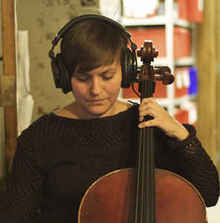
Radiolaria are single-celled microscopic animals with beautifully intricate and sometimes symmetrical forms. They float throughout the planet’s oceans and have existed for hundreds of millions of years. The pellucid tones of crotales and violin resemble these fascinating creatures and the bass drum holds the depth of the waters they reside in.
Providence-based cellist and electronic musician Laura Cetilia is a performer, composer, educator, and presenter. As a daughter of mixed heritage (second generation Mexican-American), she is at home with in-betweeness, moving with ease through genres and practices as she did with cultures and languages growing up on the Eastside of Los Angeles. As a composer, her music has been described as “unorthodox loveliness” by the Boston Globe and and her solo album, “Used, Broken, and Unwanted” was hailed as “alternately penetrating and atmospheric” in Sequenza 21. Her works have been played by ensembles such as Mivos Quartet, Splinter Reeds, Dog Star Orchestra, a.pe.ri.od.ic, Verdant Vibes, LCollective, The Furies, and violinist Erik Carlson. After a decade of service at the nationally acclaimed non-profit Community MusicWorks, she returned to school in 2018 for her MA in composition at Wesleyan University and will begin her DMA in composition at Cornell in Fall 2020. She is also a proud mother of one.
Providence-based cellist and electronic musician Laura Cetilia is a performer, composer, educator, and presenter. As a daughter of mixed heritage (second generation Mexican-American), she is at home with in-betweeness, moving with ease through genres and practices as she did with cultures and languages growing up on the Eastside of Los Angeles. As a composer, her music has been described as “unorthodox loveliness” by the Boston Globe and and her solo album, “Used, Broken, and Unwanted” was hailed as “alternately penetrating and atmospheric” in Sequenza 21. Her works have been played by ensembles such as Mivos Quartet, Splinter Reeds, Dog Star Orchestra, a.pe.ri.od.ic, Verdant Vibes, LCollective, The Furies, and violinist Erik Carlson. After a decade of service at the nationally acclaimed non-profit Community MusicWorks, she returned to school in 2018 for her MA in composition at Wesleyan University and will begin her DMA in composition at Cornell in Fall 2020. She is also a proud mother of one.
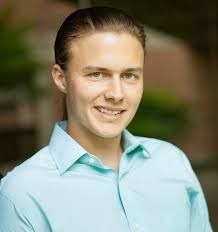
In writing LUNE, I was inspired by the nocturnal sound world of Lake Dunmore in Leicester, VT, where, of a summer evening, the air is filled with long, wailing loon calls that echo across the lake. The pitch content of these loon calls provides the harmonic fabric of the piece, in which the violin and electronics slowly converge from individualized parts into a mass sound depicting a flock of loons passing overhead. The type of loon call heard here is specified amongst other loon vocalizations as a “wail,” which is used by individuals to locate other loons. I wrote LUNE for violinist and longtime friend Lilit Hartunian. It is dedicated to her and to the memory of our childhood friend Simon Chernack, who passed away while I was writing the piece. This tombeau for him, like the loon calls, consistently wonders: “Where are you?”
Composer Sid Richardson writes concert music that imbues modern idioms with emotional grit and cerebral wit. His work explores the intersections of music and literature, drawing inspiration from the works of such writers as Beckett, Catullus, Chaucer, Garréta, Longfellow, Keats, Proust, and Rimbaud to create a style that focuses on harmony and timbre. Preexisting texts are used to create a metaphorical resonance with the source materials in pieces that weave literary elements into their formal, rhythmic, and harmonic structures. Sid earned a PhD in Composition at Duke University and holds degrees from Boston Conservatory and Tufts University. He has held artist residencies at Crosstown Arts, Virginia Center for the Creative Arts, and The Hermitage Artist Retreat. Active as a music educator, he has taught at Wellesley College and the Massachusetts Institute of Technology, and is currently on the composition faculty at New England Conservatory of Music.
Composer Sid Richardson writes concert music that imbues modern idioms with emotional grit and cerebral wit. His work explores the intersections of music and literature, drawing inspiration from the works of such writers as Beckett, Catullus, Chaucer, Garréta, Longfellow, Keats, Proust, and Rimbaud to create a style that focuses on harmony and timbre. Preexisting texts are used to create a metaphorical resonance with the source materials in pieces that weave literary elements into their formal, rhythmic, and harmonic structures. Sid earned a PhD in Composition at Duke University and holds degrees from Boston Conservatory and Tufts University. He has held artist residencies at Crosstown Arts, Virginia Center for the Creative Arts, and The Hermitage Artist Retreat. Active as a music educator, he has taught at Wellesley College and the Massachusetts Institute of Technology, and is currently on the composition faculty at New England Conservatory of Music.
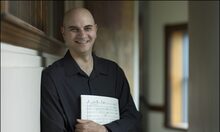
Gnizo
I.
II.
III.
This piece requires a very specific state of mind, almost a meditative approach in the performer, to get to the heart and to evoke a contemplative frame of mind in the listener. A quiet cry, a yearning for comfort, feelings of aloneness, an attitude of prayer and meditation–all things we can relate to right now more than ever. The composition should be played as if the performer were in a place of worship. For Kareem, he imagines entering a stone church within a convent in Syria. I try to transport myself there through imagery so I can invite the listener to travel with me. — EmmaLee Holmes-Hicks
Syrian-American Kareem Roustom is an Emmy-nominated composer whose genre crossing collaborations include music commissioned for the Kronos Quartet, conductor Daniel Barenboim & the West-Eastern Divan Orchestra, the Grant Park Music Festival in Chicago, the Dallas Symphony, & the Grand Teton Music Festival. Roustom was composer-in-residence with the Württembergische Philharmonie in Reutlingen, Germany for the 2019 – 2020 seasons, and has been the composer-in-residence at the Grant Park Music Festival (2019) and the Grand Teton Music Festival (2018). Roustom’s music has been performed by orchestras that include the BBC Symphony Orchestra, the Minnesota Orchestra, the Boston Symphony Orchestra, the New York Philharmonic, the Pittsburgh Symphony, the Württembergische Philharmonie Reutlingen, the Berlin Symphoniker, and at renowned festivals & halls such as the BBC Proms, the Salzburg Festival, the Lucerne Festival, Carnegie Hall, the Verbier Festival, the Pierre Boulez Saal in Berlin, the Teatro Colon in Buenos Aires, as well is in the Near East, Armenia, Jakarta, China and Japan. Roustom’s music has also been recorded by the Deutsches Symphonie-Orchester (Berlin), and the Philharmonia Orchestra (London). In addition Roustom has collaborated with pop-artists such as Shakira, Beyonce, Tina Turner and others. The Chicago Tribune wrote that Roustom is “a gifted and accomplished artist…one of the most prominent active Arab-American composers,” BBC Radio 3 described Roustom’s music as “among the most distinctive to have emerged from the Middle East”, and The New York Times described his music as “propulsive, colorful and immediately appealing.” The Guardian (London) wrote that Roustom’s music is “arrestingly quirky and postmodern…music with lots of personality.” Of his Violin Concerto No. 1, composed for violinist Michael Barenboim, Der Tagesspiegel wrote ““Roustom’s Violin Concerto No. 1, an homage to Mozart’s fascination with Arabic & Turkish music, is not Mozart “alla turca”, but conversely Turkish and North African “alla Vienna”: As far as the vitality, the profound cheerfulness, the dance like dialogue between instruments are concerned, Roustom’s work is infected by Mozart’s élan.”
I.
II.
III.
This piece requires a very specific state of mind, almost a meditative approach in the performer, to get to the heart and to evoke a contemplative frame of mind in the listener. A quiet cry, a yearning for comfort, feelings of aloneness, an attitude of prayer and meditation–all things we can relate to right now more than ever. The composition should be played as if the performer were in a place of worship. For Kareem, he imagines entering a stone church within a convent in Syria. I try to transport myself there through imagery so I can invite the listener to travel with me. — EmmaLee Holmes-Hicks
Syrian-American Kareem Roustom is an Emmy-nominated composer whose genre crossing collaborations include music commissioned for the Kronos Quartet, conductor Daniel Barenboim & the West-Eastern Divan Orchestra, the Grant Park Music Festival in Chicago, the Dallas Symphony, & the Grand Teton Music Festival. Roustom was composer-in-residence with the Württembergische Philharmonie in Reutlingen, Germany for the 2019 – 2020 seasons, and has been the composer-in-residence at the Grant Park Music Festival (2019) and the Grand Teton Music Festival (2018). Roustom’s music has been performed by orchestras that include the BBC Symphony Orchestra, the Minnesota Orchestra, the Boston Symphony Orchestra, the New York Philharmonic, the Pittsburgh Symphony, the Württembergische Philharmonie Reutlingen, the Berlin Symphoniker, and at renowned festivals & halls such as the BBC Proms, the Salzburg Festival, the Lucerne Festival, Carnegie Hall, the Verbier Festival, the Pierre Boulez Saal in Berlin, the Teatro Colon in Buenos Aires, as well is in the Near East, Armenia, Jakarta, China and Japan. Roustom’s music has also been recorded by the Deutsches Symphonie-Orchester (Berlin), and the Philharmonia Orchestra (London). In addition Roustom has collaborated with pop-artists such as Shakira, Beyonce, Tina Turner and others. The Chicago Tribune wrote that Roustom is “a gifted and accomplished artist…one of the most prominent active Arab-American composers,” BBC Radio 3 described Roustom’s music as “among the most distinctive to have emerged from the Middle East”, and The New York Times described his music as “propulsive, colorful and immediately appealing.” The Guardian (London) wrote that Roustom’s music is “arrestingly quirky and postmodern…music with lots of personality.” Of his Violin Concerto No. 1, composed for violinist Michael Barenboim, Der Tagesspiegel wrote ““Roustom’s Violin Concerto No. 1, an homage to Mozart’s fascination with Arabic & Turkish music, is not Mozart “alla turca”, but conversely Turkish and North African “alla Vienna”: As far as the vitality, the profound cheerfulness, the dance like dialogue between instruments are concerned, Roustom’s work is infected by Mozart’s élan.”
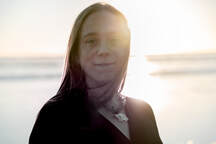
The Pathless Woods
I. By allowing the will to float, we might see and hear more clearly
II. Trees bend in submission to storms
III. The good times of today are the sad thoughts of tomorrow
IV. A place where no one knows...
The title is taken from a quote on a tea bag—"There is a pleasure in the pathless woods”—an excerpt from Lord Byron’s work, Childe Harold’s Pilgrimage, in which a disillusioned world wanderer marvels at the ways in which Nature’s sheer power overwhelms Humankind. Written in December 2020, amidst peak burnout and COVID spike, my piece is a stream-of-consciousness reflection on this critical moment when we have awakened to an opportunity to reimagine the world together. Our priorities have come into focus, new paths forward have been illuminated, a hopeful spirit rises, and as much as action is overdue and necessary, we must also rest and gather strength to navigate difficult times ahead. Many musical choices were inspired by my dear friends for whom it was written, EmmaLee Holmes-Hicks and Piero Guimaraes, who also graciously provided percussion samples.
Smart, transcendent, and immersive, Kirsten Volness’ emotive soundscapes integrate electronics and modern composition techniques with jazz and pop influences. “Irresistible” (San Francisco Chronicle) and “nothing short of gorgeous.” (New York Arts), each of her compositions reveals “an exquisite sound world” (New Classic LA) inspired by nature, myth, spirituality, and environmental and sociopolitical issues. With commissions from the World Future Council Foundation, ASCAP/SEAMUS, BMI Foundation, and The American Opera Project, Volness received MacColl Johnson and RISCA Fellowships. She holds composition degrees from the Universities of Michigan and Minnesota, and is Visiting Assistant Professor at Reed College.
I. By allowing the will to float, we might see and hear more clearly
II. Trees bend in submission to storms
III. The good times of today are the sad thoughts of tomorrow
IV. A place where no one knows...
The title is taken from a quote on a tea bag—"There is a pleasure in the pathless woods”—an excerpt from Lord Byron’s work, Childe Harold’s Pilgrimage, in which a disillusioned world wanderer marvels at the ways in which Nature’s sheer power overwhelms Humankind. Written in December 2020, amidst peak burnout and COVID spike, my piece is a stream-of-consciousness reflection on this critical moment when we have awakened to an opportunity to reimagine the world together. Our priorities have come into focus, new paths forward have been illuminated, a hopeful spirit rises, and as much as action is overdue and necessary, we must also rest and gather strength to navigate difficult times ahead. Many musical choices were inspired by my dear friends for whom it was written, EmmaLee Holmes-Hicks and Piero Guimaraes, who also graciously provided percussion samples.
Smart, transcendent, and immersive, Kirsten Volness’ emotive soundscapes integrate electronics and modern composition techniques with jazz and pop influences. “Irresistible” (San Francisco Chronicle) and “nothing short of gorgeous.” (New York Arts), each of her compositions reveals “an exquisite sound world” (New Classic LA) inspired by nature, myth, spirituality, and environmental and sociopolitical issues. With commissions from the World Future Council Foundation, ASCAP/SEAMUS, BMI Foundation, and The American Opera Project, Volness received MacColl Johnson and RISCA Fellowships. She holds composition degrees from the Universities of Michigan and Minnesota, and is Visiting Assistant Professor at Reed College.
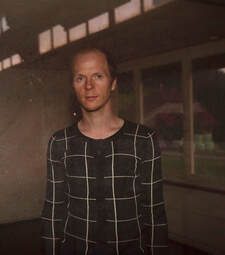
Texture C is part of a larger series for chamber ensembles and electronic algorithms, in which the performers provide extremely rich and fragile sustained tones that are then “gridded” at inhumanly fast pace by the digital algorithm. Texture C takes this idea on yet another level by isolating the performers in their distant homes, from where they follow an experimental score and stream their performance a central computer, which applies the gridding to it and mixes all the incoming streams into a single sonic experience, that is then being re-streamed to the remote audience. Texture C is a piece about temporal scale—slow human tones against frenetic digital cuts—and about references to pulse-driven musical undergrounds—which are never quite salient, and yet they always remain imaginable under the piece’s intimate surface.
Marcel Zaes (b. 1984 in Bern, Switz., lives and works in Providence, RI), is a performer-composer, artist, and artistic researcher, currently pursuing his Ph.D. in Music & Multimedia Composition at Brown University. Marcel explores rhythm in an interdisciplinary framework that encompasses its socio-cultural backgrounds, its politics and perception, and the use of mechanical rhythm machines in music making – such as metronomes, drum machines and step sequencers. Marcel creates textures and beats that emerge as installation pieces, sound performances, concert music for ensembles or as electronic solo performances.
Marcel Zaes (b. 1984 in Bern, Switz., lives and works in Providence, RI), is a performer-composer, artist, and artistic researcher, currently pursuing his Ph.D. in Music & Multimedia Composition at Brown University. Marcel explores rhythm in an interdisciplinary framework that encompasses its socio-cultural backgrounds, its politics and perception, and the use of mechanical rhythm machines in music making – such as metronomes, drum machines and step sequencers. Marcel creates textures and beats that emerge as installation pieces, sound performances, concert music for ensembles or as electronic solo performances.
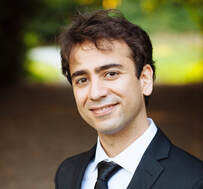
Radiant Light is inspired by a short poem I encountered at De Young Museum in San Francisco, and the painting that accompanied it. Named Untitled, the poem was placed under Childe Hassam’s painting, Easter Morning (Portrait at a New York Window). It was written by a local seventh-grader named Elizabeth Woods. The poem focuses primarily on the light, the radiant light, as it breaks into the dark New York City apartment, and gives this painting its wonderful array of colours. The painting and the accompanying poem by someone of the next generation felt symbolic. Knowing that we are leaving behind a dark wasteland of a world for the future generation, I felt so uplifted by the idea that there may still be a small window, through which, we can at least let in some hope of light for future generations.
Iman Habibi, D.M.A. (Michigan), is an Iranian-Canadian composer and pianist, and a founding member of the piano duo ensemble, Piano Pinnacle. Hailed as “a giant in talent” (the Penticton Herald), Dr. Habibi has been commissioned by The Philadelphia Orchestra and The Orchestra of St. Luke's, and collaborated with the Vancouver Symphony Orchestra, Winnipeg Symphony Orchestra, JACK Quartet, Chiara String Quartet, Del Sol String Quartet, and The Calidore String Quartet, and has been programmed by Carnegie Hall, The Marilyn Horne Foundation, New York Festival of Song, The Canadian Opera Company, and Tapestry New Opera, among others. His awards include multiple wins at the SOCAN Foundation’s Awards, The International Composers’ Award at the Esoterics’ POLYPHONOS (2012), The Vancouver Mayor’s Arts Awards for Emerging Artist in Music (2011), Brehm Prize in Choral Music (2016), as well as numerous grants from the Canada Council for the Arts, and BC Arts Council.
Iman Habibi, D.M.A. (Michigan), is an Iranian-Canadian composer and pianist, and a founding member of the piano duo ensemble, Piano Pinnacle. Hailed as “a giant in talent” (the Penticton Herald), Dr. Habibi has been commissioned by The Philadelphia Orchestra and The Orchestra of St. Luke's, and collaborated with the Vancouver Symphony Orchestra, Winnipeg Symphony Orchestra, JACK Quartet, Chiara String Quartet, Del Sol String Quartet, and The Calidore String Quartet, and has been programmed by Carnegie Hall, The Marilyn Horne Foundation, New York Festival of Song, The Canadian Opera Company, and Tapestry New Opera, among others. His awards include multiple wins at the SOCAN Foundation’s Awards, The International Composers’ Award at the Esoterics’ POLYPHONOS (2012), The Vancouver Mayor’s Arts Awards for Emerging Artist in Music (2011), Brehm Prize in Choral Music (2016), as well as numerous grants from the Canada Council for the Arts, and BC Arts Council.
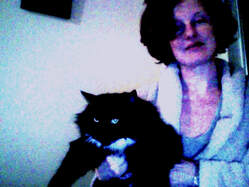
Feedback Performers Enter Zoom Room | Sally Duke "Isolation has been a part of my artistic exploration for quite some time. As a child I went to 9 different elementary schools and 3 different junior high schools and then began living on my own at 15 years old. Without family, I have been doing things by myself. Three years ago, I was in a car accident and was injured severely in the neck. I have been isolated in suburban dystopia, a cheap apartment, alone in a bed. Covid hit when I was preparing for neck surgery, I began to get mini-strokes. Now I am facing brain surgery, alone. Now, I am exploring this sentiment, on zoom, a platform for socialization, alone."

and it comes like a piece of light through the dust presents the transformational process of timbre, which seems to be covered by a layer of dust. Gradually it reveals its essence as it is illuminated by different amounts and intensities of light. However, rather than timbre moving to ‘perfect’ visibility, most of the time it is driven to total distortion as a consequence of a kind of ‘overexposure effect’. Sometimes it just remains covered while subtle transformations occur because of shiny rays of light that attempt to cross the dust but cannot.
Michele Abondano (b. 1981, Colombia) is a composer, experimental performer, and researcher. Her creative work has been developed in the fields of acoustic and electroacoustic music as well as live electronics and collaborative works with dance. Her main interest is to explore timbre, especially, its multidimensional and dynamic condition. Winner of the Scholarship for the Creation of Contemporary Music granted by the Ministry of Culture (Colombia, 2015), the ECOES-UNAM Scholarship for an Artistic Residency at the Mexican Centre for Music and Sonic Arts CMMAS (Mexico, 2014), and the Melos/Gandini’11 Scholarship granted by Melos Ediciones Musicales S.A. (Argentina, 2011). She holds a Master’s degree in Music Composition, Honorable Mention, from Universidad Nacional Autónoma de México (2015) as well as a Bachelor’s Degree in Composition from Pontificia Universidad Católica Argentina (2011). Recently, she was awarded an AHC Doctoral Research Scholarship to pursue a PhD in Composition at the University of Leeds (UK, 2018-2021)
Michele Abondano (b. 1981, Colombia) is a composer, experimental performer, and researcher. Her creative work has been developed in the fields of acoustic and electroacoustic music as well as live electronics and collaborative works with dance. Her main interest is to explore timbre, especially, its multidimensional and dynamic condition. Winner of the Scholarship for the Creation of Contemporary Music granted by the Ministry of Culture (Colombia, 2015), the ECOES-UNAM Scholarship for an Artistic Residency at the Mexican Centre for Music and Sonic Arts CMMAS (Mexico, 2014), and the Melos/Gandini’11 Scholarship granted by Melos Ediciones Musicales S.A. (Argentina, 2011). She holds a Master’s degree in Music Composition, Honorable Mention, from Universidad Nacional Autónoma de México (2015) as well as a Bachelor’s Degree in Composition from Pontificia Universidad Católica Argentina (2011). Recently, she was awarded an AHC Doctoral Research Scholarship to pursue a PhD in Composition at the University of Leeds (UK, 2018-2021)
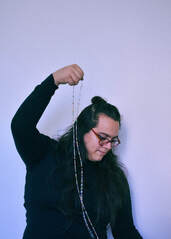
INBHIR is an old gaelic word for a 'confluence of waters' or 'the mouth of a river'
inti figgis-vizueta (b. 1993) writes magically real musics through the lens of personal identities, braiding a childhood of overlapping immigrant communities and Black-founded Freedom schools—in Chocolate City (DC)—with Andean heritage and a deep connection to the land. Reviewers say her music constantly toes the line between "all turbulence" and "quietly focused" (National Sawdust Log). inti has been commissioned by JACK Quartet, Crash Ensemble, National Sawdust, Music from Copland House, the Forward Music Project, and cellist Andrew Yee, among many others. She lives in New York and, like a plant, needs a lot of sunlight.
inti figgis-vizueta (b. 1993) writes magically real musics through the lens of personal identities, braiding a childhood of overlapping immigrant communities and Black-founded Freedom schools—in Chocolate City (DC)—with Andean heritage and a deep connection to the land. Reviewers say her music constantly toes the line between "all turbulence" and "quietly focused" (National Sawdust Log). inti has been commissioned by JACK Quartet, Crash Ensemble, National Sawdust, Music from Copland House, the Forward Music Project, and cellist Andrew Yee, among many others. She lives in New York and, like a plant, needs a lot of sunlight.
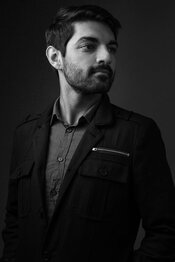
“She felt... how life, from being made up of little separate incidents which one lived one by one, became curled and whole like a wave which bore one up with it and threw one down with it, there, with a dash on the beach.” - Virginia Woolf, To The Lighthouse
Anuj Bhutani is quickly emerging as a versatile composer for the concert stage, dance, and film. In 2020, he won 1st prize in Cerddorion Vocal Ensemble’s Composer Competition, and held fellowships at “1:2:1”, Arts, Letters & Numbers, and The Walden School. His work was also selected for the Norfolk Chamber Music Festival, SCI National Conference and Student Mixtape, New York City Electroacoustic Music Festival, and Electric LaTex Festival. In 2019, he was commissioned by Inversion Ensemble as part of Carlos Corderos’ inaugural Happy Composer Commissioning Project. He is pursuing bachelor’s degrees in composition and music theory at the University of North Texas. His primary teachers have included Andrew May, Sungji Hong, Drew Schnurr, and UNT Composer-in-Residence Bruce Broughton. He also holds a BA in Psychology from UT Austin, where he graduated with High Honors and a Presidential scholarship in 2015.
Anuj Bhutani is quickly emerging as a versatile composer for the concert stage, dance, and film. In 2020, he won 1st prize in Cerddorion Vocal Ensemble’s Composer Competition, and held fellowships at “1:2:1”, Arts, Letters & Numbers, and The Walden School. His work was also selected for the Norfolk Chamber Music Festival, SCI National Conference and Student Mixtape, New York City Electroacoustic Music Festival, and Electric LaTex Festival. In 2019, he was commissioned by Inversion Ensemble as part of Carlos Corderos’ inaugural Happy Composer Commissioning Project. He is pursuing bachelor’s degrees in composition and music theory at the University of North Texas. His primary teachers have included Andrew May, Sungji Hong, Drew Schnurr, and UNT Composer-in-Residence Bruce Broughton. He also holds a BA in Psychology from UT Austin, where he graduated with High Honors and a Presidential scholarship in 2015.
VERDANT VIBES BENEFIT CONCERT
February 22, 2020 at 7pm EST
February 22, 2020 at 7pm EST
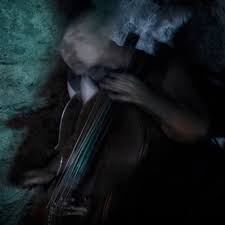
Citlallo is a word borrowed from the ancient language of the Aztecs, nahuatl. It loosely translates into “that which contains stars.” This piece utilizes audio transducers (in this case vintage Rolen Stars) to emit sine tones into a piano and a heatsink, causing the strings of the piano and the metal prongs of the heatsink to sympathetically resonate. The cello slowly descends from the uppermost harmonics of the instrument down to the opposite end of the string where those same harmonics occur. The glockenspiel quietly tinkles in the back ground, echoing the tones produced by the other instruments. This piece is dedicated to my abuela who turned 105 years old this year.
Cellist and electronic musician Laura Cetilia is a performer, composer, educator, and presenter. A daughter of mixed heritage (Anglo-Chicana), she is at home with in-betweenness. As a composer, her music has been described as “unorthodox loveliness” by the Boston Globe and and her solo electroacoustic album was hailed as “alternately penetrating and atmospheric” in Sequenza 21. Her work has been performed by Mivos Quartet, Dog Star Orchestra, Ordinary Affects, L Collective, and the Furies, among others. As a member of Mem1, with Mark Cetilia (modular synth), she has held artist residencies and toured extensively throughout the U.S. and Europe. With the composer collective Ordinary Affects she has worked with composers such as Alvin Lucier, Jürg Frey, Christian Wolff, Eva-Maria Houben, Nomi Epstein, Magnus Granberg and Michael Pisaro, premiering and recording works specifically written for them. Somehow, she is also a proud mother of one.
Cellist and electronic musician Laura Cetilia is a performer, composer, educator, and presenter. A daughter of mixed heritage (Anglo-Chicana), she is at home with in-betweenness. As a composer, her music has been described as “unorthodox loveliness” by the Boston Globe and and her solo electroacoustic album was hailed as “alternately penetrating and atmospheric” in Sequenza 21. Her work has been performed by Mivos Quartet, Dog Star Orchestra, Ordinary Affects, L Collective, and the Furies, among others. As a member of Mem1, with Mark Cetilia (modular synth), she has held artist residencies and toured extensively throughout the U.S. and Europe. With the composer collective Ordinary Affects she has worked with composers such as Alvin Lucier, Jürg Frey, Christian Wolff, Eva-Maria Houben, Nomi Epstein, Magnus Granberg and Michael Pisaro, premiering and recording works specifically written for them. Somehow, she is also a proud mother of one.
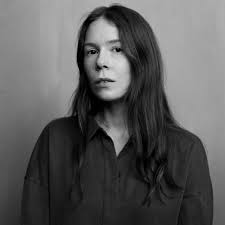
This piece is inspired by Melancholia by Lars von Trier, with the title of the piece being a quote from the movie. The whole quote is (also being red in my piece): “In my dreams, I’m trudging through this grey, woolly yarn. It's clinging to my legs. It’s really heavy to drag along.” I wanted to capture the feeling of melancholy and the unsureness that comes with, like not being able to be become free. The grey yarn is portraid through the violas wiggly lines, with the quarter tones creating the uncertainty and lack of fundament. An inspiration for working with this quarter tones and double stops also comes from György Kurtágs music that I’ve been very mesmerised by.
With a background in design, I today work mainly within the field of contemporary classical music as a composer and string musician. Other than concert hall music, my work also includes music for film, theatre, dance and more, both internationally and in Sweden where I'm based. When opportunity is given, I'm very thankful for close collaborations with musicians or other creators. Characteristics for my music are symbolism, humor and nostalgia and my aim is to describe states or tales with a hint of classical Swedish kitchen sink realism. --Ylva Fred
With a background in design, I today work mainly within the field of contemporary classical music as a composer and string musician. Other than concert hall music, my work also includes music for film, theatre, dance and more, both internationally and in Sweden where I'm based. When opportunity is given, I'm very thankful for close collaborations with musicians or other creators. Characteristics for my music are symbolism, humor and nostalgia and my aim is to describe states or tales with a hint of classical Swedish kitchen sink realism. --Ylva Fred
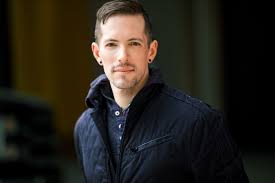
lean — It is about 8:30 on a windy October night. The moaning of the wind sounds like a banshee's cry. Inside the drawing room is a woman staring out the window, half searching for someone and half lost in brooding thought. Aged 56, of medium height, but with a proud, upright bearing that makes her seem taller than she is. There is strength, power and determination in this woman, and yet a fleeting echo of pain is etched in the sharp lines around her mouth. The drawing room is large and gloomy. Paneled walls, portraits of family founders, a large grand piano, an unlit fireplace.
The music of Brooklyn-based composer Matt Frey creates intimately sentimental sonic worlds inflected with churning rhythms, minimalist-like textures, and extended moments of restless tension. Frey is the recipient of a 2019-21 Composers & the Voice fellowship with The American Opera Project. His vocal works comprise song cycles, musical theater, and opera, and have been performed and workshopped across the U.S. and in Canada at festivals and programs including Fort Worth Opera’s Frontiers, Opera From Scratch, the John Duffy Composers Institute, and the BMI Lehman Engel Musical Theater Workshop. Frey's instrumental music explores a more abstract approach to narrative, focusing on the concept of tension and release and has been commissioned and presented by ensembles including the String Orchestra of Brooklyn, Synergy Percussion, and the JACK String Quartet. He is a graduate of the Masters program in Music Composition at New York University where he studied with Pulitzer Prize-winning composer Julia Wolfe.
The music of Brooklyn-based composer Matt Frey creates intimately sentimental sonic worlds inflected with churning rhythms, minimalist-like textures, and extended moments of restless tension. Frey is the recipient of a 2019-21 Composers & the Voice fellowship with The American Opera Project. His vocal works comprise song cycles, musical theater, and opera, and have been performed and workshopped across the U.S. and in Canada at festivals and programs including Fort Worth Opera’s Frontiers, Opera From Scratch, the John Duffy Composers Institute, and the BMI Lehman Engel Musical Theater Workshop. Frey's instrumental music explores a more abstract approach to narrative, focusing on the concept of tension and release and has been commissioned and presented by ensembles including the String Orchestra of Brooklyn, Synergy Percussion, and the JACK String Quartet. He is a graduate of the Masters program in Music Composition at New York University where he studied with Pulitzer Prize-winning composer Julia Wolfe.
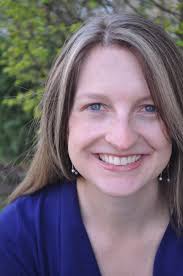
Octopus
Caroline Mallonee’s music has been programmed at venues in New York including Carnegie Hall, Lincoln Center, Symphony Space, Merkin Hall, Bargemusic, Tenri Cultural Center, Town Hall, Roulette, Tonic and National Sawdust, as well as further afield at the Long Leaf Opera Festival (NC), Carlsbad Music Festival (CA), Bennington Chamber Music Conference (VT), Jordan Hall (Boston, MA), Cambridge Music Festival (UK), and Tokyo Opera City (Japan).
Mallonee has been commissioned to write new works for the Buffalo Philharmonic Orchestra, Spektral Quartet, Firebird Ensemble, Present Music, Wet Ink Ensemble, Antares, PRISM Quartet, Ciompi Quartet, Ethos Percussion, and the Buffalo Chamber Players. The New York Philharmonic included her music on its CONTACT! new music series in 2015 and will premiere a new piece for large chamber ensemble in 2021.
She is the director of the Walden School Creative Musicians Retreat, a week-long festival for composers and improvisers held in New Hampshire each June.
Caroline Mallonee’s music has been programmed at venues in New York including Carnegie Hall, Lincoln Center, Symphony Space, Merkin Hall, Bargemusic, Tenri Cultural Center, Town Hall, Roulette, Tonic and National Sawdust, as well as further afield at the Long Leaf Opera Festival (NC), Carlsbad Music Festival (CA), Bennington Chamber Music Conference (VT), Jordan Hall (Boston, MA), Cambridge Music Festival (UK), and Tokyo Opera City (Japan).
Mallonee has been commissioned to write new works for the Buffalo Philharmonic Orchestra, Spektral Quartet, Firebird Ensemble, Present Music, Wet Ink Ensemble, Antares, PRISM Quartet, Ciompi Quartet, Ethos Percussion, and the Buffalo Chamber Players. The New York Philharmonic included her music on its CONTACT! new music series in 2015 and will premiere a new piece for large chamber ensemble in 2021.
She is the director of the Walden School Creative Musicians Retreat, a week-long festival for composers and improvisers held in New Hampshire each June.
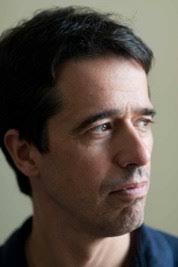
In astronomy and physical cosmology, dark energy is a form of energy still unknown and believed to fill the entire space of the universe, causing the acceleration of its expansion, from the initial Big Bang to the infinite future. Dark Energy aims to be a dark and energetic work. This piece was commissioned by the Contracello Duo.
João Pedro Oliveira completed a PhD in Music at the University of New York at Stony Brook. His music includes one chamber opera, several orchestral compositions, a Requiem, 3 string quartets, chamber music, solo instrumental music, electroacoustic music and experimental video. He has received over 50 international prizes and awards for his works, including three Prizes at Bourges Electroacoustic Music Competition, the prestigious Magisterium Prize in the same competition, the Giga-Hertz Special Award, 1st Prize in Metamorphoses competition, 1st Prize in Yamaha-Visiones Sonoras Competition, 1st Prize in Musica Nova competition, etc.. He is Professor at Federal University of Minas Gerais (Brazil) and Aveiro University (Portugal). He published several articles in journals, and has written a book about analysis and 20th century music theory.
João Pedro Oliveira completed a PhD in Music at the University of New York at Stony Brook. His music includes one chamber opera, several orchestral compositions, a Requiem, 3 string quartets, chamber music, solo instrumental music, electroacoustic music and experimental video. He has received over 50 international prizes and awards for his works, including three Prizes at Bourges Electroacoustic Music Competition, the prestigious Magisterium Prize in the same competition, the Giga-Hertz Special Award, 1st Prize in Metamorphoses competition, 1st Prize in Yamaha-Visiones Sonoras Competition, 1st Prize in Musica Nova competition, etc.. He is Professor at Federal University of Minas Gerais (Brazil) and Aveiro University (Portugal). He published several articles in journals, and has written a book about analysis and 20th century music theory.
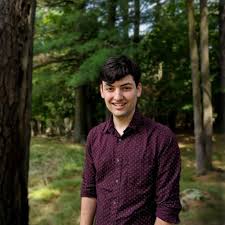
Over the past few months I have been working in a classroom at a local preschool. The position, while meaningful and rewarding, gave me a small taste of the anxiety that comes with being an educator in this current political climate. Like many others, I have inevitably thought about the worst-case scenario: what would I do to protect my children in the event of a school shooting? Ultimately, teachers should not have to grapple with these kinds of questions. It is not fair to ask teachers to be the first line of defense in the event of a shooting, and it is unacceptable that this aspect of our American culture has reached a point where many consider arming teachers in the classroom to be a more viable solution than enforcing reasonable gun control measures. Teachers already dedicate their lives to educate and provide an enriching and safe classroom environment for children—the prospect of dying should not be added to this already heavy undertaking. The Front Line is a meditation on my experiences of being an educator in an age where school violence is increasingly normalized.
Daniel Whitworth (b. 1996) is an award-winning composer and saxophonist dedicated to expanding the relevancy and accessibility of contemporary music. Frequently collaborating with dancers, visual artists, and actors, he aims to connect with audiences in unique ways and works to write and perform contemporary music that is both meaningful and relevant. One of his most recent projects, a recital entitled “Snapshots of America,” explored themes of politics and social justice in contemporary music and reflected Daniel’s passion for music with sociopolitical relevance.
Daniel is the recipient of several awards, most recently winning the 2019 Lake George Composition Competition where he will be a composer-in-residence during the 2019 season. His piece Ripples in Infinity won first prize in both the 2018 Frost International Composition Competition and the 2018 Wisconsin Alliance for Composers Composition Contest.
Daniel is working towards a Master’s Degree from Indiana University with a major in both Composition and Scoring for Film and Multimedia. He holds a Bachelor’s Degree from Lawrence Conservatory of Music.
Daniel Whitworth (b. 1996) is an award-winning composer and saxophonist dedicated to expanding the relevancy and accessibility of contemporary music. Frequently collaborating with dancers, visual artists, and actors, he aims to connect with audiences in unique ways and works to write and perform contemporary music that is both meaningful and relevant. One of his most recent projects, a recital entitled “Snapshots of America,” explored themes of politics and social justice in contemporary music and reflected Daniel’s passion for music with sociopolitical relevance.
Daniel is the recipient of several awards, most recently winning the 2019 Lake George Composition Competition where he will be a composer-in-residence during the 2019 season. His piece Ripples in Infinity won first prize in both the 2018 Frost International Composition Competition and the 2018 Wisconsin Alliance for Composers Composition Contest.
Daniel is working towards a Master’s Degree from Indiana University with a major in both Composition and Scoring for Film and Multimedia. He holds a Bachelor’s Degree from Lawrence Conservatory of Music.
VERDANT VIBES WINTER WARMER
November 15, 2019 at 8pm EDT
November 15, 2019 at 8pm EDT

Lean Back and Release was written in the winter of 2013 in New York City, and was first performed professionally on the 2014 Bang on a Can Marathon. Upon starting the work, I knew that I wanted to create a very gradual descent for the violin in range that drives the whole piece. I imagined the violinist gradually “leaning back” and finally “releasing” the distinct low register of the violin. Therefore, I also wrote two accompanying violin tracks in order to propel this descent. The two accompanying tracks were previously recorded by the violinist and subsequently processed electronically with delays and distortion.
Molly Joyce’s music has been described as one of “serene power” (New York Times), written to “superb effect” (The Wire), and “impassioned” (The Washington Post). Her works have been commissioned and performed by ensembles including the New World, New York Youth, Pittsburgh, Albany, and Milwaukee Symphony Orchestras, and the New Juilliard, Decoda, and Contemporaneous ensembles. Additionally, her work has been presented at TEDxMidAtlantic, Bang on a Can Marathon, Classical:NEXT, VisionIntoArt’s FERUS Festival, and featured in outlets such as Pitchfork, Red Bull Radio, WNYC’s New Sounds, Q2 Music, I Care If You Listen, and The Log Journal. Molly often sings and plays with her vintage toy organ, an instrument she bought on eBay and loves for how it engages with her disabled left hand. She has studied at The Juilliard School, Royal Conservatory in The Hague, and Yale School of Music. • mollyjoycemusic.com
Molly Joyce’s music has been described as one of “serene power” (New York Times), written to “superb effect” (The Wire), and “impassioned” (The Washington Post). Her works have been commissioned and performed by ensembles including the New World, New York Youth, Pittsburgh, Albany, and Milwaukee Symphony Orchestras, and the New Juilliard, Decoda, and Contemporaneous ensembles. Additionally, her work has been presented at TEDxMidAtlantic, Bang on a Can Marathon, Classical:NEXT, VisionIntoArt’s FERUS Festival, and featured in outlets such as Pitchfork, Red Bull Radio, WNYC’s New Sounds, Q2 Music, I Care If You Listen, and The Log Journal. Molly often sings and plays with her vintage toy organ, an instrument she bought on eBay and loves for how it engages with her disabled left hand. She has studied at The Juilliard School, Royal Conservatory in The Hague, and Yale School of Music. • mollyjoycemusic.com
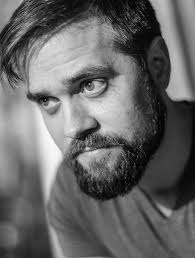
The Pequod is the whaling ship in Moby Dick. I read Moby Dick last summer for the first time while on the coast of Oregon. The immensity of the dark Pacific coast only made the book more real to me. While reading I contemplated the scope of the Pequod’s journey on the vast sea and the scope of Captain Ahab's futile quest to conquer the white whale, which led to the Pequod's inevitable demise. It was both beautiful and terrifying and this piece tries to capture the spirit of the novel. I use the electronics and strings in a way that at times are abrasive and grating in order to feel the immense weight of an unforgiving and impartial world, and other times the music emerges with moments of light simplicity out of the darker more sonically oppressive moments.
Described as “narratively limitless... peaceful, violent, and transcendent.” (Michael J. Cyrs, American Composers Forum), Brian Petuch's music inhabits extreme contrasts of reflection, celebration, and irreverence. His works have premiered in Carnegie Hall, Lincoln Center, 911 Memorial at Liberty Park, EMPAC, Constellation, MASS MoCA, and Joyce Theatre, and featured by Albany Symphony, the New York Youth Symphony, andPlay, Bang on a Can, Exceptet, Echo Chamber, Contemporaneous, Latitude 49, and Bearthoven.
The Jerome Fund recently awarded Petuch an Emerging Composer Grant for his piece 24 Hours. He’s also been a finalist for the ASCAP Foundation’s Morton Gould Young Composer Awards, a guest composer for the Albany Symphony’s American Music Festival, and a composition fellow at the Bang on a Can Summer Festival. He earned an MM in Composition at Mannes School of Music where he studied with Mario Davidovsky. He is currently writing an opera for chamber orchestra about Jackson Pollock. • brianpetuch.com
Described as “narratively limitless... peaceful, violent, and transcendent.” (Michael J. Cyrs, American Composers Forum), Brian Petuch's music inhabits extreme contrasts of reflection, celebration, and irreverence. His works have premiered in Carnegie Hall, Lincoln Center, 911 Memorial at Liberty Park, EMPAC, Constellation, MASS MoCA, and Joyce Theatre, and featured by Albany Symphony, the New York Youth Symphony, andPlay, Bang on a Can, Exceptet, Echo Chamber, Contemporaneous, Latitude 49, and Bearthoven.
The Jerome Fund recently awarded Petuch an Emerging Composer Grant for his piece 24 Hours. He’s also been a finalist for the ASCAP Foundation’s Morton Gould Young Composer Awards, a guest composer for the Albany Symphony’s American Music Festival, and a composition fellow at the Bang on a Can Summer Festival. He earned an MM in Composition at Mannes School of Music where he studied with Mario Davidovsky. He is currently writing an opera for chamber orchestra about Jackson Pollock. • brianpetuch.com
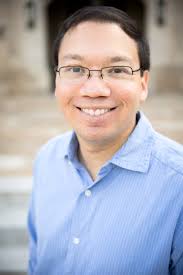
Lunation 1113 — A lunation is the cycle of the moon's phases, and they have been numbered since an arbitrary starting point in 1923. This work was composed during the 1113rd lunation (December 2012 - January 2013). The first movement, New Moon, opens mysteriously and sparsely, with sporadic percussion gestures suggesting the very dark and star-filled night sky that accompanies the beginning of the lunar cycle. The second movement, First Quarter, is rhythmically charged and builds in energy from beginning to end as the moon grows brighter. The third movement returns to the materials from the opening movement, but now they are bathed in a continuous bright glow from the full moon. This leads without pause into the final movement, Third Quarter, that returns to the rhythmically energized character of the second movement. As the light from the moon dwindles, so does the energy of the music, eventually fading away into silence.
Roger Zare has been praised for his “enviable grasp of orchestration” (New York Times) and for writing music with “formal clarity and an alluringly mercurial surface.” Currently based in Chicago, Zare serves as assistant professor of music composition and theory at Illinois State University. Often inspired by science, nature, and mythology, his works have been performed across the United States and on five continents by such musicians and ensembles as the American Composers Orchestra, the Minnesota Orchestra, Boston Musica Viva, the Donald Sinta Quartet, violinist Cho-Liang Lin, and clarinetist Alexander Fiterstein. An award winning composer, Zare has received recognition from ASCAP, BMI, the American Academy of Arts and Letters, Copland House, and many others. Zare holds degrees from the University of Michigan, the Peabody Conservatory, and the University of Southern California. His teachers include Bright Sheng, Michael Daugherty, Kristin Kuster, Paul Schoenfield, Christopher Theofanidis, and Derek Bermel. • rogerzare.com
Roger Zare has been praised for his “enviable grasp of orchestration” (New York Times) and for writing music with “formal clarity and an alluringly mercurial surface.” Currently based in Chicago, Zare serves as assistant professor of music composition and theory at Illinois State University. Often inspired by science, nature, and mythology, his works have been performed across the United States and on five continents by such musicians and ensembles as the American Composers Orchestra, the Minnesota Orchestra, Boston Musica Viva, the Donald Sinta Quartet, violinist Cho-Liang Lin, and clarinetist Alexander Fiterstein. An award winning composer, Zare has received recognition from ASCAP, BMI, the American Academy of Arts and Letters, Copland House, and many others. Zare holds degrees from the University of Michigan, the Peabody Conservatory, and the University of Southern California. His teachers include Bright Sheng, Michael Daugherty, Kristin Kuster, Paul Schoenfield, Christopher Theofanidis, and Derek Bermel. • rogerzare.com
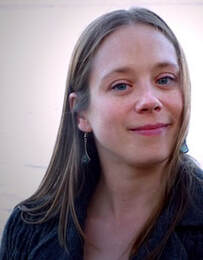
Étoiles de mer — In moving to Rhode Island, living near the ocean again has inspired my interest in the ecosystems of a new and intriguing environment. Sea stars, or starfish (étoiles de mer), have been around for 400 million to a billion years and some are regarded as keystone species, whose role as predators is critical to maintaining balance within the ecosystem. I was fascinated and inspired by their symmetrical bodies, prickly skins, regenerative capabilities, and fragility of existence in a world among modern humans.
Kirsten Volness's biography is available on the Artists page.
Kirsten Volness's biography is available on the Artists page.
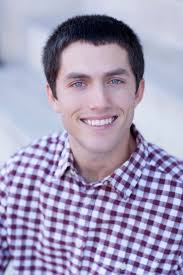
Engine Trouble for string quartet
Composer Scott Lee writes concert music infused with the visceral sounds of popular music. Lee has worked with the Baltimore Symphony Orchestra, the North Carolina Symphony, the Portland Symphony Orchestra, Symphony in C, the JACK Quartet, yMusic, the Da Capo Chamber Players, Deviant Septet, chatterbird, Verdant Vibes, and pop artist Ben Folds. Recent commissions include the Tanglewood Music Center, Aspen Music Festival, loadbang, the Baltimore Classical Guitar Society, and the Raleigh Civic Symphony.
Notable honors include a Charles Ives Scholarship from the American Academy of Arts and Letters, two ASCAP Morton Gould Young Composer Awards, winner of the Symphony In C Young Composer’s Competition, and the grand prize in the PARMA Student Composer Competition.
Active as a music educator, Lee was recently appointed Assistant Professor of Composition at the University of Florida School of Music. Lee earned a PhD in Composition at Duke University, mentored by Scott Lindroth and Steve Jaffe. Lee also holds degrees from the Peabody Institute and Vanderbilt University. • scottleemusic.net
Composer Scott Lee writes concert music infused with the visceral sounds of popular music. Lee has worked with the Baltimore Symphony Orchestra, the North Carolina Symphony, the Portland Symphony Orchestra, Symphony in C, the JACK Quartet, yMusic, the Da Capo Chamber Players, Deviant Septet, chatterbird, Verdant Vibes, and pop artist Ben Folds. Recent commissions include the Tanglewood Music Center, Aspen Music Festival, loadbang, the Baltimore Classical Guitar Society, and the Raleigh Civic Symphony.
Notable honors include a Charles Ives Scholarship from the American Academy of Arts and Letters, two ASCAP Morton Gould Young Composer Awards, winner of the Symphony In C Young Composer’s Competition, and the grand prize in the PARMA Student Composer Competition.
Active as a music educator, Lee was recently appointed Assistant Professor of Composition at the University of Florida School of Music. Lee earned a PhD in Composition at Duke University, mentored by Scott Lindroth and Steve Jaffe. Lee also holds degrees from the Peabody Institute and Vanderbilt University. • scottleemusic.net
VERDANT VIBES SPRING FESTIVAL
May 17, 2019 at 8pm EST
May 17, 2019 at 8pm EST
DIARY OF CLOUDS — The Box
A new collaboration between Verdant Vibes and Jessika Davis that is inspired by Oliver Miller’s short story, “The Box.” This piece is a visual and auditory exploration that depicts a person’s internal struggle with the inferred calamity of what a mysterious object could mean, all while juxtaposed by the undercurrent of the banalities of everyday life.
Jessika Davis is a Rhode Island based photographer, performer, dancer, and multi-media artist. She is an avid pattern seeker, whether it be via data, light, space, the vastness of humankind or the mere mundane. She received her BFA in Photography at Lesley University College of Art and Design (formerly Art Institute of Boston), for which she uses regularly in her career as a business process analyst. • jessika-davis.com
A new collaboration between Verdant Vibes and Jessika Davis that is inspired by Oliver Miller’s short story, “The Box.” This piece is a visual and auditory exploration that depicts a person’s internal struggle with the inferred calamity of what a mysterious object could mean, all while juxtaposed by the undercurrent of the banalities of everyday life.
Jessika Davis is a Rhode Island based photographer, performer, dancer, and multi-media artist. She is an avid pattern seeker, whether it be via data, light, space, the vastness of humankind or the mere mundane. She received her BFA in Photography at Lesley University College of Art and Design (formerly Art Institute of Boston), for which she uses regularly in her career as a business process analyst. • jessika-davis.com
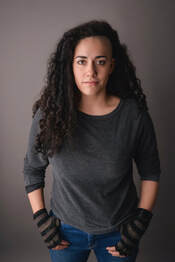
I wrote Phases during a period of very deep depression. I was on a three-month artist residency in the far North of Iceland during the dead of winter, and things were not going as I had planned. The lack of daylight was disorienting and left me feeling constantly exhausted, and the weather was not cooperating with what I had proposed to do. I was tired of putting notes on a page, frustrated with sculpture, and unable to acquire the materials I needed. However, through this depression and darkness, I discovered that I could latch onto what little color and light was available and make it speak. “Phases” speaks to my own journey of learning to open myself up to new possibilities, but it also pays tribute to the transformative power of perspective.
Gabrielle Cerberville (b. 1991 in Sleepy Hollow, NY) is a curious American composer, multi-media artist, and pianist. She writes in a highly flexible style that is at once familiar and alien, and her work regularly blends the lines between disciplines and discrete art forms. Her music explores such themes as landscape, disappearing, insecurity, resolve, and image. She holds a Bachelor of Music from Butler University in composition and theory, and has studied composition with Drs. Frank Felice and Michael Schelle. Her works have been featured across the US and Europe. She has been honored as an artist in residence at Listhus in Iceland and Arts Letters and Numbers in New York, and has been invited to attend several festivals, including highSCORE, SPLICE, Skammdegi, and A! Festival. Gabrielle currently lives and works in Indianapolis. • gabriellecerberville.com
Gabrielle Cerberville (b. 1991 in Sleepy Hollow, NY) is a curious American composer, multi-media artist, and pianist. She writes in a highly flexible style that is at once familiar and alien, and her work regularly blends the lines between disciplines and discrete art forms. Her music explores such themes as landscape, disappearing, insecurity, resolve, and image. She holds a Bachelor of Music from Butler University in composition and theory, and has studied composition with Drs. Frank Felice and Michael Schelle. Her works have been featured across the US and Europe. She has been honored as an artist in residence at Listhus in Iceland and Arts Letters and Numbers in New York, and has been invited to attend several festivals, including highSCORE, SPLICE, Skammdegi, and A! Festival. Gabrielle currently lives and works in Indianapolis. • gabriellecerberville.com
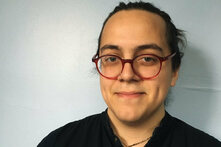
Placing Ceremony engages with elements of diasporic identity. From expanding harmonic and spatial structures, the piece works to both metaphorically and physically displace/replace sound. Parallels exist between the open instrumentation and the multifaceted experience of colonized peoples in the process to reclaiming heritage.
inti figgis-vizueta (she/her) is a queer Andinx experimental composer based in Brooklyn, NY. She writes identity-focused musics, often channeling story-telling and the manifestation of non-hegemonic voices in concert spaces. inti works to create transparent, self-contained musical processes through which melodic and timbreal interaction blooms and consumes itself. inti studied with Felipe Lara.
inti has received numerous awards, most recently the 2019 Hildegard Competition from National Sawdust, the 2019 Underwood New Music Readings featuring the American Composer's Orchestra, and the 2019 Mizzou International Composer's Festival featuring Alarm Will Sound. She's won calls for scores for organizations & festivals such as West Cork Chamber Music Festival, Verdant Vibes, N/A Ensemble, UnTwelve, Baltimore Choral Arts, and 113 Collective. Her music has also been played by ensembles such as loadbang, PUBLIQuartet, Hypercube, RTE Contempo String Quartet, and Balance Campaign as well as the Shenandoah Valley Youth Orchestra and SJSU Wind Ensemble. She was featured at the New Music Gathering as a panelist in 2017 and as a featured composer in 2018 as well as at the New Latin Wave Festival 2018, curated by Angélica Negrón. inti actively freelances with recent commissions including clarinetist Gleb Kanasevich, trumpeter Kate Amrine, countertenor Luke Paulino, and the duo Mazumal (Felicia Chen & Olivia J. Harris).
When not composing, inti works as the Director of Inclusion at the Boulanger Initiative and as a curator for Score Follower. • inticomposes.com
inti figgis-vizueta (she/her) is a queer Andinx experimental composer based in Brooklyn, NY. She writes identity-focused musics, often channeling story-telling and the manifestation of non-hegemonic voices in concert spaces. inti works to create transparent, self-contained musical processes through which melodic and timbreal interaction blooms and consumes itself. inti studied with Felipe Lara.
inti has received numerous awards, most recently the 2019 Hildegard Competition from National Sawdust, the 2019 Underwood New Music Readings featuring the American Composer's Orchestra, and the 2019 Mizzou International Composer's Festival featuring Alarm Will Sound. She's won calls for scores for organizations & festivals such as West Cork Chamber Music Festival, Verdant Vibes, N/A Ensemble, UnTwelve, Baltimore Choral Arts, and 113 Collective. Her music has also been played by ensembles such as loadbang, PUBLIQuartet, Hypercube, RTE Contempo String Quartet, and Balance Campaign as well as the Shenandoah Valley Youth Orchestra and SJSU Wind Ensemble. She was featured at the New Music Gathering as a panelist in 2017 and as a featured composer in 2018 as well as at the New Latin Wave Festival 2018, curated by Angélica Negrón. inti actively freelances with recent commissions including clarinetist Gleb Kanasevich, trumpeter Kate Amrine, countertenor Luke Paulino, and the duo Mazumal (Felicia Chen & Olivia J. Harris).
When not composing, inti works as the Director of Inclusion at the Boulanger Initiative and as a curator for Score Follower. • inticomposes.com
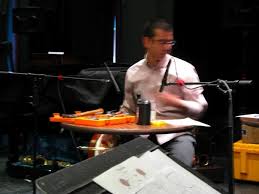
Replication is a series of works that invite instrumental musicians to engage with and articulate their instrument's physical structure by creating a sculpture out of everyday, found objects that mimics its architecture. This process can be completed quickly in a formal setting or over time as a performed installation.
Michael Boyd, Associate Professor of Music at Chatham University, is a composer, scholar, and experimental improviser. His music embraces experimental practices such as installation, multimedia, and performance art, and has been performed in a variety of venues throughout the United States and abroad. His user-driven installation Confessional recently won the 2016 FETA Prize in Sound Art. Boyd has published articles in Perspectives of New Music, Tempo, and Notes. He is active in his community, currently serving a second elected term on the Wilkins Township Board of Commissioners. An active cyclist, Boyd often bikes to work and periodically competes in mountain bike races (and has the scars to prove the latter…). • michaelrboyd.com
Michael Boyd, Associate Professor of Music at Chatham University, is a composer, scholar, and experimental improviser. His music embraces experimental practices such as installation, multimedia, and performance art, and has been performed in a variety of venues throughout the United States and abroad. His user-driven installation Confessional recently won the 2016 FETA Prize in Sound Art. Boyd has published articles in Perspectives of New Music, Tempo, and Notes. He is active in his community, currently serving a second elected term on the Wilkins Township Board of Commissioners. An active cyclist, Boyd often bikes to work and periodically competes in mountain bike races (and has the scars to prove the latter…). • michaelrboyd.com
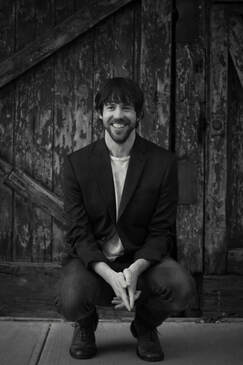
In Celestial Sphere, eight different marimba parts are layered on top of each other to create an incredible composite of sound and rhythm.
Brooklyn-based composer, instrumentalist and producer David Crowell brings a “singular vision that transcends genre” (Exclaim) to diverse forms of composed and improvisational music, and has been praised for compositional work that is "notable for its crystalline sonic beauty" (Boston Globe).
David’s music has been performed at the Lucerne Festival Spotlights Series, Mizzou New Music Festival, Library of Congress, London Jazz Festival, MATA Festival, Bang on a Can Summer Marathon, Da Camera Society, Walled City Festival, Crossing Brooklyn Ferry Festival, Cortona Sessions for New Music, American Music Festival, Tribeca New Music Festival, Festival for New American Music, Composers Now Festival, and the Festival Internacional Chihuahua, by groups such as the JACK Quartet, Alarm Will Sound, New Morse Code, NOW Ensemble, and Sandbox Percussion. His work has also been performed by noted international performers Mak Grgic, Brian Archinal, Dan Lippel and Ian Rosenbaum. • davidcrowellmusic.com
Brooklyn-based composer, instrumentalist and producer David Crowell brings a “singular vision that transcends genre” (Exclaim) to diverse forms of composed and improvisational music, and has been praised for compositional work that is "notable for its crystalline sonic beauty" (Boston Globe).
David’s music has been performed at the Lucerne Festival Spotlights Series, Mizzou New Music Festival, Library of Congress, London Jazz Festival, MATA Festival, Bang on a Can Summer Marathon, Da Camera Society, Walled City Festival, Crossing Brooklyn Ferry Festival, Cortona Sessions for New Music, American Music Festival, Tribeca New Music Festival, Festival for New American Music, Composers Now Festival, and the Festival Internacional Chihuahua, by groups such as the JACK Quartet, Alarm Will Sound, New Morse Code, NOW Ensemble, and Sandbox Percussion. His work has also been performed by noted international performers Mak Grgic, Brian Archinal, Dan Lippel and Ian Rosenbaum. • davidcrowellmusic.com

Astilbe is a work that evokes the complexities of love and longing. Written for a string quintet, the focal point is a violin solo that evokes an elegant performance juxtaposing a gentle feel with more assertive and tempestuous gestures.
Hollie Buhagiar is a award-winning Gibraltarian composer based in London who specialises in crafting bespoke scores for film, TV and Games. She has worked on a plethora of projects for both short and feature length films alongside Grammy and Academy Award winning engineers in the finest studios across London. Throughout her career she has been hailed for her unique and varied sonic palette as well as her ability to create fascinating scores that approach traditional composition from a new and exciting perspective. • holliebuhagiar.com
Hollie Buhagiar is a award-winning Gibraltarian composer based in London who specialises in crafting bespoke scores for film, TV and Games. She has worked on a plethora of projects for both short and feature length films alongside Grammy and Academy Award winning engineers in the finest studios across London. Throughout her career she has been hailed for her unique and varied sonic palette as well as her ability to create fascinating scores that approach traditional composition from a new and exciting perspective. • holliebuhagiar.com
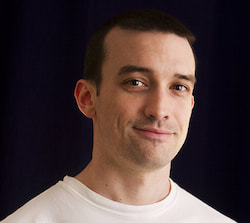
on a better filtering algorithm
Praised by the New York Times as "imaginative...like, say, a Martian dance party," Ryan Carter's music has been commissioned by Carnegie Hall, the National Flute Association, the MATA Festival, the Metropolis Ensemble, Present Music, The Milwaukee Children's Choir, and the Calder Quartet, with support from the National Endowment for the Arts, the Jerome Foundation, and the American Composers Forum. Ryan has collaborated with the Berkeley Symphony, the International Contemporary Ensemble, the Nieuw Ensemble, the JACK Quartet, the Princeton Laptop Orchestra, and many others. Ryan holds degrees from Oberlin Conservatory (BMus), Stony Brook University (MA), and New York University (PhD). • ryancarter.org
Praised by the New York Times as "imaginative...like, say, a Martian dance party," Ryan Carter's music has been commissioned by Carnegie Hall, the National Flute Association, the MATA Festival, the Metropolis Ensemble, Present Music, The Milwaukee Children's Choir, and the Calder Quartet, with support from the National Endowment for the Arts, the Jerome Foundation, and the American Composers Forum. Ryan has collaborated with the Berkeley Symphony, the International Contemporary Ensemble, the Nieuw Ensemble, the JACK Quartet, the Princeton Laptop Orchestra, and many others. Ryan holds degrees from Oberlin Conservatory (BMus), Stony Brook University (MA), and New York University (PhD). • ryancarter.org
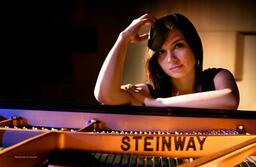
As a composer I love to incorporate my latin roots in my compositions. I usually come up with different rhythmic ideas before I write the piece, and then I put them together to form an ostinato rhythm that you can hear throughout the composition. Most of the music I write tend to have a story behind it, Danzas cautivas tells a story about three guys trying to win a girl’s heart on the dance floor. The piece has several dances in which each guy shows off their moves and gets a chance to dance with the girl to impress her. At the end of the piece it becomes a dance off between the three of them.
Edna Alejandra Longoria (b.1988) is a Latin American composer born in Mcallen, Texas and raised in Reynosa, Tamaulipas, México. Edna obtained a Masters Degree in Music Composition at the Bob Cole Conservatory of Music at California State University in Long Beach, and a Bachelors Degree in Music Composition from the University of Texas at San Antonio. She has had the privilege of studying composition with Dr. Alan Shockley, Dr. Carolyn Bremer, Dr. Adriana Verdie, Perry LaMarca, James Syler, Dr. James Balentine, and Dr. David Heuser.
Edna has had the opportunity to write pieces and participate in composition workshops with several professional ensembles and musicians such as the Kronos Quartet, Elixir Piano Trio, Iwona Glinka, Vicki Ray and Eric Clark from the E.A.R Unit, and Los Angeles Percussion Quartet.
Edna enjoys incorporating her latin roots into her music and mix it with contemporary techniques. • ednaalejandralongoria.com
Edna Alejandra Longoria (b.1988) is a Latin American composer born in Mcallen, Texas and raised in Reynosa, Tamaulipas, México. Edna obtained a Masters Degree in Music Composition at the Bob Cole Conservatory of Music at California State University in Long Beach, and a Bachelors Degree in Music Composition from the University of Texas at San Antonio. She has had the privilege of studying composition with Dr. Alan Shockley, Dr. Carolyn Bremer, Dr. Adriana Verdie, Perry LaMarca, James Syler, Dr. James Balentine, and Dr. David Heuser.
Edna has had the opportunity to write pieces and participate in composition workshops with several professional ensembles and musicians such as the Kronos Quartet, Elixir Piano Trio, Iwona Glinka, Vicki Ray and Eric Clark from the E.A.R Unit, and Los Angeles Percussion Quartet.
Edna enjoys incorporating her latin roots into her music and mix it with contemporary techniques. • ednaalejandralongoria.com
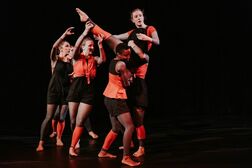
Founded by Merli V. Guerra and Kimberleigh A. Holman in Boston in 2010, Luminarium Dance Company is an award-winning modern and contemporary dance company that is regularly hailed for its unique combination of dance and light.
Luminarium® is proud to present professional annual dance productions alongside its yearly community outreach programming. The company's 24-Hour ChoreoFest, Cultural Community Outreach Project, Arts in Action Project, and DANCE+ Series, challenge the limits of dance while enriching community: Giving choreographers a creative overnight outlet; using dance to highlight local historical and cultural landmarks; and offering underserved youth the chance to merge dance with other fields such as science, music, technology, and light.
Luminarium is more than a dance company. It was born as a new outlet for performing arts. It is a think tank, a museum, a gallery for contemporary dance and for contemporary ideas. Luminarium is a space to merge dance with art, projection, video, film, lighting design, and music, and we welcome you to join the experience. • luminariumdance.org
Luminarium® is proud to present professional annual dance productions alongside its yearly community outreach programming. The company's 24-Hour ChoreoFest, Cultural Community Outreach Project, Arts in Action Project, and DANCE+ Series, challenge the limits of dance while enriching community: Giving choreographers a creative overnight outlet; using dance to highlight local historical and cultural landmarks; and offering underserved youth the chance to merge dance with other fields such as science, music, technology, and light.
Luminarium is more than a dance company. It was born as a new outlet for performing arts. It is a think tank, a museum, a gallery for contemporary dance and for contemporary ideas. Luminarium is a space to merge dance with art, projection, video, film, lighting design, and music, and we welcome you to join the experience. • luminariumdance.org

Kimberleigh A. Holman is an artist working interdisciplinarily in dance, theatre and design. Her work gravitates to the exploration of human social interaction and behavior, both real and fictitious, miniscule instances or broad patterns, through comedic, dark, sensory or abstract narrative. As a mover and maker, one of her biggest considerations is authenticity; she hopes to enable those performing her work to find genuine ways to be present in the performance space and hopes to inspire viewers to react in genuinely felt ways of their own. Kim excitedly creates work around these principles for Luminarium, where she passionately leads the company’s Arts in Action Project; an annual outreach program that strives to make social impact through youth arts experiences. Besides nearly 80 performances with Luminarium across New England, Kim has been invited to choreograph for commercials and film, dozens of theatrical productions across Boston, and to bring her work to stages ranging from public library basements to the globally renowned APAP conference in NYC. Kim is frequently hired as a guest artist at Boston-area universities, speaks on her career as an arts entrepreneur, and serves on multiple boards of directors. Some favorite recent projects include collaborating on a video/performance piece by Adara Meyers, which debuted at the Boston Center for the Arts in early 2018, and a research and performance project where Holman traveled up the Eastern Seaboard, performing in public locations in each of the fifteen East Coast states. Kim earned her MFA in Interdisciplinary Arts from Goddard College. • kaholman.com
VERDANT VIBES BENEFIT CONCERT
February 9, 2019 at 8pm EST
February 9, 2019 at 8pm EST
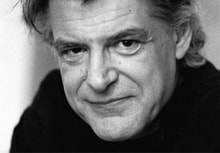
Graffitis for solo percussion
Georges Aperghis composes stage works: operas and music theatre pieces. The texts he chooses often belong to the major classical and contemporary repertoire (Aeschylus, Leonardo da Vinci, Charles Perrault, Georges Courteline, Heiner Müller, Claude Lévy-Strauss, François Regnault, Philippe Minyana, Alain Badiou, etc.). He also invents his own language that is built out of phonemes exploding into multiple meanings. His instrumental works are regularly inspired by the personalities of the performers and ensembles he meets; these successive human astonishments fuel his restless composing. Georges Aperghis was born in Athens in 1945. He lives and works in Paris since 1963. • aperghis.com
Georges Aperghis composes stage works: operas and music theatre pieces. The texts he chooses often belong to the major classical and contemporary repertoire (Aeschylus, Leonardo da Vinci, Charles Perrault, Georges Courteline, Heiner Müller, Claude Lévy-Strauss, François Regnault, Philippe Minyana, Alain Badiou, etc.). He also invents his own language that is built out of phonemes exploding into multiple meanings. His instrumental works are regularly inspired by the personalities of the performers and ensembles he meets; these successive human astonishments fuel his restless composing. Georges Aperghis was born in Athens in 1945. He lives and works in Paris since 1963. • aperghis.com
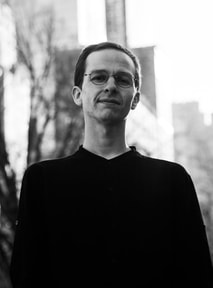
Inspiration for Under Hard Light came after a visit to Palestine in August 2017 with VOICES 21C, working with and performing for the Amwaj Choir, containing grade school students from Hebron and Bethlehem. Many of us keep in contact, and one student who was away when we were there (and never met us), added me on social media. He often sends me audio clips of his singing through Facebook messenger with no context. I was particularly inspired by one of these audio messages, listening to it again and again for two straight weeks, eventually improvising over it. A friend revealed to me the source of this song—a verse of A Huwa da illi saar, essentially an Egyptian patriotic song sung in the 1920s, when the British were in control over a large part of the Middle East. I was encouraged to improvise further given this context of the song. A particularly inspiring verse is sung later on, and due to it’s subject I feel a strong connection with this boy I have only ever met through song, and also between the struggle and resilience of people in the face of corrupt power in both our countries.
Michael Genese, tenor, violinist, composer, and educator, teaches elementary general music and chorus in the New Bedford Public School system, along with violin and piano lessons on the New England South Coast.
Genese sings as an active Choral Scholar at the historic Trinity Church, Newport, as well as founding member and head of communications for the internationally acclaimed Social Justice choir, VOICES 21C. His undergraduate degree is from the University of Rhode Island in Music Education and Vocal Performance. Michael will soon start his master’s degree in composition, and takes great enjoyment fostering connections with others through his many artistic perspectives, as often and presently as possible."
Michael Genese, tenor, violinist, composer, and educator, teaches elementary general music and chorus in the New Bedford Public School system, along with violin and piano lessons on the New England South Coast.
Genese sings as an active Choral Scholar at the historic Trinity Church, Newport, as well as founding member and head of communications for the internationally acclaimed Social Justice choir, VOICES 21C. His undergraduate degree is from the University of Rhode Island in Music Education and Vocal Performance. Michael will soon start his master’s degree in composition, and takes great enjoyment fostering connections with others through his many artistic perspectives, as often and presently as possible."
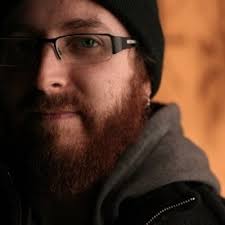
I was a stranger and you gave me no welcome (2018) is a response to US immigration policies, especially the practice of separating children from families seeking asylum in the United States. The work opens with layered loops exploring the high registers of the bass, to which is added low resonant chords to build a shifting, full-register backdrop to a searing, somber chant-like melody. As with other works in my Monument series, this work is written as a monument in memory and honor of victims of unjust violence.
Scott Blasco is a composer from eastern Washington, where he teaches at Washington State University. A composer of both electronic and acoustic music, he uses his work to explore interests in liturgy and theology, time and repetition, and simplicity and limited aleatory. Beyond music, Scott enjoys home brewing, a good Old Fashioned, building things, and attempting to converse with his wife while negotiating the carpet of Legos laid by his two young children. • scottblasco.com
Scott Blasco is a composer from eastern Washington, where he teaches at Washington State University. A composer of both electronic and acoustic music, he uses his work to explore interests in liturgy and theology, time and repetition, and simplicity and limited aleatory. Beyond music, Scott enjoys home brewing, a good Old Fashioned, building things, and attempting to converse with his wife while negotiating the carpet of Legos laid by his two young children. • scottblasco.com
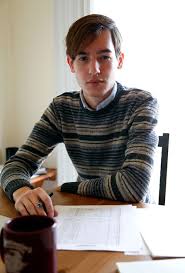
soliloquy was written as an experiment in expanding the performance capabilities of electric guitar through the use of live digital signal processing. This piece borrows idioms from the post-rock and shoegaze genres and recontextualizes those ideas into a structural framework where emphasis is placed on the gradual expansion, contraction, and degradation of the sound world.
Douglas Osmun is a composer of acoustic and electronic music currently residing in Columbia, MO, and whose acoustic works are often informed by electronic compositional theories and techniques. His music exists as an exploration of the boundaries of perception and fragility in order to create captivatingly intimate sonic environments. Also concerned with the physicality of sound production and spatialization, he approaches the musical ideas of his pieces as spatial objects to be sculpted and arranged.
Osmun’s music has been heard at the Mizzou International Composers Festival, the BGSU Graduate Conference in Music, the SEAMUS National Conference, the SCI Inc. National Conference, NYCEMF, and the Big Sky Documentary Film Festival. Recent projects of his have included new works for the St. Louis Symphony Orchestra, SPLICE Ensemble, and Alarm Will Sound. Osmun holds degrees from Western Michigan University (B.M. in Music Composition), and the University of Missouri (M.M. in Composition). • douglasosmun.com
Douglas Osmun is a composer of acoustic and electronic music currently residing in Columbia, MO, and whose acoustic works are often informed by electronic compositional theories and techniques. His music exists as an exploration of the boundaries of perception and fragility in order to create captivatingly intimate sonic environments. Also concerned with the physicality of sound production and spatialization, he approaches the musical ideas of his pieces as spatial objects to be sculpted and arranged.
Osmun’s music has been heard at the Mizzou International Composers Festival, the BGSU Graduate Conference in Music, the SEAMUS National Conference, the SCI Inc. National Conference, NYCEMF, and the Big Sky Documentary Film Festival. Recent projects of his have included new works for the St. Louis Symphony Orchestra, SPLICE Ensemble, and Alarm Will Sound. Osmun holds degrees from Western Michigan University (B.M. in Music Composition), and the University of Missouri (M.M. in Composition). • douglasosmun.com
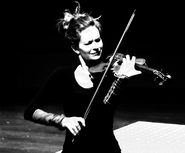
Moonbeam Medicine Loop for violin/voice
Roseminna Watson's biography is available on the Artists page.
Roseminna Watson's biography is available on the Artists page.
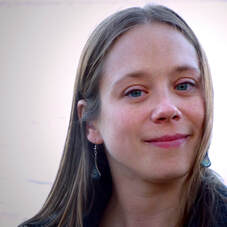
Lush Escapist Dream comes from a place of uncertainty, bad news, friends having trouble, and a collective feeling of wanting to escape present difficulties. Commissioned by and written for Piero Guimaraes, I wanted to celebrate the special relationships we both have with our mothers in helping us get through life. Their wisdom and support is channeled through Brazilian/Portuguese proverbs that offer the following advice: Não há bem que sempre dure, nem mal que nunca acabe. / There’s no good that lasts forever nor evil that never ends and Quem não tem cão, caça com gato. / If you don’t have a dog, you hunt with a cat. Cats are better hunters anyway, and this too shall pass.
Kirsten Volness's biography is available on the Artists page.
Kirsten Volness's biography is available on the Artists page.
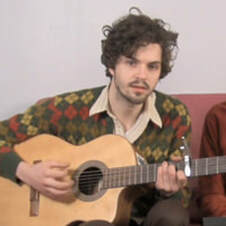
Polytempic Figures for mixed quintet disconnects the ensemble from the musical grid by tethering it to the metronome. Each performer plays the same material, adjusted for register, at a unique tempo. Musical time yawns, then stretches.
Brendan Glasson (b. 1985, Providence RI) works with sound, video, text, and performance. He lives and works in Oakland, CA.
Brendan has performed and shown work at Centre Pompidou-Metz, the RISD Museum, the MUDAM Museum, Pro Arts Gallery, and more.
Brendan Glasson (b. 1985, Providence RI) works with sound, video, text, and performance. He lives and works in Oakland, CA.
Brendan has performed and shown work at Centre Pompidou-Metz, the RISD Museum, the MUDAM Museum, Pro Arts Gallery, and more.
VERDANT VIBES WINTER WARMER
December 14 + 16, 2018
December 14 + 16, 2018

Tapestry is comprised of four sections--Warp, Weft, Batten, Weave--of indeterminate length. Any instrument capable of producing a specific pitch may be included in the ensemble.
Matthew Azevedo is a musician, acoustician, mastering engineer and educator living in Providence.
Matthew Azevedo is a musician, acoustician, mastering engineer and educator living in Providence.
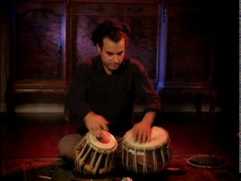
[[[a nation defiled]]] for electro-acoustic quintet and live video is a death and birth of sound. a progression from the void to clarity. a metaphor for a hope that we will progress together. ORIGIN late Middle English (as a noun): from Latin progressus ‘an advance,’ from the verb progredi, from pro- ‘forward’ + gradi ‘to walk.’ ORIGIN Middle English: from Old French change (noun), changer (verb), from late Latin cambiare, from Latin cambire ‘barter,’ probably of Celtic origin. performance.
joshua michael carro (b. 1982 - ) is a versatile multimedia artist, percussionist, sound designer, producer, teacher, and composer based in Los Angeles, CA. During his MFA studies from 2011-2013 at California Institute of the Arts, carro’s main focuses were North Indian Classical Tabla and electro-acoustic composition/performance in which he studied under the legendary Pandit Swapan Chaudhuri, Randy Gloss, Ulrich Krieger, and Wolfgang von Schweinitz. carro's post graduate work has continued to develop new methods of composing for instruments of any kind with the extension of electro-acoustic and visual elements that have contributed to the evolution of sound, musical composition, and design. Aside from his research in music technology and social artistic behavior, carro has performed in countless spaces and recordings across the U.S., Canada, and Europe with sound work performances and commissions by The Futurist Intoners in The Cleveland Museum of Art, Singapore Art Science Center, Laurie Anderson, Rat Bastard, Ehnahre, Blood Oath, UC Berkeley Cellist Ensemble, Wild Rumpus, What’s Next? Ensemble, Now Hear Ensemble, Pianist Vicki Ray, and Harpist Susan Allen. Besides performance and composition carro’s sound design and artistic consultation work for film and television have been published, recorded and licensed at Warner Bros., Capitol Records, T.V. Stand Studios, XI Records, H.L.M., Somehow Recordings, Vent, and Ephem-Aural. His recent awards include Radiophrenia Call for Radio Works (Glasgow,UK) 2017, Musinfo Call for Multimedia Works (Bourges,France) 2017, James Tenney New Mexico Contemporary Ensemble Call for Scores Post Card Series 2017, Fresno State New Music Ensemble Call for Scores 2017, and Syros Sound Residency in Athens, Greece 2016. • joshuacarro.com
joshua michael carro (b. 1982 - ) is a versatile multimedia artist, percussionist, sound designer, producer, teacher, and composer based in Los Angeles, CA. During his MFA studies from 2011-2013 at California Institute of the Arts, carro’s main focuses were North Indian Classical Tabla and electro-acoustic composition/performance in which he studied under the legendary Pandit Swapan Chaudhuri, Randy Gloss, Ulrich Krieger, and Wolfgang von Schweinitz. carro's post graduate work has continued to develop new methods of composing for instruments of any kind with the extension of electro-acoustic and visual elements that have contributed to the evolution of sound, musical composition, and design. Aside from his research in music technology and social artistic behavior, carro has performed in countless spaces and recordings across the U.S., Canada, and Europe with sound work performances and commissions by The Futurist Intoners in The Cleveland Museum of Art, Singapore Art Science Center, Laurie Anderson, Rat Bastard, Ehnahre, Blood Oath, UC Berkeley Cellist Ensemble, Wild Rumpus, What’s Next? Ensemble, Now Hear Ensemble, Pianist Vicki Ray, and Harpist Susan Allen. Besides performance and composition carro’s sound design and artistic consultation work for film and television have been published, recorded and licensed at Warner Bros., Capitol Records, T.V. Stand Studios, XI Records, H.L.M., Somehow Recordings, Vent, and Ephem-Aural. His recent awards include Radiophrenia Call for Radio Works (Glasgow,UK) 2017, Musinfo Call for Multimedia Works (Bourges,France) 2017, James Tenney New Mexico Contemporary Ensemble Call for Scores Post Card Series 2017, Fresno State New Music Ensemble Call for Scores 2017, and Syros Sound Residency in Athens, Greece 2016. • joshuacarro.com
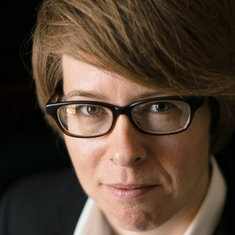
“The Masculine” is a song from a larger piece, Women Who Kill, and receives its title from scholar Lizzie Seal’s designation referring to lesbians who were suspected of committing murder at the turn of the century. Often referred to as “mannish,” women who engaged in lesbian behaviors were considered mentally ill and often their murderous acts were attributed to their sexual “inversion.” Problematic by today’s mores, my song attempts to give voice to the troubled, but also misunderstood (and greatly sensationalized) Alice Mitchell who murdered her lover, Freda Ward, who had rejected her, in 1892. The song sets text taken from letters they wrote to one another in 1891–92 and from Mitchell’s testimony in court when she was tried for murder. In this musical setting, I have used a traditional ground bass structure to accompany the words of Alice, to portray the remorse she perhaps felt after murdering Freda.
Sing, I have a rose for you.
If it’s not wither’d by the next time I see you,
I will give it to you.
Sweet love, you know that I love you better.
I know you are so jealous, but I am true to you.
I have stood it long enough.
Be true to me.
Sing, and I won’t do anything.
I love you now and always will,
But I’m forbidden to speak to you.
I would have devoted my whole life to making her happy,
But she broke my heart.
I could not bear the thought of her with others,
I resolved to kill her,
I wanted her to die loving me.
Victoria Malawey (b. 1977) is a composer, singer-songwriter, and scholar based in the Twin Cities. She teaches courses in music theory, composition, and gender and music at Macalester College in St. Paul, Minnesota. Malawey has written music for mixed chamber and vocal ensembles, which have been performed at venues throughout the U.S. and internationally. Her song cycle for soprano, clarinet, and piano, Chansons Innocentes, was the 2017 winner of the International Alliance of Women in Music New Music Competition Patsy Lu Prize, and her Miniatures for solo piano was the second place winner of the 2016 New Ariel Piano Composition Competition. Jeanné Inc has published several of her compositions for woodwinds. Malawey studied composition with Robert Lombardo at Chicago Musical College at Roosevelt University and Sven-David Sandström at the Jacobs School of Music at Indiana University. • victoriamalawey.com
Sing, I have a rose for you.
If it’s not wither’d by the next time I see you,
I will give it to you.
Sweet love, you know that I love you better.
I know you are so jealous, but I am true to you.
I have stood it long enough.
Be true to me.
Sing, and I won’t do anything.
I love you now and always will,
But I’m forbidden to speak to you.
I would have devoted my whole life to making her happy,
But she broke my heart.
I could not bear the thought of her with others,
I resolved to kill her,
I wanted her to die loving me.
Victoria Malawey (b. 1977) is a composer, singer-songwriter, and scholar based in the Twin Cities. She teaches courses in music theory, composition, and gender and music at Macalester College in St. Paul, Minnesota. Malawey has written music for mixed chamber and vocal ensembles, which have been performed at venues throughout the U.S. and internationally. Her song cycle for soprano, clarinet, and piano, Chansons Innocentes, was the 2017 winner of the International Alliance of Women in Music New Music Competition Patsy Lu Prize, and her Miniatures for solo piano was the second place winner of the 2016 New Ariel Piano Composition Competition. Jeanné Inc has published several of her compositions for woodwinds. Malawey studied composition with Robert Lombardo at Chicago Musical College at Roosevelt University and Sven-David Sandström at the Jacobs School of Music at Indiana University. • victoriamalawey.com
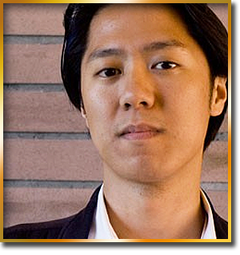
The Way Things Work, for violin and cello, takes its title from a poem by Jorie Graham, who suggests that the way things work “is by admitting / or opening away. … by solution, / resistance lessened or / increased and taken / advantage of. … The way things work / is that eventually / something catches.” It seems to me the practice of composition—like, I imagine, any creative endeavour; or, indeed, any worthwhile endeavour, creative or otherwise—follows these same prescriptions. But there’s more: there’s intention: “I believe in you, / cylinder lock, pully… your head is the horizon to / my hand.” The Way Things Work was composed as my wife, Karen, entered the third trimester of her pregnancy. During this time, considering the way things work has suddenly felt a profound responsibility.
Patrick Castillo leads a multifaceted career as a composer, performer, writer, and educator. His music has been described as “restrained and reflective but brimming with a variety of texture and sound that draws you into its world” (I Care If You Listen) and has been presented at festivals and venues throughout the United States and internationally, including the Chamber Music Society of Lincoln Center, Spoleto Festival USA, June in Buffalo, the Santa Fe New Music Festival, Birdfoot Festival, Queens New Music Festival, Hot Air Music Festival, National Sawdust, Interlochen Center for the Arts, Bavarian Academy of Music (Munich), the Nuremberg Museum of Contemporary Art, and the Havana Contemporary Music Festival. From 2010 to 2013, he served as Senior Director of Artistic Planning of the Saint Paul Chamber Orchestra. He is founding composer and managing director of Third Sound; in 2016, he was appointed Executive Director of Hotel Elefant. • patrickcastillo.com
Patrick Castillo leads a multifaceted career as a composer, performer, writer, and educator. His music has been described as “restrained and reflective but brimming with a variety of texture and sound that draws you into its world” (I Care If You Listen) and has been presented at festivals and venues throughout the United States and internationally, including the Chamber Music Society of Lincoln Center, Spoleto Festival USA, June in Buffalo, the Santa Fe New Music Festival, Birdfoot Festival, Queens New Music Festival, Hot Air Music Festival, National Sawdust, Interlochen Center for the Arts, Bavarian Academy of Music (Munich), the Nuremberg Museum of Contemporary Art, and the Havana Contemporary Music Festival. From 2010 to 2013, he served as Senior Director of Artistic Planning of the Saint Paul Chamber Orchestra. He is founding composer and managing director of Third Sound; in 2016, he was appointed Executive Director of Hotel Elefant. • patrickcastillo.com
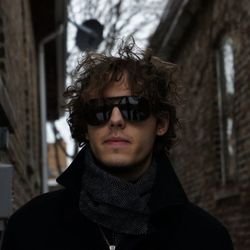
Voluble Breath--The opening introduces a dark, and grim landscape. The player goes through wild & extroverted shouts to almost audible whispers. Elements heard previously continue while a driving motion persists throughout the piece.
Colombian-American composer Ian A. Frederick won the 2014 National Prize of Music in Composition by the Ministry of Culture of Colombia and the 1st prize at the Festival Internacional UniMúsica competition (Colombia). His music has been performed by the National Symphony Orchestra of Colombia, Manolov String Quartet (Colombia) and several solo artists. Performances of his work have taken place in Australia, Austria, Colombia, Panama, Poland, & in the United States. He holds degrees from Corpas University (Colombia), Ohio University, and is pursuing a doctorate at the University of Michigan studying with Michael Daugherty. • ianfred.com
Colombian-American composer Ian A. Frederick won the 2014 National Prize of Music in Composition by the Ministry of Culture of Colombia and the 1st prize at the Festival Internacional UniMúsica competition (Colombia). His music has been performed by the National Symphony Orchestra of Colombia, Manolov String Quartet (Colombia) and several solo artists. Performances of his work have taken place in Australia, Austria, Colombia, Panama, Poland, & in the United States. He holds degrees from Corpas University (Colombia), Ohio University, and is pursuing a doctorate at the University of Michigan studying with Michael Daugherty. • ianfred.com
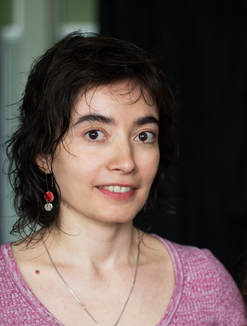
presente / present (2011) This work was composed specially for the trio with Seth Josel (electric guitar), Christine Pate (accordion) and Matthias Badczong (bass clarinet). I am very grateful for this possibility. This piece was part of a cycle of works for my doctoral dissertation in music composition. I focus on different aspects of entailment between early and contemporary music, as a way to question, reaffirm, and spread out new music’s potentialities. In this case, there is a material-seed: Quel guardo sdegnosetto by Claudio Monteverdi. The relationship between that piece and Present became totally transfigured, but there is still a kind of structural-compensatory sense of the form circulating during the whole work. The instrumentation of the piece was an element for shooting out the imaginary towards a totally unexpected sonorous landscape. It was a real challenge. Present is about a constant perception of the instant. It is a poetic attempt to surround each sound with an ultimate temporal form: a present of no time; a present where music becomes a timeless immersion in certain quasi-evocative materials, where memory is a paradoxical factor of identity with the past. Present is based in a concept where art is the closest way to eternity. Also, Present is a present to a loved one, with the most intense gratitude.
Patricia Martinez is an active composer, performer and interdisciplinary artist based in Buenos Aires. Her works has emerged, in part, from an experimental process of 'stripping-down,' which involves a degree of risk-taking. She holds a Doctoral and Master degree in Music Composition (Stanford University) and she completed the annual course in Computer Music (Ircam). Her works won prizes such as the Argentinean Government’s; Casa de las Américas; International Young Composers' Meeting; Ibermúsicas/Iberescena; Diffusion; SADAIC and JuanC. Paz. Commissions including: VCCA/UNESCO-Aschberg; Yvar Mikhashoff Trust for New Music Foundation; International Music Theatre Competition/Internationales Musikinstitut Darmstadt; American Composers Forum; Experimental Center of The Colón Theater. She participated at events and Festivals in America, Europe, and South Africa, including: MATA, Bludenzer Tage zeitgemäßer Musik, Darmstädter Ferienkurse, ISCM World Music Days or Music Current. She is professor of composition at the Conservatory of BA, University of Quilmes and external tutor at the UNAM. • patriciamartinez.com.ar
Patricia Martinez is an active composer, performer and interdisciplinary artist based in Buenos Aires. Her works has emerged, in part, from an experimental process of 'stripping-down,' which involves a degree of risk-taking. She holds a Doctoral and Master degree in Music Composition (Stanford University) and she completed the annual course in Computer Music (Ircam). Her works won prizes such as the Argentinean Government’s; Casa de las Américas; International Young Composers' Meeting; Ibermúsicas/Iberescena; Diffusion; SADAIC and JuanC. Paz. Commissions including: VCCA/UNESCO-Aschberg; Yvar Mikhashoff Trust for New Music Foundation; International Music Theatre Competition/Internationales Musikinstitut Darmstadt; American Composers Forum; Experimental Center of The Colón Theater. She participated at events and Festivals in America, Europe, and South Africa, including: MATA, Bludenzer Tage zeitgemäßer Musik, Darmstädter Ferienkurse, ISCM World Music Days or Music Current. She is professor of composition at the Conservatory of BA, University of Quilmes and external tutor at the UNAM. • patriciamartinez.com.ar
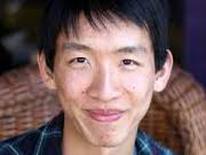
What goes unsaid is a simple setting of an excerpt from Claudia Rankine's searing lyric poem, "Citizen."
Words work as release; well-oiled doors opening and closing between intention, gesture. A pulse in the neck, the shiftiness of hands, an unconscious blink, the conversations you have with your eyes translate everything and nothing. What will be needed, what goes unfelt, unsaid, what has been duplicated, redacted here, redacted there, altered to hide or disguise. Words encoding the bodies they cover.
And despite everything, the body remains.
Occasionally, it is interesting to think about the outburst if you would just cry out –
To know what you’ll sound like is worth noting –
Thomas Feng is an award-winning composer and pianist, propelled by an insatiable musical curiosity and an enthusiasm for collaboration. • thomasfengmusic.com
Words work as release; well-oiled doors opening and closing between intention, gesture. A pulse in the neck, the shiftiness of hands, an unconscious blink, the conversations you have with your eyes translate everything and nothing. What will be needed, what goes unfelt, unsaid, what has been duplicated, redacted here, redacted there, altered to hide or disguise. Words encoding the bodies they cover.
And despite everything, the body remains.
Occasionally, it is interesting to think about the outburst if you would just cry out –
To know what you’ll sound like is worth noting –
Thomas Feng is an award-winning composer and pianist, propelled by an insatiable musical curiosity and an enthusiasm for collaboration. • thomasfengmusic.com
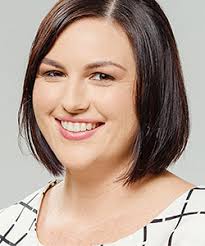
Stolen is based on a poem by Australian writer Richard James Allen, "A Scheme for Brightness." The piece takes its form from the poem, mirroring the wild chaotic opening, before moving into a more introspective middle section. The final section of the piece reflects the resolution in the final lines of the poem. The pitch material for the entire piece is derived from a single motif that references the “gleaming grain of golden sand” that Allen describes as a “piece of matter, with the universe in it”.
Australian composer Nicole Murphy’s music has been described as “exquisite, sensitive and delicate.” She is the recipient of various awards, including the Iceberg New Music Call for Scores (2017), Nief Norf International Call for Scores (2016), the MAFB International Commissioning Prize (2015), the Theodore Front International Orchestral Prize (2013) and the Definiens C3 International Composer’s Award (2011).
Nicole has been commissioned by eminent arts organisations including the Australian Ballet, the Royal Academy of Dance (London), Experiments in Opera/Symphony Space (New York), the Melbourne Symphony Orchestra, Orchestra Victoria, Wild Rumpus (San Francisco), Chamber Sounds (Singapore), and the Definiens Project (Los Angeles).
She is Composer-in-Residence at the Queensland Academy for Creative Industries and works with Musica Viva in Schools (Qld) undertaking residency projects in remote communities. Her music is published by Wirripang and she holds a PhD from the University of Queensland. • nicolemurphy.com.au
Australian composer Nicole Murphy’s music has been described as “exquisite, sensitive and delicate.” She is the recipient of various awards, including the Iceberg New Music Call for Scores (2017), Nief Norf International Call for Scores (2016), the MAFB International Commissioning Prize (2015), the Theodore Front International Orchestral Prize (2013) and the Definiens C3 International Composer’s Award (2011).
Nicole has been commissioned by eminent arts organisations including the Australian Ballet, the Royal Academy of Dance (London), Experiments in Opera/Symphony Space (New York), the Melbourne Symphony Orchestra, Orchestra Victoria, Wild Rumpus (San Francisco), Chamber Sounds (Singapore), and the Definiens Project (Los Angeles).
She is Composer-in-Residence at the Queensland Academy for Creative Industries and works with Musica Viva in Schools (Qld) undertaking residency projects in remote communities. Her music is published by Wirripang and she holds a PhD from the University of Queensland. • nicolemurphy.com.au
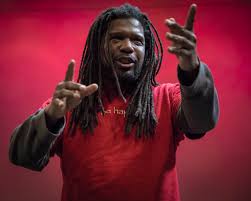
"Tiny Dancer" and other selected poems
My name is Christopher Johnson. I am a Providence resident artist, artist educator, curator and producer here in the city since 2001. Upon arriving in the city I have independently organized and produced performances and events on small and large scales for nonprofit organizations, clubs and citywide festivals. When I started in this city I worked with no budget and focused on building relationships with artist, audiences, businesses, art organizations, and funding organizations. My rapport with afore mentioned individuals has allowed me to gain success after success in grant writing and finding alternative funding for projects (such as Poetry in Public Places for Sound Session 2004 through 2010), in being an agent of intersectionality between organizations (Pairing Everett Dance “Freedom Project” with WaterFire and Roger Williams Memorial Park 2015 &20016), organize and curate independent artist for pop up and stage performance for downtown festivals (First Works 2004, Sound Session 2004-10, Straight Mixed Culture 2005-09, Wilbury Theater’s PVD Fringe Fest 2014-15, PVDFest 2015-16). • thencredibull.com
My name is Christopher Johnson. I am a Providence resident artist, artist educator, curator and producer here in the city since 2001. Upon arriving in the city I have independently organized and produced performances and events on small and large scales for nonprofit organizations, clubs and citywide festivals. When I started in this city I worked with no budget and focused on building relationships with artist, audiences, businesses, art organizations, and funding organizations. My rapport with afore mentioned individuals has allowed me to gain success after success in grant writing and finding alternative funding for projects (such as Poetry in Public Places for Sound Session 2004 through 2010), in being an agent of intersectionality between organizations (Pairing Everett Dance “Freedom Project” with WaterFire and Roger Williams Memorial Park 2015 &20016), organize and curate independent artist for pop up and stage performance for downtown festivals (First Works 2004, Sound Session 2004-10, Straight Mixed Culture 2005-09, Wilbury Theater’s PVD Fringe Fest 2014-15, PVDFest 2015-16). • thencredibull.com
VERDANT VIBES @ BROWN ARTS INITIATIVE + UNIVERSITY ARTIST SERIES
October 26 + 28, 2018
October 26 + 28, 2018
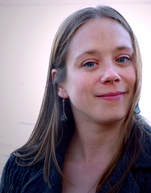
for Anna Atkins was inspired by the first woman photographer, who used sunlight to capture cyanotypes of ferns and other plants as part of her research. She published Part I of British Algae: Cyanotype Impressions in 1843 and wrote "The difficulty of making accurate drawings of objects so minute as many of the Algae and Confervae has induced me to avail myself of Sir John Herschel’s beautiful process of Cyanotype, to obtain impressions of the plants themselves, which I have much pleasure in offering to my botanical friends.” Light painting of all kinds continues to thrive today, whether with projectors and darkness, or a long exposure and sparklers. Written for Verdant Vibes with video by Alexander Dupuis and movement by Meg Sullivan. • kirstenvolness.com
Kirsten Volness's biography is available on the Artists page.
Kirsten Volness's biography is available on the Artists page.
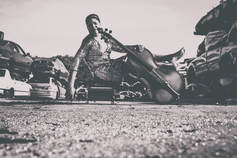
Astatine is the rarest element the universe. With a half-life of about eight hours, there is less than a single ounce of it present at any moment in time throughout the Earth. Nature does not like the structure of 85 electronics. As such, astatine is inherently unstable: it appears and disappears in the blink of an eye. It cannot be contained. In studying quantum physics we learn that the world is granular and that electrons don’t live in fixed orbits, but rather a spherical cloud which makes prediction of where exactly an electron may appear relative to interaction with another electron or particle a game of finite probability. Using Schrodinger’s equation in real time, performers placed throughout the space act as possible activity zones within the cloud, with one performer in the middle as the nucleus calculating the probable locations of an electron’s appearance. The coordinates from the equation are then linked to coordinates in the space. A signal goes out to the general area where a performer or the electron might be at the time, and the performer become active for times in proportion with half-life and other characteristics of astatine. This work ultimately unfolds as an exploration of things that appear and disappear in an indeterminate manner.
Celebrated for her “terrifying dynamic range,” cleanliness of sound, as well as unique sensitivity and ability to sculpt her performance for the acoustics of a space, Elizabeth A. Baker is a dramatic performer with an honest, near psychic connection to music, which resounds with audiences of all ages and musical backgrounds. As a creator, her understanding of sonic space from organic intuition and studies in music production, pair with a unique eclectic voice, making for a spatial and auditory experience of music. Eschewing the collection of traditional titles that describe single elements of her body of work, Elizabeth refers to herself as a “New Renaissance Artist” that embraces a constant stream of change and rebirth in practice, which expands into a variety of media, chiefly an exploration of how sonic and spatial worlds can be manipulated to personify a variety of philosophies and principles both tangible as well as intangible. • elizabethabaker.com
Celebrated for her “terrifying dynamic range,” cleanliness of sound, as well as unique sensitivity and ability to sculpt her performance for the acoustics of a space, Elizabeth A. Baker is a dramatic performer with an honest, near psychic connection to music, which resounds with audiences of all ages and musical backgrounds. As a creator, her understanding of sonic space from organic intuition and studies in music production, pair with a unique eclectic voice, making for a spatial and auditory experience of music. Eschewing the collection of traditional titles that describe single elements of her body of work, Elizabeth refers to herself as a “New Renaissance Artist” that embraces a constant stream of change and rebirth in practice, which expands into a variety of media, chiefly an exploration of how sonic and spatial worlds can be manipulated to personify a variety of philosophies and principles both tangible as well as intangible. • elizabethabaker.com
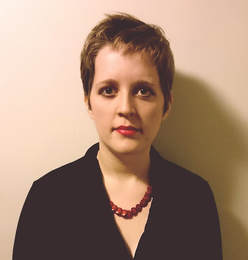
Ours for Nothing for violin, viola, cello, and double bass, featuring ExoRosie, a self-contained wearable synth
Kristina Warren is a composer, improviser, and critical maker based in Providence, Rhode Island [US]. Her practice—including building/playing unique instruments, composing for/with chamber ensembles, and writing about gender in electronic music—centers listening and noise, instrumentality and access. Warren has presented work around the world, including at the Guthman Musical Instrument Competition [US], Espace des arts sans frontières [FR], ICMC [GR, NL], Interfaces [CY], ISSTA [IE], Mise-En Music Festival [US], NIME [US], NYCEMF [US], Spektrum [DE], and TENOR [CA, ES]. Her music has been performed by ensembles such as Chartreuse, Dither, Ekmeles, JACK Quartet, loadbang, Meehan / Perkins Duo, Sō Percussion, and Yarn/Wire. She has been selected as a PEO Scholar Award recipient (2016), an Associate Artist at the Atlantic Center for the Arts (2016), and a finalist in the American Composers Forum National Composition Contest (2014). Currently a Visiting Assistant Professor of Electronic Music & Multimedia at Brown University, Warren holds a PhD in Composition & Computer Technologies from University of Virginia (2017) and a BA in Music Composition from Duke University (2011). kmwarren.org
Kristina Warren is a composer, improviser, and critical maker based in Providence, Rhode Island [US]. Her practice—including building/playing unique instruments, composing for/with chamber ensembles, and writing about gender in electronic music—centers listening and noise, instrumentality and access. Warren has presented work around the world, including at the Guthman Musical Instrument Competition [US], Espace des arts sans frontières [FR], ICMC [GR, NL], Interfaces [CY], ISSTA [IE], Mise-En Music Festival [US], NIME [US], NYCEMF [US], Spektrum [DE], and TENOR [CA, ES]. Her music has been performed by ensembles such as Chartreuse, Dither, Ekmeles, JACK Quartet, loadbang, Meehan / Perkins Duo, Sō Percussion, and Yarn/Wire. She has been selected as a PEO Scholar Award recipient (2016), an Associate Artist at the Atlantic Center for the Arts (2016), and a finalist in the American Composers Forum National Composition Contest (2014). Currently a Visiting Assistant Professor of Electronic Music & Multimedia at Brown University, Warren holds a PhD in Composition & Computer Technologies from University of Virginia (2017) and a BA in Music Composition from Duke University (2011). kmwarren.org
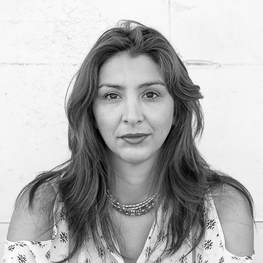
Disjointed Fragments for vibraphone, piano, double bass, electronics, 3-channel video, and dancer.
By exploring the merging of music and visuals, Argentinian composer Carolina Heredia’s current research is focused on the production of interactive audiovisual works. A 2015 Fromm Commission recipient, her compositions have been commissioned and performed in the United States and South America by several esteemed musicians and ensembles, including JACK Quartet, Derek Bermel, Alarm Will Sound, Aspen Contemporary Ensemble, Duo Cortona, Alex Fiterstein, Tesla Quartet, Chiara Quartet, and Khemia Ensemble. Her music has been featured at the SONIC Festival NYC, Aspen Music Festival and School, Bowling Green New Music
Festival, the Mizzou International Composers Festival, SEAMUS, Strange Beautiful Music, New Music Gathering, Crested Butte Music Festival, Bowdoin Music Festival, and the TIES Toronto International Electroacoustic Festival, among others. She was then a 2017-18 postdoctoral fellow at the University of Missouri School of Music. She is currently Assistant Professor in Music Composition and Assistant Director of the Mizzou New Music Initiative at the University of Missouri, Columbia. Heredia’s 2015 Harvard University Fromm Music Foundation Commission supported the creation of her work Ausencias/Ausências/Absences, for string quartet and fixed media, which was premiered by the JACK Quartet in March 2016.
Heredia founded Khemia Ensemble in 2015 as a contemporary music ensemble that strives to create innovative audiovisual concert experiences involving interactive technology. The ensemble has presented at several venues across the Americas, including National Sawdust (NYC), Trinosophes (Detroit), Radio Nacional and Facultad de Música (Argentina), and Facultad de Artes (Colombia). Khemia has received support from the Foundation for the Contemporary Arts, the Eastman School of Music Paul R. Judy Center for Innovation and Research, the University of Michigan, and the Mizzou New Music Initiative.
By exploring the merging of music and visuals, Argentinian composer Carolina Heredia’s current research is focused on the production of interactive audiovisual works. A 2015 Fromm Commission recipient, her compositions have been commissioned and performed in the United States and South America by several esteemed musicians and ensembles, including JACK Quartet, Derek Bermel, Alarm Will Sound, Aspen Contemporary Ensemble, Duo Cortona, Alex Fiterstein, Tesla Quartet, Chiara Quartet, and Khemia Ensemble. Her music has been featured at the SONIC Festival NYC, Aspen Music Festival and School, Bowling Green New Music
Festival, the Mizzou International Composers Festival, SEAMUS, Strange Beautiful Music, New Music Gathering, Crested Butte Music Festival, Bowdoin Music Festival, and the TIES Toronto International Electroacoustic Festival, among others. She was then a 2017-18 postdoctoral fellow at the University of Missouri School of Music. She is currently Assistant Professor in Music Composition and Assistant Director of the Mizzou New Music Initiative at the University of Missouri, Columbia. Heredia’s 2015 Harvard University Fromm Music Foundation Commission supported the creation of her work Ausencias/Ausências/Absences, for string quartet and fixed media, which was premiered by the JACK Quartet in March 2016.
Heredia founded Khemia Ensemble in 2015 as a contemporary music ensemble that strives to create innovative audiovisual concert experiences involving interactive technology. The ensemble has presented at several venues across the Americas, including National Sawdust (NYC), Trinosophes (Detroit), Radio Nacional and Facultad de Música (Argentina), and Facultad de Artes (Colombia). Khemia has received support from the Foundation for the Contemporary Arts, the Eastman School of Music Paul R. Judy Center for Innovation and Research, the University of Michigan, and the Mizzou New Music Initiative.
VERDANT VIBES SPRING FESTIVAL
April 7, 2018
April 7, 2018
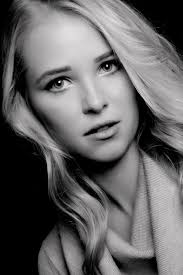
Symmetry for violin duo is a short, animated work which challenges the performers' natural instincts of playing either a leading or an accompanying role. It continuously and seamlessly shifts between the two roles in symmetry to each other, keeping both the players and the audience on their feet!
British composer Dani Howard has been heard internationally in countries including Italy, France, Hong Kong, Switzerland, Netherlands, Romania, Brazil as well as across the UK and USA.
In 2015-16 she was named winner of the Royal Philharmonic Society Composition Prize, and was invited as a fellow to the Cabrillo Festival of Contemporary Music, California. Recently she won 1st Prize in the Breaking The Fourth Wall 1st International Competition, and other competitions include 3rd prize of the International Antonin Dvorak (both the 5th and 6th editions), 10th International Cheng- du Sun River Competition (China). She was finalist at the International A. Rendano (Italy), Alba Rosa Vietor (Netherlands) and ISCM WMD Festival (Slovenia).
Dani Howard graduated from the Royal College of Music where she received a first class BMus Honors Degree. She was a Rose Williams scholar supported by the Henry Wood Trust, and studied composition under Jonathan Cole. • danihoward.com
British composer Dani Howard has been heard internationally in countries including Italy, France, Hong Kong, Switzerland, Netherlands, Romania, Brazil as well as across the UK and USA.
In 2015-16 she was named winner of the Royal Philharmonic Society Composition Prize, and was invited as a fellow to the Cabrillo Festival of Contemporary Music, California. Recently she won 1st Prize in the Breaking The Fourth Wall 1st International Competition, and other competitions include 3rd prize of the International Antonin Dvorak (both the 5th and 6th editions), 10th International Cheng- du Sun River Competition (China). She was finalist at the International A. Rendano (Italy), Alba Rosa Vietor (Netherlands) and ISCM WMD Festival (Slovenia).
Dani Howard graduated from the Royal College of Music where she received a first class BMus Honors Degree. She was a Rose Williams scholar supported by the Henry Wood Trust, and studied composition under Jonathan Cole. • danihoward.com
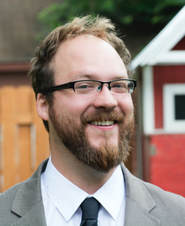
Stone Arch is an abstract depiction of the Stone Arch Bridge in downtown Minneapolis, Minnesota, the only arched bridge made of stone on the Mississippi. Originally built in 1883 by executive James J. Hill to serve as a railroad bridge, the structure has now become a pedestrian walkway.
Joshua Clausen is a Minneapolis-based composer. Clausen’s works often inhabit stylistic interstices between chamber concert music, electronic music and varied popular forms exerting “a dynamic intensity to [their] influence of popular culture (Computer Music Journal).”
In 2016 Clausen was named a Composer/Sound Artist Fellow by the Jerome Foundation and Associate Artist at Atlantic Center for the Arts Residency program. His recent works have also been supported by the McKnight Foundation, the Metropolitan Regional Arts Council and the Minnesota State Arts Board. Clausen has been commissioned by Wild Rumpus collective (San Fransisco), Milieux Percussion (Baltimore), AVIDduo (Dallas), The Dream Songs Project (Minneapolis/Los Angeles), the pianist Keith Kirchoff (Boston), saxophonist Kyle Hutchins (Blacksburg, VA) and clarinetist Sarah Porwoll-Lee (Minneapolis). Clausen is a member of the Spitting Image Collective, a Twin-Cities group dedicated to composer-curated programming, and mentors young composers during the American Composers Forums’ annual NextNotes initiative. • joshuaclausen.com
Joshua Clausen is a Minneapolis-based composer. Clausen’s works often inhabit stylistic interstices between chamber concert music, electronic music and varied popular forms exerting “a dynamic intensity to [their] influence of popular culture (Computer Music Journal).”
In 2016 Clausen was named a Composer/Sound Artist Fellow by the Jerome Foundation and Associate Artist at Atlantic Center for the Arts Residency program. His recent works have also been supported by the McKnight Foundation, the Metropolitan Regional Arts Council and the Minnesota State Arts Board. Clausen has been commissioned by Wild Rumpus collective (San Fransisco), Milieux Percussion (Baltimore), AVIDduo (Dallas), The Dream Songs Project (Minneapolis/Los Angeles), the pianist Keith Kirchoff (Boston), saxophonist Kyle Hutchins (Blacksburg, VA) and clarinetist Sarah Porwoll-Lee (Minneapolis). Clausen is a member of the Spitting Image Collective, a Twin-Cities group dedicated to composer-curated programming, and mentors young composers during the American Composers Forums’ annual NextNotes initiative. • joshuaclausen.com
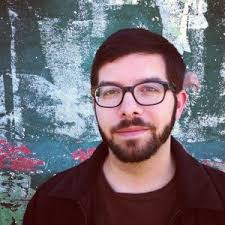
There is a small dam on the Pawtuxet River near the village of Hope, Rhode Island—just west of Providence—where the rushing water is diverted into a canal that runs past a huge abandoned building. In the 19th and 20th centuries, this was a factory that produced lace on an industrial scale, one of many specialized textile mills in this part of the state. Years earlier, the river here powered a blast furnace that forged cannons for the Revolutionary War. laceworks considers the contrasting industrial histories of the river—extremes of both violence and fragility—and it incorporates a series of field recordings I made at this spot in February 2018.
D. Edward Davis is a composer whose work engages with the sounds of the environment, exploring processes, patterns, and systems inspired by nature. His pieces have recently been presented at Slow SD in San Diego (2017), the Bang on a Can Summer Festival (2016), Interlude AVL in Asheville, NC (2016), the New Music Gathering in Baltimore (2016), Something Said Only Once in Flagstaff, AZ (2015), the Brooklyn Acoustic Ecology Festival (2015), and the Under the Radar Festival in Omaha (2014). His work has been performed by the New Mexico Contemporary Ensemble, the Witches Duo, Musica Nova, the Callithumpian Consort, Soundry Ensemble, yMusic, Da Capo Chamber Players, and many others. Davis holds degrees in composition from Duke University, Brooklyn College, and Northwestern University. His former teachers include Antoine Beuger, Scott Lindroth, John Supko, Amnon Wolman, David Grubbs, Amy Williams, and Michael Pisaro. • sound.warmsilence.org
D. Edward Davis is a composer whose work engages with the sounds of the environment, exploring processes, patterns, and systems inspired by nature. His pieces have recently been presented at Slow SD in San Diego (2017), the Bang on a Can Summer Festival (2016), Interlude AVL in Asheville, NC (2016), the New Music Gathering in Baltimore (2016), Something Said Only Once in Flagstaff, AZ (2015), the Brooklyn Acoustic Ecology Festival (2015), and the Under the Radar Festival in Omaha (2014). His work has been performed by the New Mexico Contemporary Ensemble, the Witches Duo, Musica Nova, the Callithumpian Consort, Soundry Ensemble, yMusic, Da Capo Chamber Players, and many others. Davis holds degrees in composition from Duke University, Brooklyn College, and Northwestern University. His former teachers include Antoine Beuger, Scott Lindroth, John Supko, Amnon Wolman, David Grubbs, Amy Williams, and Michael Pisaro. • sound.warmsilence.org
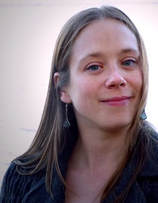
murmurations is inspired by shifting clouds of starlings at dusk. This textural piece incorporates quintessential musical influences that have shaped me, improvisation, fixed media and live processing. This work is dedicated to Jacob Richman to commemorate our upcoming marriage, and my father, Kenneth Volness, who passed away unexpectedly during its creation.
Kirsten Volness's biography is available on the Artists page. • kirstenvolness.com
Kirsten Volness's biography is available on the Artists page. • kirstenvolness.com
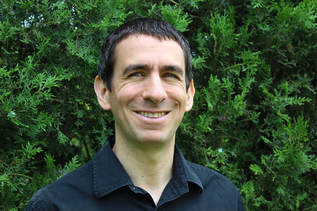
Three Goat Blues — “Chad Gadya” (“one little goat” in Aramaic) is a popular prayer from the Jewish holiday of Passover. While the holiday celebrates the biblical journey of the Israelites from slavery to freedom, “Chad Gadya” tells the story of one little goat that, right at the beginning of the prayer, is eaten by a cat. This tragic event begins a horrific fable about the power of nature, in which each being is killed by one larger than itself. Following the 20th-century French composer Darius Milhaud, who wove Provençal Jewish prayers into his music, I chose to use an old Provençal tune of “Chad Gadya” as a musical source for my piece. I decided, however, that the poor animal deserves a second chance. Instead of one goat, my piece portrays three (or possibly three aspects of the same goat). The first one is an oppressed, captive goat who sings the blues through the low-ranged cello. The viola represents a second goat that finds its way out of captivity and frolics here and there, but unfortunately its memories of oppression do not allow it to find peace. Only the third goat, featured by the violin, reaches true salvation. In a free adaptation of the original Provençal melody, the goat celebrates its freedom by dancing among the hills using awkward meters (since I can’t really imagine a goat dancing in 4/4 time). The piece was commissioned by Apollo Chamber Players for their 20x2020 project, underwritten by a grant from the Houston Arts Alliance, and was written for their "Oppression to Expression" season program "Rhapsody Nouveau," connecting works influenced by Provençal Jewish and African-American traditions.
Gilad Cohen is an active composer, performer and theorist in various genres including concert music, rock and music for theatre. Recent and upcoming engagements include commissions from Barlow Endowment for the Arts, Concert Artists Guild and Parlance Chamber Concerts; performances by Lysander Piano Trio, Israeli Chamber Project, violist Paul Neubauer, and principal players of the Metropolitan Opera Orchestra and the Budapest Festival Orchestra; and releases on Albany Records, Naxos/Delos and Parma Recordings. Notable awards include the 2016 Barlow Prize, the Israeli Prime Minister Award for Composers and top prizes in international competitions in the US, Europe, Asia and the Middle-East. Gilad performs regularly with various ensembles, playing piano, bass and guitar. An Assistant Professor of Music at Ramapo College of New Jersey, Gilad holds a Ph.D. in composition from Princeton University. His research about structure in the music of Pink Floyd has resulted in publications, lectures and conferences. • giladcohen.com
Gilad Cohen is an active composer, performer and theorist in various genres including concert music, rock and music for theatre. Recent and upcoming engagements include commissions from Barlow Endowment for the Arts, Concert Artists Guild and Parlance Chamber Concerts; performances by Lysander Piano Trio, Israeli Chamber Project, violist Paul Neubauer, and principal players of the Metropolitan Opera Orchestra and the Budapest Festival Orchestra; and releases on Albany Records, Naxos/Delos and Parma Recordings. Notable awards include the 2016 Barlow Prize, the Israeli Prime Minister Award for Composers and top prizes in international competitions in the US, Europe, Asia and the Middle-East. Gilad performs regularly with various ensembles, playing piano, bass and guitar. An Assistant Professor of Music at Ramapo College of New Jersey, Gilad holds a Ph.D. in composition from Princeton University. His research about structure in the music of Pink Floyd has resulted in publications, lectures and conferences. • giladcohen.com
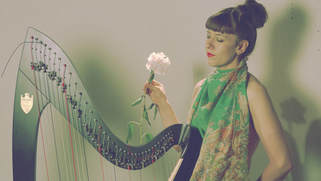
Audrey Harrer's biography is available on the Artists page. • audreyharrer.net
VERDANT VIBES BENEFIT CONCERT
February 3, 2018
February 3, 2018
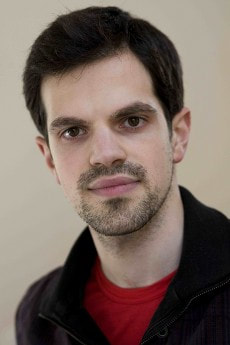
Svitac is the Bosnian word for firefly. I have always been fascinated with bioluminescence. I remember being obsessed with the fireflies I encountered on a holiday in Croatia when I was little. The clarinet part makes use of microtonal trills and soft, wailing glissandi. The accompaniment is intended for an upright piano in order to obtain a soft and sustained (though slightly unstable) tone with the use of the practice pedal. Svitac was written for clarinetist Ellen Deverall.
Karlo Margetić (b.1987) holds degrees in composition and clarinet from the New Zealand School of Music. He is Composer in Residence with the Auckland Philharmonia Orchestra for the 2016 and 2017 seasons.
Karlo has been the recipient of numerous prizes, including the 2013 SOUNZ Contemporary Award (for 'Lightbox'), the NZSO/Todd Young Composer Award (2006). In 2013 he was a Composer Fellow at the Intimacy of Creativity Composition Workshop at the Hong Kong University of Science and Technology.
Karlo has received commissions and performances from a wide variety of soloists and groups including NZTrio, New Zealand String Quartet, STROMA, Michael Houstoun, Claire Edwardes, Auckland Philharmonia Orchestra, Auckland Chamber Orchestra, and Wellington Youth Orchestra. He was Composer-in-Residence with Orchestra Wellington in 2014, with the NZSO National Youth Orchestra in 2007. An active performer, Karlo is Co-Director of the SMP Ensemble, and has appeared with them as composer, clarinetist, conductor and narrator. • karlomargetic.com
Karlo Margetić (b.1987) holds degrees in composition and clarinet from the New Zealand School of Music. He is Composer in Residence with the Auckland Philharmonia Orchestra for the 2016 and 2017 seasons.
Karlo has been the recipient of numerous prizes, including the 2013 SOUNZ Contemporary Award (for 'Lightbox'), the NZSO/Todd Young Composer Award (2006). In 2013 he was a Composer Fellow at the Intimacy of Creativity Composition Workshop at the Hong Kong University of Science and Technology.
Karlo has received commissions and performances from a wide variety of soloists and groups including NZTrio, New Zealand String Quartet, STROMA, Michael Houstoun, Claire Edwardes, Auckland Philharmonia Orchestra, Auckland Chamber Orchestra, and Wellington Youth Orchestra. He was Composer-in-Residence with Orchestra Wellington in 2014, with the NZSO National Youth Orchestra in 2007. An active performer, Karlo is Co-Director of the SMP Ensemble, and has appeared with them as composer, clarinetist, conductor and narrator. • karlomargetic.com
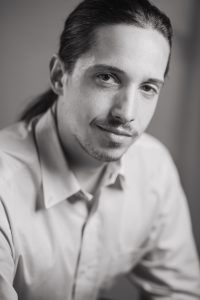
Échanges was written in Berlin during the spring of 2013. The piece is based on the idea of augmenting the amount of voices between the movements. As a contrast to the first movement, in which a single and lonely melody mostly guides the flow, the second is built on a multitude of voices. Finally, the last movement produces the most amount of voices by involving the audience in the piece like a responsorial prayer of a litany involves the churchgoers.
Born in Berlin in 1989, Alexander Liebermann is the winner of several composition competitions such as ASCAP’s Morton Gould Award, GEMA, and 2013th Juilliard Orchestra composition competition. Mr. Liebermann is a recent graduate from the Juilliard School, where he obtained his MA under the guidance of Samuel Adler and Steven Stucky. He was supported by the German Exchange Service (DAAD), IBU-tec, and the Gitta Steiner Memorial Scholarship. He currently is enrolled in the doctoral program of the Manhattan School of Music in New York City. • alexanderliebermann.com
Born in Berlin in 1989, Alexander Liebermann is the winner of several composition competitions such as ASCAP’s Morton Gould Award, GEMA, and 2013th Juilliard Orchestra composition competition. Mr. Liebermann is a recent graduate from the Juilliard School, where he obtained his MA under the guidance of Samuel Adler and Steven Stucky. He was supported by the German Exchange Service (DAAD), IBU-tec, and the Gitta Steiner Memorial Scholarship. He currently is enrolled in the doctoral program of the Manhattan School of Music in New York City. • alexanderliebermann.com
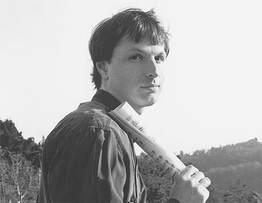
Cluck Old Hen Variations, for solo violin (2004) is based on the traditional Appalachian banjo tune “Cluck Old Hen,” the piece is in fact more of a fantasy than a traditional variation form, with the theme threading throughout the piece in the manner of a leitmotiv. Numerous techniques and idioms from bluegrass music merge with classical material, to form a music that occupies the space between violin and fiddle repertoire.
David A. Jaffe's over ninety works, which combine American folk music with other contrasting elements, have been presented by orchestras such as the San Francisco Symphony, the Brooklyn Philharmonic, the Russian National Orchestra, the Saint Paul Chamber Orchestra, the Lithuanian National Opera and Ballet Theatre Orchestra, and the Cabrillo Festival Orchestra, and in 28 countries, including at the Berlin Festival, the American Festival (London), the Venice Biennale, and the ISCM Warsaw Autumn Festival. Jaffe has received commissions from the Kronos Quartet, Chanticleer, Chanticleer, Cello Octet Amsterdam, the Lafayette String Quartet, and many others. He received the Doctor of Musical Arts degree from Stanford University and has taught composition at Princeton University, Stanford University, the University of California at San Diego and Melbourne University. His music has been released on 11 CDs, by Elektra/Asylum, Wergo, Well-Tempered and other labels. • jaffe.com
David A. Jaffe's over ninety works, which combine American folk music with other contrasting elements, have been presented by orchestras such as the San Francisco Symphony, the Brooklyn Philharmonic, the Russian National Orchestra, the Saint Paul Chamber Orchestra, the Lithuanian National Opera and Ballet Theatre Orchestra, and the Cabrillo Festival Orchestra, and in 28 countries, including at the Berlin Festival, the American Festival (London), the Venice Biennale, and the ISCM Warsaw Autumn Festival. Jaffe has received commissions from the Kronos Quartet, Chanticleer, Chanticleer, Cello Octet Amsterdam, the Lafayette String Quartet, and many others. He received the Doctor of Musical Arts degree from Stanford University and has taught composition at Princeton University, Stanford University, the University of California at San Diego and Melbourne University. His music has been released on 11 CDs, by Elektra/Asylum, Wergo, Well-Tempered and other labels. • jaffe.com
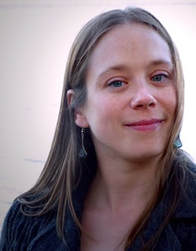
Winter Circle is an asterism, or group of stars including Betelgeuse, Rigel, Aldebaran, Capella, Sirius, Procyon, Castor and Pollux, that appear in the northern hemisphere in the winter months. This piece was inspired by shapeshifting and flickering points of light in the darkness. It was commissioned by and written for Bill Solomon.
Kirsten Volness's biography is available on the Artists page. • kirstenvolness.com
Kirsten Volness's biography is available on the Artists page. • kirstenvolness.com
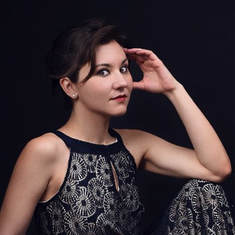
Ainsi soit-il -- French: “so be it” or the “amen” found at the end of a prayer. Ainsi soit-il was composed for part of Anssi Karttunen's Creative Dialogue Suite. Mimicking the act of letter writing from afar, a group of NY-based composers (Zosha Di Castri, Bryan Jacobs, Taylor Brook, Yoshiaki Onishi, and me) participated in a dialogue exchange with Anssi. We would send him excerpts, sketches, concepts and he would reply with recording and improvisations. From these collective dialogue materials we each sculpted a piece.
New York-based composer Nina C. Young blends the worlds of acoustic and electro-acoustic music; she writes music characterized by an acute sensitivity to tone color and temporality. Young’s music has garnered international acclaim through performances by the American Composers Orchestra, Inscape, Milwaukee Symphony, Orkest de ereprijs, Phoenix Symphony, Nouvel Ensemble Moderne, Argento, Divertimento, Either/Or, JACK Quartet, Metropolis, Nouveau Classical Project, Scharoun, Sixtrum, wild Up, and Yarn/Wire. Winner of the 2015-16 Rome Prize in Musical Composition, Nina has received a Koussevitzky Commission from the Library of Congress, a Charles Ives Scholarship from the American Academy of Arts and Letters, the Salvatore Martirano Memorial Award, the Jacob Druckman Prize, and honors from BMI, IAWM, and ASCAP/SEAMUS.
A graduate of McGill and MIT, Nina completed her DMA at Columbia University where she was an active participant at the Columbia Computer Music Center. Nina is an Assistant Professor in the Department of the Arts at Rensselear Polytechnic Institute (RPI). She serves as a visiting composer at the Peabody Institute and is the Co-Artistic Director of NY-based new music sinfonietta Ensemble Échappé. Peermusic Classical publishes her catalog. • ninacyoung.com
New York-based composer Nina C. Young blends the worlds of acoustic and electro-acoustic music; she writes music characterized by an acute sensitivity to tone color and temporality. Young’s music has garnered international acclaim through performances by the American Composers Orchestra, Inscape, Milwaukee Symphony, Orkest de ereprijs, Phoenix Symphony, Nouvel Ensemble Moderne, Argento, Divertimento, Either/Or, JACK Quartet, Metropolis, Nouveau Classical Project, Scharoun, Sixtrum, wild Up, and Yarn/Wire. Winner of the 2015-16 Rome Prize in Musical Composition, Nina has received a Koussevitzky Commission from the Library of Congress, a Charles Ives Scholarship from the American Academy of Arts and Letters, the Salvatore Martirano Memorial Award, the Jacob Druckman Prize, and honors from BMI, IAWM, and ASCAP/SEAMUS.
A graduate of McGill and MIT, Nina completed her DMA at Columbia University where she was an active participant at the Columbia Computer Music Center. Nina is an Assistant Professor in the Department of the Arts at Rensselear Polytechnic Institute (RPI). She serves as a visiting composer at the Peabody Institute and is the Co-Artistic Director of NY-based new music sinfonietta Ensemble Échappé. Peermusic Classical publishes her catalog. • ninacyoung.com
VERDANT VIBES WINTER WARMER
December 9, 2017
December 9, 2017
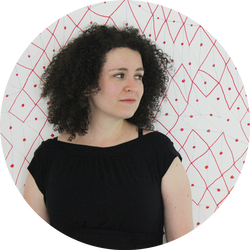
Not Shy relies on the gestures and intonation of theatrical dialogues. Thinking about the violin and bass as two people, I treated the two as a romantic couple, cooing, arguing, fighting and then making up.
Osnat Netzer is a composer, songwriter, pianist and educator. A native of Haifa, Israel, Netzer studied at the Jerusalem Academy of Music and Dance, Mannes College of Music, and New England Conservatory. During her time at NEC, she received a grant from the Beebe Foundation that funded both studies in experimental theater at Universität der Künste in Berlin and the completion of her opera, The Wondrous Woman Within, which was described as “riotously funny” in The New York Times when its first scene was performed at New York City Opera’s VOX festival in 2012 and “challenging and fascinating” by critic Amir Kidron when it received its premiere in a sold out run at Tel Aviv’s Cameri Theatre in 2015.
Her compositions have published by Edition Peters and earthsongs, and recorded on Bridge Records. Recent commissions include the Fromm Commission, International Contemporary Ensemble, duo Patchwork, and Radcliffe Choral Society.
osnatnetzer.com
Osnat Netzer is a composer, songwriter, pianist and educator. A native of Haifa, Israel, Netzer studied at the Jerusalem Academy of Music and Dance, Mannes College of Music, and New England Conservatory. During her time at NEC, she received a grant from the Beebe Foundation that funded both studies in experimental theater at Universität der Künste in Berlin and the completion of her opera, The Wondrous Woman Within, which was described as “riotously funny” in The New York Times when its first scene was performed at New York City Opera’s VOX festival in 2012 and “challenging and fascinating” by critic Amir Kidron when it received its premiere in a sold out run at Tel Aviv’s Cameri Theatre in 2015.
Her compositions have published by Edition Peters and earthsongs, and recorded on Bridge Records. Recent commissions include the Fromm Commission, International Contemporary Ensemble, duo Patchwork, and Radcliffe Choral Society.
osnatnetzer.com
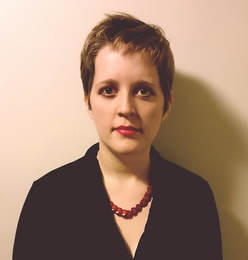
For soloist and any number of musicians uses a text score, which asks a vocal soloist and an accompanying ensemble to a respond to a number of verbal conditions. These phrases – for instance “getting twangier” and “arm being underneath the quiet” – range from literal and sonic on the one hand, to abstract and imaginative on the other. The goal is for players to consider, in a free but guided way, when and how to play, and how to respond to others' sounds.
Kristina Warren is a composer, improviser, and critical maker based in Providence, Rhode Island [US]. Her practice—including building/playing unique instruments, composing for/with chamber ensembles, and writing about gender in electronic music—centers listening and noise, instrumentality and access. Warren has presented work around the world, including at the Guthman Musical Instrument Competition [US], Espace des arts sans frontières [FR], ICMC [GR, NL], Interfaces [CY], ISSTA [IE], Mise-En Music Festival [US], NIME [US], NYCEMF [US], Spektrum [DE], and TENOR [CA, ES]. Her music has been performed by ensembles such as Chartreuse, Dither, Ekmeles, JACK Quartet, loadbang, Meehan / Perkins Duo, Sō Percussion, and Yarn/Wire. She has been selected as a PEO Scholar Award recipient (2016), an Associate Artist at the Atlantic Center for the Arts (2016), and a finalist in the American Composers Forum National Composition Contest (2014). Currently a Visiting Assistant Professor of Electronic Music & Multimedia at Brown University, Warren holds a PhD in Composition & Computer Technologies from University of Virginia (2017) and a BA in Music Composition from Duke University (2011).
kmwarren.org
Kristina Warren is a composer, improviser, and critical maker based in Providence, Rhode Island [US]. Her practice—including building/playing unique instruments, composing for/with chamber ensembles, and writing about gender in electronic music—centers listening and noise, instrumentality and access. Warren has presented work around the world, including at the Guthman Musical Instrument Competition [US], Espace des arts sans frontières [FR], ICMC [GR, NL], Interfaces [CY], ISSTA [IE], Mise-En Music Festival [US], NIME [US], NYCEMF [US], Spektrum [DE], and TENOR [CA, ES]. Her music has been performed by ensembles such as Chartreuse, Dither, Ekmeles, JACK Quartet, loadbang, Meehan / Perkins Duo, Sō Percussion, and Yarn/Wire. She has been selected as a PEO Scholar Award recipient (2016), an Associate Artist at the Atlantic Center for the Arts (2016), and a finalist in the American Composers Forum National Composition Contest (2014). Currently a Visiting Assistant Professor of Electronic Music & Multimedia at Brown University, Warren holds a PhD in Composition & Computer Technologies from University of Virginia (2017) and a BA in Music Composition from Duke University (2011).
kmwarren.org
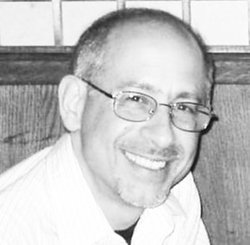
Wake me when we get there — As British scholar Paul Rennie has noted on his blog BAGDContext, a train journey offers an experience similar to that of cinema: a distanced, voyeuristic platform for observation of the world, and a systemic organization of time and motion. Rennie notes that this experience of being “on track” is both comforting and disconcerting to the passenger, who abandons the autonomies of modernist identity in favour of being driven, provoking a powerful, terrifying sense of the train being unstoppable.
David Jason Snow (b. Providence, RI, October 8, 1954) have been performed in concert by the Ensemble Intercontemporain at the Centre Georges Pompidou in Paris, the New Juilliard Ensemble at the Museum of Modern Art in New York, the American Brass Quintet at the John F. Kennedy Center for the Performing Arts in Washington DC, and many other artists and ensembles internationally. Snow has been the recipient of awards from the National Endowment for the Arts, the Maryland State Arts Council, the ASCAP Foundation, and BMI, and has been an artist resident at Yaddo in Saratoga Springs and the Millay Colony for the Arts in Austerlitz, New York. He holds degrees in music composition from the Eastman School of Music and Yale University where his principle teachers were Joseph Schwantner, Warren Benson, Samuel Adler, and Jacob Druckman.
davidsnowmusic.org
David Jason Snow (b. Providence, RI, October 8, 1954) have been performed in concert by the Ensemble Intercontemporain at the Centre Georges Pompidou in Paris, the New Juilliard Ensemble at the Museum of Modern Art in New York, the American Brass Quintet at the John F. Kennedy Center for the Performing Arts in Washington DC, and many other artists and ensembles internationally. Snow has been the recipient of awards from the National Endowment for the Arts, the Maryland State Arts Council, the ASCAP Foundation, and BMI, and has been an artist resident at Yaddo in Saratoga Springs and the Millay Colony for the Arts in Austerlitz, New York. He holds degrees in music composition from the Eastman School of Music and Yale University where his principle teachers were Joseph Schwantner, Warren Benson, Samuel Adler, and Jacob Druckman.
davidsnowmusic.org
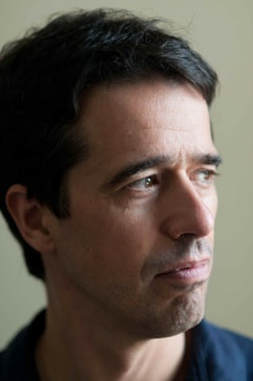
Vox Sum Vitae (I am the voice of life) is an inscription in a church bell in Strasbourg. In one of my trips to perform an organ concert in Germany, on a Sunday morning I was woke suddenly with the sound of hundreds of church bells, announcing the early morning church service. This piece is a representation of that sound image.
João Pedro Oliveira completed a PhD in Music at the University of New York at Stony Brook. His music includes one chamber opera, several orchestral compositions, a Requiem, 3 string quartets, chamber music, solo instrumental music, electroacoustic music and experimental video. He has received numerous prizes and awards, including three Prizes at Bourges Electroacoustic Music Competition, the prestigious Magisterium Prize in the same competition, the Giga-Hertz Special Award, 1st Prize in Metamorphoses competition, 1st Prize in Yamaha-Visiones Sonoras Competition, 1st Prize in Musica Nova competition, etc.. He is Professor at Federal University of Minas Gerais (Brazil) and Aveiro University (Portugal). He published several articles in journals, and has written a book about analysis and 20th century music theory.
jpoliveira.com
João Pedro Oliveira completed a PhD in Music at the University of New York at Stony Brook. His music includes one chamber opera, several orchestral compositions, a Requiem, 3 string quartets, chamber music, solo instrumental music, electroacoustic music and experimental video. He has received numerous prizes and awards, including three Prizes at Bourges Electroacoustic Music Competition, the prestigious Magisterium Prize in the same competition, the Giga-Hertz Special Award, 1st Prize in Metamorphoses competition, 1st Prize in Yamaha-Visiones Sonoras Competition, 1st Prize in Musica Nova competition, etc.. He is Professor at Federal University of Minas Gerais (Brazil) and Aveiro University (Portugal). He published several articles in journals, and has written a book about analysis and 20th century music theory.
jpoliveira.com
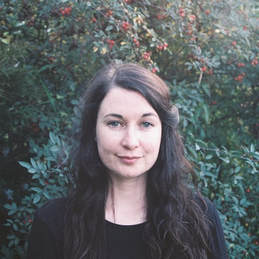
Interruptions, imperfections, and glitches carry negative connotations, but in On Shuffle they are celebrated. I wanted to play the role of an enthusiastic, if somewhat attention-deficient DJ—sampling small riffs to interrupt material, crossfading opposing material, and disjointing the structure with abrupt changes. Structure always looms when working on a piece, so I wanted to liberate myself from the notion of seamlessness and embrace inconsistency.
Amanda Feery is an Irish composer writing for acoustic, electronic and improvisatory forces. She has written for orchestral, chamber, and vocal ensembles, theatre, kinetic sculpture, multimedia, and produced and recorded two album releases.
Collaborators include RTÉ National Symphony Orchestra, Chamber Choir Ireland, Crash Ensemble, Ensemble Mise-en, Dither, Mivos Quartet, Bearthoven, Fidelio Trio, Orkest de Ereprijs, Gallicantus, Quince Contemporary Vocal Ensemble, and Lisa Moore. She has participated as a composer fellow at Ostrava Days Festival , SOUNDscape Festival, Bang on a Can Summer Festival, and the International Young Composers Meeting. Awards include the IAWM Theodore Front Prize for Orchestral Music, the Seán Ó'Riada Composition Prize for Choral Music, Jerome Hynes Composer Award, and the West Cork Chamber Music Festival Composer Award.
She is currently a doctoral student in Composition at Princeton University.
amandafeery.com
Amanda Feery is an Irish composer writing for acoustic, electronic and improvisatory forces. She has written for orchestral, chamber, and vocal ensembles, theatre, kinetic sculpture, multimedia, and produced and recorded two album releases.
Collaborators include RTÉ National Symphony Orchestra, Chamber Choir Ireland, Crash Ensemble, Ensemble Mise-en, Dither, Mivos Quartet, Bearthoven, Fidelio Trio, Orkest de Ereprijs, Gallicantus, Quince Contemporary Vocal Ensemble, and Lisa Moore. She has participated as a composer fellow at Ostrava Days Festival , SOUNDscape Festival, Bang on a Can Summer Festival, and the International Young Composers Meeting. Awards include the IAWM Theodore Front Prize for Orchestral Music, the Seán Ó'Riada Composition Prize for Choral Music, Jerome Hynes Composer Award, and the West Cork Chamber Music Festival Composer Award.
She is currently a doctoral student in Composition at Princeton University.
amandafeery.com
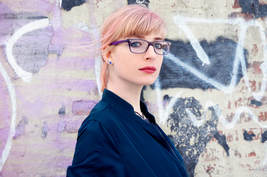
Kelly Moran is a composer and pianist from New York. As the sole engineer and producer of her five solo albums, her intricately arranged electro-acoustic compositions have been described as accomplishing “the rare feat of making the work of a single individual sound like the artistic output of a veritable creative army.” (Zoe Camp, Clrvynt) As a pianist, Moran specializes in works that employ extended techniques and prepared piano. Her album Bloodroot was released by Telegraph Harp Records in March 2017 and received praise from Pitchfork, NPR, The Log Journal, KEXP, and many more.
In recent years she has performed as a bassist in Weasel Walter’s no-wave outfit Cellular Chaos, and keyboardist for avant-rock band Voice Coils. Recent collaborations include projects with Toby Driver (Kayo Dot), Charlie Looker (Extra Life), and acclaimed pianist Margaret Leng-Tan.
Moran completed her undergraduate degree at University of Michigan-Ann Arbor where she studied piano performance, sound engineering, and composition. In 2010, Moran received a fellowship for the MFA program in Integrated Composition, Improvisation, and Technology at University of California-Irvine. Moran works as a freelance pianist in NYC and is on staff as an accompanist at Barnard College and the Martha Graham School for Contemporary Dance.
In recent years she has performed as a bassist in Weasel Walter’s no-wave outfit Cellular Chaos, and keyboardist for avant-rock band Voice Coils. Recent collaborations include projects with Toby Driver (Kayo Dot), Charlie Looker (Extra Life), and acclaimed pianist Margaret Leng-Tan.
Moran completed her undergraduate degree at University of Michigan-Ann Arbor where she studied piano performance, sound engineering, and composition. In 2010, Moran received a fellowship for the MFA program in Integrated Composition, Improvisation, and Technology at University of California-Irvine. Moran works as a freelance pianist in NYC and is on staff as an accompanist at Barnard College and the Martha Graham School for Contemporary Dance.
VERDANT VIBES SPRING FESTIVAL (and TIMES TWO)
April 23, 2017
________________________
for Anna Atkins was inspired by the first woman photographer, who used sunlight to capture cyanotypes of ferns and other plants as part of her research. She published Part I of British Algae: Cyanotype Impressions in 1843 and wrote "The difficulty of making accurate drawings of objects so minute as many of the Algae and Confervae has induced me to avail myself of Sir John Herschel’s beautiful process of Cyanotype, to obtain impressions of the plants themselves, which I have much pleasure in offering to my botanical friends.” Light painting of all kinds continues to thrive today, whether with projectors and darkness, or a long exposure and sparklers. Written for Verdant Vibes with video by Alexander Dupuis and movement by Meg Sullivan.
Kirsten Volness's biography is available on the Artists page.
www.kirstenvolness.com
Balance of Power pits the opposing forces of noise and harmony against each other. On the noisy side, the ensemble plays an array of percussive sounds in interlocking rhythms. On the side of harmony is a slow-moving chord progression based on a low C drone. These two forces engage in a delicate balancing act, sometimes moving in parallel to each other, and at other times playing directly off of one another.
The music of composer and multi-instrumentalist Dan VanHassel (b. 1981) has been described as “energizing” (Wall Street Journal) and “an imaginative and rewarding soundscape” (San Francisco Classical Voice). Recent performances include the Talea Ensemble at the MATA Festival, the International Computer Music Conference, Shanghai Conservatory Electronic Music Week, Bang on a Can Summer Festival, UC Davis Music and Words Festival, and the Wellesley Composers Conference. Dan was a founding member of contemporary chamber ensemble Wild Rumpus and artistic director through 2016. Currently residing in Boston, Dan has degrees from the University of California-Berkeley, New England Conservatory, and Carnegie Mellon University.
www.danvanhassel.com
Sea-foam cotton undertows from Slow and Pretty Things is a tone poem, about my final conversation with my grandmother, Elizabeth Huff. In the last year of her life, her dementia had progressed to the point where she had lost all sense of time. Her stories could go for hours, slowly ebbing and flowing, circling around themselves like an eddy at the edge of a river. And as she sunk deeper into dementia, her timelessness became more pronounced. The destination of her stories was no longer relevant; for her, it was about the journey—the act and art of communicating. I found myself intensely engrossed in these conversations. The humanity in her voice was as clear as ever, but her message was obfuscated. We achieved a kind of understanding–an elegant compromise where she and I both said a great deal, and neither of us understood. She meditated on her childhood and mine, holidays with family, her pig, the war, and our spouses. Our final conversation was a beautiful moment, suspended in time and space. It was only after she was gone that I started to understand what she was trying to say. This piece is my attempt to capture that final, wonderful conversation: a timeless ghost.
Hunter Ewen is a dramatic composer, educator, and multimedia designer. During the day, Dr. Ewen teaches students strategies for digital creativity. At night, he composes, solders, choreographs, and videographs solo and collaborative projects around the world.
His works rail against the faded borders that separate art from science, music from sound, and meaning from meaninglessness. Ewen values frenzy. He buzzes and sneaks and desperately loves. His work is soothing, startling, virtuosic, and absurd. It grooves with dense, layered textures. It lusts for yowls and yips and wails and squeals. For screams that masquerade as art. For clamor and deviance. His compositions swing from chandeliers.
At The University of Colorado, Boulder, Ewen is an instructor of composition, music technology, and sound for the Department of Critical Media Practices, in the College of Media, Communication, and Information.
www.hunterewen.com
Wild Rumpus commissioned Never Not during their 2012 Commissioning Project, with its premiere in San Francisco in 2014. The work pulls on pop and classical instrumentation to inhabit a unique sonic landscape and an alternative space for the art song. Setting text by playwright Adara Meyers, Never Not touches on time, ambiguity, and our unguarded yet watchful states.
With works described as "visceral" (Lucid Culture), "propulsive" (Bachtrack) and "austere" (New Music Box), composer Leaha Maria Villarreal’s output includes music for dance, film, opera, and concert hall.
She has worked with organizations such as Beth Morrison Projects and the Los Angeles Philharmonic, ETHEL and Friends concert series at The Metropolitan Museum of Art, Wild Rumpus, JACK Quartet, Experiments in Opera, and TRANSIT New Music, among others. Past composition teachers include Roger Reynolds, Steven Kazuo Takasugi, and Chinary Ung. Villarreal holds a B.A. from the University of California, San Diego and studied at New York University with Julia Wolfe and Michael Gordon. She is the founding Artistic Director of music ensemble Hotel Elefant; a Teaching Artist Associate for the New York Philharmonic's Very Young Composers Bridge Program; and a 2015-16 Composer in Residence with ConEdison’s Exploring the Metropolis. Originally from Los Angeles, Leaha lives and works in New York City.
www.leahamaria.com
Reaching ever downwards, Bottom Heavy weds groove to melodies both angular and smooth. How far down can it go before the bottom drops out?
Composer Scott Lee writes concert music infused with the visceral sounds of popular music. Lee has worked with musicians across genres, from leading orchestras and chamber groups such as the Baltimore Symphony Orchestra, the North Carolina Symphony, the Portland Symphony Orchestra, Winston-Salem Symphony members, the Moravian Philharmonic, the Peabody Symphony Orchestra, the Da Capo Chamber Players, and chatterbird, to yMusic, ShoutHouse, and multi-platinum pop artist Ben Folds. He has received commissions from loadbang, the Baltimore Classical Guitar Society, the Occasional Symphony, and the American Craft Council.
Notable awards include a 2016 Charles Ives Scholarship from the American Academy of Arts and Letters, a 2015 ASCAP Morton Gould Young Composer Award, and the grand prize in the 2015 PARMA Student Composer Competition.
Lee is currently a James B. Duke Fellow at Duke University where he is pursuing his PhD in Composition, mentored by Scott Lindroth and Steve Jaffe.
scottleemusic.net
April 23, 2017
________________________
for Anna Atkins was inspired by the first woman photographer, who used sunlight to capture cyanotypes of ferns and other plants as part of her research. She published Part I of British Algae: Cyanotype Impressions in 1843 and wrote "The difficulty of making accurate drawings of objects so minute as many of the Algae and Confervae has induced me to avail myself of Sir John Herschel’s beautiful process of Cyanotype, to obtain impressions of the plants themselves, which I have much pleasure in offering to my botanical friends.” Light painting of all kinds continues to thrive today, whether with projectors and darkness, or a long exposure and sparklers. Written for Verdant Vibes with video by Alexander Dupuis and movement by Meg Sullivan.
Kirsten Volness's biography is available on the Artists page.
www.kirstenvolness.com
Balance of Power pits the opposing forces of noise and harmony against each other. On the noisy side, the ensemble plays an array of percussive sounds in interlocking rhythms. On the side of harmony is a slow-moving chord progression based on a low C drone. These two forces engage in a delicate balancing act, sometimes moving in parallel to each other, and at other times playing directly off of one another.
The music of composer and multi-instrumentalist Dan VanHassel (b. 1981) has been described as “energizing” (Wall Street Journal) and “an imaginative and rewarding soundscape” (San Francisco Classical Voice). Recent performances include the Talea Ensemble at the MATA Festival, the International Computer Music Conference, Shanghai Conservatory Electronic Music Week, Bang on a Can Summer Festival, UC Davis Music and Words Festival, and the Wellesley Composers Conference. Dan was a founding member of contemporary chamber ensemble Wild Rumpus and artistic director through 2016. Currently residing in Boston, Dan has degrees from the University of California-Berkeley, New England Conservatory, and Carnegie Mellon University.
www.danvanhassel.com
Sea-foam cotton undertows from Slow and Pretty Things is a tone poem, about my final conversation with my grandmother, Elizabeth Huff. In the last year of her life, her dementia had progressed to the point where she had lost all sense of time. Her stories could go for hours, slowly ebbing and flowing, circling around themselves like an eddy at the edge of a river. And as she sunk deeper into dementia, her timelessness became more pronounced. The destination of her stories was no longer relevant; for her, it was about the journey—the act and art of communicating. I found myself intensely engrossed in these conversations. The humanity in her voice was as clear as ever, but her message was obfuscated. We achieved a kind of understanding–an elegant compromise where she and I both said a great deal, and neither of us understood. She meditated on her childhood and mine, holidays with family, her pig, the war, and our spouses. Our final conversation was a beautiful moment, suspended in time and space. It was only after she was gone that I started to understand what she was trying to say. This piece is my attempt to capture that final, wonderful conversation: a timeless ghost.
Hunter Ewen is a dramatic composer, educator, and multimedia designer. During the day, Dr. Ewen teaches students strategies for digital creativity. At night, he composes, solders, choreographs, and videographs solo and collaborative projects around the world.
His works rail against the faded borders that separate art from science, music from sound, and meaning from meaninglessness. Ewen values frenzy. He buzzes and sneaks and desperately loves. His work is soothing, startling, virtuosic, and absurd. It grooves with dense, layered textures. It lusts for yowls and yips and wails and squeals. For screams that masquerade as art. For clamor and deviance. His compositions swing from chandeliers.
At The University of Colorado, Boulder, Ewen is an instructor of composition, music technology, and sound for the Department of Critical Media Practices, in the College of Media, Communication, and Information.
www.hunterewen.com
Wild Rumpus commissioned Never Not during their 2012 Commissioning Project, with its premiere in San Francisco in 2014. The work pulls on pop and classical instrumentation to inhabit a unique sonic landscape and an alternative space for the art song. Setting text by playwright Adara Meyers, Never Not touches on time, ambiguity, and our unguarded yet watchful states.
With works described as "visceral" (Lucid Culture), "propulsive" (Bachtrack) and "austere" (New Music Box), composer Leaha Maria Villarreal’s output includes music for dance, film, opera, and concert hall.
She has worked with organizations such as Beth Morrison Projects and the Los Angeles Philharmonic, ETHEL and Friends concert series at The Metropolitan Museum of Art, Wild Rumpus, JACK Quartet, Experiments in Opera, and TRANSIT New Music, among others. Past composition teachers include Roger Reynolds, Steven Kazuo Takasugi, and Chinary Ung. Villarreal holds a B.A. from the University of California, San Diego and studied at New York University with Julia Wolfe and Michael Gordon. She is the founding Artistic Director of music ensemble Hotel Elefant; a Teaching Artist Associate for the New York Philharmonic's Very Young Composers Bridge Program; and a 2015-16 Composer in Residence with ConEdison’s Exploring the Metropolis. Originally from Los Angeles, Leaha lives and works in New York City.
www.leahamaria.com
Reaching ever downwards, Bottom Heavy weds groove to melodies both angular and smooth. How far down can it go before the bottom drops out?
Composer Scott Lee writes concert music infused with the visceral sounds of popular music. Lee has worked with musicians across genres, from leading orchestras and chamber groups such as the Baltimore Symphony Orchestra, the North Carolina Symphony, the Portland Symphony Orchestra, Winston-Salem Symphony members, the Moravian Philharmonic, the Peabody Symphony Orchestra, the Da Capo Chamber Players, and chatterbird, to yMusic, ShoutHouse, and multi-platinum pop artist Ben Folds. He has received commissions from loadbang, the Baltimore Classical Guitar Society, the Occasional Symphony, and the American Craft Council.
Notable awards include a 2016 Charles Ives Scholarship from the American Academy of Arts and Letters, a 2015 ASCAP Morton Gould Young Composer Award, and the grand prize in the 2015 PARMA Student Composer Competition.
Lee is currently a James B. Duke Fellow at Duke University where he is pursuing his PhD in Composition, mentored by Scott Lindroth and Steve Jaffe.
scottleemusic.net
VERDANT VIBES BENEFIT CONCERT
February 11, 2017
________________________
This piece is the cello version of Docking Overnight by Maple Bridge. It was world-premiered by cellist Chien Hui Yang at the Recital Hall of the Department of Chinese Music, Tainan National University of the Arts on April 27, 2014. The original music came from Ssu-Yu Huang's Grand Music of Tang No. 5 for classical guitar, which was inspired by a poem of Zhang Ji (c. 753 AD) of Tang Dynasty under the same title: At moonset the crows caw through the frosty sky. Unable to sleep, I watch maple trees by fishing light. Outside Gusu, Cold Mountain Temple stands upright. The sound of its bells reaches my boat at midnight. *( Poem English translation by Ying Sun © 2008)
Ssu-Yu Huang, a native of Taiwan, enjoys an active career in contemporary music. Her compositions—covering a wide range of music with bold and delicate genre—are performed by professional musicians and orchestras in countries across the continents including Argentina, Canada, Chile, China, Germany, Italy, Japan, Malaysia, Philippines, Singapore, Spain, Sweden, Switzerland, Taiwan, United States, UK, and Venezuela. German conductor maestro Günther Herbig praised her orchestral work of “a modern and complex style, presenting her own characters and creativity.” She has received awards and honors including the first Call For Score of the National Symphony Orchestra of Taiwan in 2010 (winner), the 2013 IBLA Grand Prize (Most Distinguished Award), the 2015 American Prize (semi-finalist in composition-chamber music), the 2016 Maurice Ravel International Composition Competition). Numerous prominent international festivals have featured her music, including the Festival of the Asian Composers' League in Philippines (1997) and Japan (2000), the Guitar Festival in Venezuela (1999), the International Band Festivals in Beijing (2009), the International Conducting Workshop in Taipei (2010), and the WASBE Conference and Band Festival in Chiayi (2011), and the Hong Kong International Guitar Festival (2013). The majority of her works were either commissioned or invited by professional ensembles including National Taiwan Symphony Orchestra, Taiwan Navy Band, National Youth Band of Canada, BYU-Idaho Symphony Band, Taiwan Wind Ensemble, Hsinchu Wind Orchestra, Taoyuan Wind Orchestra, Ensamble de Guitarras de Chile, Sheu Pettit Duo, and numerous professional musicians.
www.musicated.com/syh
Nina is my tribute to the great singer, songwriter, pianist and civil rights activist Nina Simone (1933-2003). The piece begins with a tombeau in memory of Simone, followed by my own versions of two traditional folk songs that she recorded. Sharing a personal interpretation of this music is my way of invoking and honoring “The High Priestess of Soul.” Nina was commissioned by York College of Pennsylvania to mark the dedication of its new Steinway. The work is warmly dedicated to the two pianists who premiered it: Gretchen Dekker, and my longtime friend Ken Osowski.
The music of composer Judah Adashi, grounded in the classical tradition and imbued with soul and pop influences ranging from Nina Simone to Björk, has been described as “beguiling” (Alex Ross, New Yorker), “elegant” (Steve Smith, Boston Globe), and “impassioned” (Will Robin, Bandcamp). His recent work centers on the the interplay of art and activism, guided by a belief that the creation and performance of new music can bear witness to injustice, bring together diverse constituencies, create space for empathy, and serve as a call to action. Dr. Adashi is on the faculty of the Peabody Institute of the Johns Hopkins University, where his teaching is focused on new music and community engagement. He is also the founder and artistic director of the Evolution Contemporary Music Series, which has made Baltimore a destination for outstanding new music and musicians since 2005.
www.judahadashi.com
GRIME takes much of its inspiration from composer Giacinto Scelsi and is essentially an exploration of the pitch G. The work is also inspired by Rock music, using extended techniques to recreate the sound of an electric guitar with a distortion pedal. GRIME was written for the 2013 Fresh Inc Festival and premiered at the Grand Finale of Make Music Chicago 2013.
The music of Evan Williams has been performed across the country and internationally by groups such as the International Contemporary Ensemble, Quince Contemporary Vocal Ensemble, and Fifth House Ensemble, and commissioned by the Cincinnati Symphony Orchestra, the Urban Playground Chamber Orchestra, and others.
He has received awards from the National Federation of Music Clubs, ASCAP Plus, and Fellowships from the Virginia Center of the Creative Arts, among others. He recently completed his doctorate in composition at the University of Cincinnati (CCM). He is currently the Composer Intern at Bennington College, and on the faculty of the Walden School’s Young Musicians Program.
www.evanwilliamsmusic.info
Centre Bridge is one of several bridges that cross the Delaware river, connecting New Jersey and Pennsylvania. Its ends are located in Stockton, NJ, and Solebury Township, PA. The surface of the bridge is a metal grating, and as cars move across it, they generate singing tones that rise and fall. Centre Bridge (dark river) is the second piece that I've written about this bridge. In both pieces, I made recordings of the traffic on it, and then used what I heard to shape the pitches and timing of the music. In Centre Bridge (dark river), I particularly wanted to address the transforming power of the bridge. When you're walking across it, you really are transported to a different world: not on land, or in the air, on in the water, but a place suspended between all of these different realities. The bridge transforms the sound of traffic into a kind of music: into something beautiful and almost sentient. And when you are back on land, your hearing is changed: when cars pass by on the street, you still hear in their sounds the singing of the cars on the bridge. The "dark river" of the title is, of course, the Delaware. When I went to make the recordings for this piece, it was just after a series of heavy rains. The river was very high and forceful, and this made it seem dark and even frightening. And yet, to me, there is something in its presence that is always deeply comforting. Centre Bridge (dark river) was commissioned by the New Jersey Symphony Orchestra.
Frances White writes instrumental, vocal, and electronic music. She studied composition at the University of Maryland, Brooklyn College, and Princeton University. A 2004 Guggenheim fellow, she has received commissions, awards, grants, and fellowships from organizations such as The New Jersey State Council on the Arts, the Alice M. Ditson Fund, the Mary Flagler Cary Trust, the Aaron Copland Fund, Prix Ars Electronica, the Institut International de Musique Electroacoustique de Bourges, the International Computer Music Association, Hungarian Radio, ASCAP, the Bang On A Can Festival, the Other Minds Festival, the New Jersey Symphony Orchestra, the Dale Warland Singers, the American Music Center, the MacDowell Colony, and the Djerassi Resident Artists Program. Recent commissions include one from the Third Practice Festival to write for the acclaimed ensemble eighth blackbird; from the Fromm Foundation to write A flower on the farther side for the viol consort Parthenia; from the MAP Fund for trombonist Monique Buzzarté; from the Solaris Vocal Ensemble of Seattle; and from The Crossing chamber choir of Philadelphia.
White's music can be heard on CD on the Wergo, Centaur, Nonsequitur, Harmonia Mundi, Albany, Ravello, and Bridge Records labels. Two CDs of her chamber works are available: Centre Bridge (Mode Records), and In the library of dreams (Pogus Productions). A CD recording of her chamber opera She Lost Her Voice That's How We Knew was recently released on the Ravello label. White's music was featured as part of the soundtrack of three of Gus Van Sant's award-winning films: Elephant, Paranoid Park, and Milk.
White studies the shakuhachi (Japanese bamboo flute), and finds that the traditional music of this instrument informs and influences her work as a composer. Much of her music is inspired by her love of nature, and her electronic works frequently include natural sound recorded near her home in central New Jersey.
www.rosewhitemusic.com
Three Miniatures: This short piece for violin and narration traces a traumatic life event backwards in hopes of finding clarity. In turn, this piece may very well comment on the idea that those who always look back are creating for themselves a "new forwards."
Michael Genese, tenor, violinist, composer, and educator, teaches elementary general music and chorus in the New Bedford Public School system, along with violin and piano lessons on the New England South Coast.
Genese sings as an active Choral Scholar at the historic Trinity Church, Newport, as well as founding member and head of communications for the internationally acclaimed Social Justice choir, VOICES 21C. His undergraduate degree is from the University of Rhode Island in Music Education and Vocal Performance. Michael will soon start his master’s degree in composition, and takes great enjoyment fostering connections with others through his many artistic perspectives, as often and presently as possible."
The idea of Shroud was inspired by Amaranta, a character from Gabriel García Márquez’s One Hundred Years of Solitude who was ordered by Death to sew her own shroud. Amaranta is visited by an elderly woman dressed in blue one day: “Death did not tell her when she was going to die ... but she [Amaranta] was told that she would die without pain, fear, or bitterness at dusk on the day that she finished it.” In order to put off the inevitable, she attempts to make her shroud as intricate as possible, even spinning her own thread in order to “waste as much time as possible.” The image of weaving, or sewing, suggests an abundance of musical material and I imagine each instrument in the string trio as a different thread, creating an intricate, beautiful, but solemn, musical fabric.
Originally from Southern California, composer and pianist, Julie Barwick (b. 1983), now lives in San Francisco. Drawing inspiration from classical and jazz genres, she has written for both chamber music ensembles as well as experimental jazz groups such as Sqwonk, Cecilia String Quartet, CityWinds, The Holly Martins, and Bleeding Vector. Recent projects included commissions from the Andronica Trio, Jill Morgan Brenner, the Hot Air Music Festival, and the Ignition Duo through the Guerrilla Composers Guild. Most recently, she was the winner of the 2016 Areon International Composition Competition.
Julie received her B.A. in music from the University of California, Berkeley and her M.M. in music composition from the San Francisco Conservatory of Music. She has studied with composers David Garner, Dan Becker, Belinda Reynolds, Cindy Cox, and Henry Threadgill.
juliebarwick.com
February 11, 2017
________________________
This piece is the cello version of Docking Overnight by Maple Bridge. It was world-premiered by cellist Chien Hui Yang at the Recital Hall of the Department of Chinese Music, Tainan National University of the Arts on April 27, 2014. The original music came from Ssu-Yu Huang's Grand Music of Tang No. 5 for classical guitar, which was inspired by a poem of Zhang Ji (c. 753 AD) of Tang Dynasty under the same title: At moonset the crows caw through the frosty sky. Unable to sleep, I watch maple trees by fishing light. Outside Gusu, Cold Mountain Temple stands upright. The sound of its bells reaches my boat at midnight. *( Poem English translation by Ying Sun © 2008)
Ssu-Yu Huang, a native of Taiwan, enjoys an active career in contemporary music. Her compositions—covering a wide range of music with bold and delicate genre—are performed by professional musicians and orchestras in countries across the continents including Argentina, Canada, Chile, China, Germany, Italy, Japan, Malaysia, Philippines, Singapore, Spain, Sweden, Switzerland, Taiwan, United States, UK, and Venezuela. German conductor maestro Günther Herbig praised her orchestral work of “a modern and complex style, presenting her own characters and creativity.” She has received awards and honors including the first Call For Score of the National Symphony Orchestra of Taiwan in 2010 (winner), the 2013 IBLA Grand Prize (Most Distinguished Award), the 2015 American Prize (semi-finalist in composition-chamber music), the 2016 Maurice Ravel International Composition Competition). Numerous prominent international festivals have featured her music, including the Festival of the Asian Composers' League in Philippines (1997) and Japan (2000), the Guitar Festival in Venezuela (1999), the International Band Festivals in Beijing (2009), the International Conducting Workshop in Taipei (2010), and the WASBE Conference and Band Festival in Chiayi (2011), and the Hong Kong International Guitar Festival (2013). The majority of her works were either commissioned or invited by professional ensembles including National Taiwan Symphony Orchestra, Taiwan Navy Band, National Youth Band of Canada, BYU-Idaho Symphony Band, Taiwan Wind Ensemble, Hsinchu Wind Orchestra, Taoyuan Wind Orchestra, Ensamble de Guitarras de Chile, Sheu Pettit Duo, and numerous professional musicians.
www.musicated.com/syh
Nina is my tribute to the great singer, songwriter, pianist and civil rights activist Nina Simone (1933-2003). The piece begins with a tombeau in memory of Simone, followed by my own versions of two traditional folk songs that she recorded. Sharing a personal interpretation of this music is my way of invoking and honoring “The High Priestess of Soul.” Nina was commissioned by York College of Pennsylvania to mark the dedication of its new Steinway. The work is warmly dedicated to the two pianists who premiered it: Gretchen Dekker, and my longtime friend Ken Osowski.
The music of composer Judah Adashi, grounded in the classical tradition and imbued with soul and pop influences ranging from Nina Simone to Björk, has been described as “beguiling” (Alex Ross, New Yorker), “elegant” (Steve Smith, Boston Globe), and “impassioned” (Will Robin, Bandcamp). His recent work centers on the the interplay of art and activism, guided by a belief that the creation and performance of new music can bear witness to injustice, bring together diverse constituencies, create space for empathy, and serve as a call to action. Dr. Adashi is on the faculty of the Peabody Institute of the Johns Hopkins University, where his teaching is focused on new music and community engagement. He is also the founder and artistic director of the Evolution Contemporary Music Series, which has made Baltimore a destination for outstanding new music and musicians since 2005.
www.judahadashi.com
GRIME takes much of its inspiration from composer Giacinto Scelsi and is essentially an exploration of the pitch G. The work is also inspired by Rock music, using extended techniques to recreate the sound of an electric guitar with a distortion pedal. GRIME was written for the 2013 Fresh Inc Festival and premiered at the Grand Finale of Make Music Chicago 2013.
The music of Evan Williams has been performed across the country and internationally by groups such as the International Contemporary Ensemble, Quince Contemporary Vocal Ensemble, and Fifth House Ensemble, and commissioned by the Cincinnati Symphony Orchestra, the Urban Playground Chamber Orchestra, and others.
He has received awards from the National Federation of Music Clubs, ASCAP Plus, and Fellowships from the Virginia Center of the Creative Arts, among others. He recently completed his doctorate in composition at the University of Cincinnati (CCM). He is currently the Composer Intern at Bennington College, and on the faculty of the Walden School’s Young Musicians Program.
www.evanwilliamsmusic.info
Centre Bridge is one of several bridges that cross the Delaware river, connecting New Jersey and Pennsylvania. Its ends are located in Stockton, NJ, and Solebury Township, PA. The surface of the bridge is a metal grating, and as cars move across it, they generate singing tones that rise and fall. Centre Bridge (dark river) is the second piece that I've written about this bridge. In both pieces, I made recordings of the traffic on it, and then used what I heard to shape the pitches and timing of the music. In Centre Bridge (dark river), I particularly wanted to address the transforming power of the bridge. When you're walking across it, you really are transported to a different world: not on land, or in the air, on in the water, but a place suspended between all of these different realities. The bridge transforms the sound of traffic into a kind of music: into something beautiful and almost sentient. And when you are back on land, your hearing is changed: when cars pass by on the street, you still hear in their sounds the singing of the cars on the bridge. The "dark river" of the title is, of course, the Delaware. When I went to make the recordings for this piece, it was just after a series of heavy rains. The river was very high and forceful, and this made it seem dark and even frightening. And yet, to me, there is something in its presence that is always deeply comforting. Centre Bridge (dark river) was commissioned by the New Jersey Symphony Orchestra.
Frances White writes instrumental, vocal, and electronic music. She studied composition at the University of Maryland, Brooklyn College, and Princeton University. A 2004 Guggenheim fellow, she has received commissions, awards, grants, and fellowships from organizations such as The New Jersey State Council on the Arts, the Alice M. Ditson Fund, the Mary Flagler Cary Trust, the Aaron Copland Fund, Prix Ars Electronica, the Institut International de Musique Electroacoustique de Bourges, the International Computer Music Association, Hungarian Radio, ASCAP, the Bang On A Can Festival, the Other Minds Festival, the New Jersey Symphony Orchestra, the Dale Warland Singers, the American Music Center, the MacDowell Colony, and the Djerassi Resident Artists Program. Recent commissions include one from the Third Practice Festival to write for the acclaimed ensemble eighth blackbird; from the Fromm Foundation to write A flower on the farther side for the viol consort Parthenia; from the MAP Fund for trombonist Monique Buzzarté; from the Solaris Vocal Ensemble of Seattle; and from The Crossing chamber choir of Philadelphia.
White's music can be heard on CD on the Wergo, Centaur, Nonsequitur, Harmonia Mundi, Albany, Ravello, and Bridge Records labels. Two CDs of her chamber works are available: Centre Bridge (Mode Records), and In the library of dreams (Pogus Productions). A CD recording of her chamber opera She Lost Her Voice That's How We Knew was recently released on the Ravello label. White's music was featured as part of the soundtrack of three of Gus Van Sant's award-winning films: Elephant, Paranoid Park, and Milk.
White studies the shakuhachi (Japanese bamboo flute), and finds that the traditional music of this instrument informs and influences her work as a composer. Much of her music is inspired by her love of nature, and her electronic works frequently include natural sound recorded near her home in central New Jersey.
www.rosewhitemusic.com
Three Miniatures: This short piece for violin and narration traces a traumatic life event backwards in hopes of finding clarity. In turn, this piece may very well comment on the idea that those who always look back are creating for themselves a "new forwards."
Michael Genese, tenor, violinist, composer, and educator, teaches elementary general music and chorus in the New Bedford Public School system, along with violin and piano lessons on the New England South Coast.
Genese sings as an active Choral Scholar at the historic Trinity Church, Newport, as well as founding member and head of communications for the internationally acclaimed Social Justice choir, VOICES 21C. His undergraduate degree is from the University of Rhode Island in Music Education and Vocal Performance. Michael will soon start his master’s degree in composition, and takes great enjoyment fostering connections with others through his many artistic perspectives, as often and presently as possible."
The idea of Shroud was inspired by Amaranta, a character from Gabriel García Márquez’s One Hundred Years of Solitude who was ordered by Death to sew her own shroud. Amaranta is visited by an elderly woman dressed in blue one day: “Death did not tell her when she was going to die ... but she [Amaranta] was told that she would die without pain, fear, or bitterness at dusk on the day that she finished it.” In order to put off the inevitable, she attempts to make her shroud as intricate as possible, even spinning her own thread in order to “waste as much time as possible.” The image of weaving, or sewing, suggests an abundance of musical material and I imagine each instrument in the string trio as a different thread, creating an intricate, beautiful, but solemn, musical fabric.
Originally from Southern California, composer and pianist, Julie Barwick (b. 1983), now lives in San Francisco. Drawing inspiration from classical and jazz genres, she has written for both chamber music ensembles as well as experimental jazz groups such as Sqwonk, Cecilia String Quartet, CityWinds, The Holly Martins, and Bleeding Vector. Recent projects included commissions from the Andronica Trio, Jill Morgan Brenner, the Hot Air Music Festival, and the Ignition Duo through the Guerrilla Composers Guild. Most recently, she was the winner of the 2016 Areon International Composition Competition.
Julie received her B.A. in music from the University of California, Berkeley and her M.M. in music composition from the San Francisco Conservatory of Music. She has studied with composers David Garner, Dan Becker, Belinda Reynolds, Cindy Cox, and Henry Threadgill.
juliebarwick.com
VERDANT VIBES WINTER WARMER
December 4, 2016
________________________
The title of Pantone refers to both the color classification system as well as the nature of an instrument like the theremin that can glide between any frequency within the instrument's range. The video material was generated from graphic images from patent for the theremin, which were painted with watercolors. Scans of these images were then distorted using glitch techniques and combined to create a wash of color. Funding for the creation of Pantone was provided in part from a Part Time Faculty Scholarship Development Grant from the Center for Advancement of Research and Scholarship from Bridgewater State University.
Many kind people have performed the music of James Bohn, including: The Arcadian Winds, Paul Cienniwa, Michael DeQuattro, Emergo Orchestra Productions, Ensemble Decadanse, Mary Ellen Kregler, Margaret Lancaster, Murray State University Symphonic Wind Ensemble, the New Bedford Choral Society, The New York Miniaturist Ensemble, POW!!, The Rhode Island College Brass Ensemble, The Rhode Island College Choir, The Rhode Island College Opera Workshop, The Rhode Island College Symphony Orchestra, The Rhode Island College Wind Ensemble, Judith Lynn Stillman, Thump, the University of Illinois Symphonic Orchestra, the University of Illinois Trombone Ensemble, and Verdant Vibes. Studies have shown that performing music by James Bohn causes performers to be viewed as 17% more sexually attractive to both men and women. Performing music by James Bohn is also an effective form of weight loss. In addition, people who perform music by James Bohn develop whiter teeth and thicker, fuller hair. Science is never wrong.
In Armor+2, the interactive computer part acts as an extension of the clarinet. It adds harmony, extends melodic phrase, and creates rhythmic accompaniment that are difficult/impossible for a human accompaniment. The computer part’s role is similar to that of a rare enchanted item in a role-playing game.
Joo Won Park wants to make everyday sound beautiful and strange so that everyday becomes beautiful and strange. He performs live with toys, consumer electronics, kitchenware, vegetables, and other non-musical objects by digitally processing their sounds. He also makes pieces with field recordings, sine waves, and any other sources that he can record or synthesize. Joo Won draws inspirations from Florida swamps, Philadelphia skyscrapers, his two sons, and other soundscapes surrounding him. He has studied at Berklee College of Music and the University of Florida, and teaches musi technology at the Wayne State University. Joo Won’s music and writings are available on ICMC DVD, Spectrum Press, MIT Press, PARMA, Visceral Media, MCSD, SEAMUS, and No Remixes labels.
joowonpark.net
Throwing Mountains is an energetic quartet for bass clarinet, cello, double bass and piano. Originally written for a reading session with the Bang on a Can All-Stars, the quartet is highly exciting process music. Throwing pots is the terminology for the process of creating a ceramic piece using natural forces and natural materials. The momentum of the wheel allows the potter to create symmetrical objects out of earth and water. Throwing pots is also a fun and loud way to dispose of thrown pots. In Throwing Mountains, ranges and peaks arise from the momentum of the music. The piece uses natural materials (paper and metal) inside the piano, and traditional musical structures (major and minor triads and perfect fourths) to construct its symmetry. Throwing Mountains in the end might also be said to be a fun and loud way to dispose of thrown mountains.
The music of Caroline Mallonée (b. 1975, Baltimore, MD) has been performed in New York City at Carnegie Hall, Avery Fisher Hall in Lincoln Center, Symphony Space, Merkin Hall, Bargemusic, Roulette, Tenri Cultural Center, Town Hall, Tonic and National Sawdust, as well as at the Tribeca New Music Festival, Long Leaf Opera Festival, Carlsbad Music Festival, Bennington Chamber Music Conference, Cambridge Summer Music Festival (UK), Bowdoin Summer Music Festival, 21st Century Schizoid Music, by American Opera Projects, on the New Music New Haven series and at Boston’s Jordan Hall. Her music has been performed in the U.S., the Netherlands, Wales, England, Iceland, Japan, Italy, Brazil and Mexico, and has been broadcast several times over National Public Radio on Garrison Keillor's "A Prairie Home Companion.” Several of her choral pieces, including her Christmas carol, The Carolers At My Door, are published by Boosey & Hawkes.
Dr. Mallonée holds a Ph.D. from Duke University, a Master’s degree from the Yale School of Music and a Bachelor’s degree from Harvard University. A Fulbright award recipient, she spent a year in The Netherlands studying with Dutch composer Louis Andriessen and has also studied with Mario Davidovsky, Joseph Schwantner, Stephen Jaffe, Scott Lindroth, Evan Ziporyn and Pamela Layman Quist.
www.carolinemallonee.com
Memories are funny things, they suggest experiences, but those experiences are colored by one's own perceptions; while poignant, they are seldom accurate. In Rumbling Waves, Alex Weiser recalls tonality tinged with nostalgia. Traditional tonality is a narrative process, one harmony calls for the next to complete it. Weiser upends this process. Here, harmonies are born from each other, emerge from and are colored by the resonance of their predecessors, highlighted by percussion, in a counterpoint of faded melody. The overall experience is of a Constable cloud study, its colors suffused in fog, its memory hazy, yet eloquent. —Todd Tarantino
"Broad gestures, rich textures, and narrative sweep are hallmarks of the “compelling” (New York Times), “shapely, melody-rich” (Wall Street Journal) music of composer Alex Weiser. Born and raised in New York City, Weiser creates acutely cosmopolitan music combining a deeply felt historical perspective with a vibrant forward-looking creativity. Weiser has been praised for having a “sophisticated ear and knack for evoking luscious textures and imaginative yet approachable harmonies.” (I Care If You Listen).
An energetic advocate for contemporary classical music and for the work of his peers, Weiser co-founded and directs Kettle Corn New Music, an “engaging” (New York Times) series acclaimed for capturing "all of the prestige that contemporary classical music has to offer, with none of the pomp," (Feast of Music) and was for nearly five years a director of the MATA Festival, the “the city’s leading showcase for vital new music by emerging composers.” (The New Yorker). Weiser is now the Public Programs Manager at the YIVO Institute for Jewish Research where he curates and produces programs that combine a fascination with and curiosity for historical context, with an eye toward influential Jewish contributions to the culture of today and tomorrow.
www.alexweiser.com
bud was written in the spring state when the trees have budded, and are at the cusp of opening, but have not yet bloomed. With summer in the air, there is a sense of impatience for it to arrive in full. During its creation, I traveled from sunny and green(ish) Toronto to grey Newfoundland, where it seemed I had taken a step back in time: only the tiniest hints of buds were present on any tree. The piece evolves from the opening bass clarinet line, which provides almost the entirety of the material – the small triplet “bud” is the majority of the content. It strives for an organic blooming, with material returning and developing across the instruments as it propels itself forward.
Bekah Simms is an award-winning Toronto-based composer whose music has been performed across Canada, the United States, and Italy in cities including New York, Toronto, Montreal, Boston, Philadelphia, San Diego, Vancouver, New Orleans, and Pavia. Propelled by a simultaneous fascination and terror of the universe, Bekah’s works often grapple with both physical and psychological curiosities as understood by human experience. She is currently pursuing a DMA in Composition at the University of Toronto with the assistance of an Ontario Graduate Scholarship, and was recently the composer-in-residence of the University of Toronto Wind Ensemble. She is also co-founder and co-artistic director of Caution Tape Sound Collective, as well as a member of the Toy Piano Composers.
www.bekahsimms.com
Conduction #4 is a piece in which the conductor communicates with the ensemble via hand signals. As the conductor guides the orchestration, textures, dynamics, and energetic shape of the piece, the performers have agency to choose pitches, rhythms, and many specifics of their own parts. It is an improvisatory, collaborative form of music making. I’ve adapted my hand signals from those created by Butch Morris, Walter Thompson, Anthony Braxton, and Tyshawn Sorey.
Molly Jones is a composer and improviser hailing from Detroit. Fundamentally a jazz saxophonist and flautist, she loves exploring timbre, extended techniques, and samples of everyday sounds. Her compositions range from thorough-composed chamber works to graphic scores to electro-acoustic environments for improvisation using Live, Max/MSP, and ChucK. Molly is a member of Polyfold, an experimental music collective based in Detroit.
www.mollyjonesmusic.com
December 4, 2016
________________________
The title of Pantone refers to both the color classification system as well as the nature of an instrument like the theremin that can glide between any frequency within the instrument's range. The video material was generated from graphic images from patent for the theremin, which were painted with watercolors. Scans of these images were then distorted using glitch techniques and combined to create a wash of color. Funding for the creation of Pantone was provided in part from a Part Time Faculty Scholarship Development Grant from the Center for Advancement of Research and Scholarship from Bridgewater State University.
Many kind people have performed the music of James Bohn, including: The Arcadian Winds, Paul Cienniwa, Michael DeQuattro, Emergo Orchestra Productions, Ensemble Decadanse, Mary Ellen Kregler, Margaret Lancaster, Murray State University Symphonic Wind Ensemble, the New Bedford Choral Society, The New York Miniaturist Ensemble, POW!!, The Rhode Island College Brass Ensemble, The Rhode Island College Choir, The Rhode Island College Opera Workshop, The Rhode Island College Symphony Orchestra, The Rhode Island College Wind Ensemble, Judith Lynn Stillman, Thump, the University of Illinois Symphonic Orchestra, the University of Illinois Trombone Ensemble, and Verdant Vibes. Studies have shown that performing music by James Bohn causes performers to be viewed as 17% more sexually attractive to both men and women. Performing music by James Bohn is also an effective form of weight loss. In addition, people who perform music by James Bohn develop whiter teeth and thicker, fuller hair. Science is never wrong.
In Armor+2, the interactive computer part acts as an extension of the clarinet. It adds harmony, extends melodic phrase, and creates rhythmic accompaniment that are difficult/impossible for a human accompaniment. The computer part’s role is similar to that of a rare enchanted item in a role-playing game.
Joo Won Park wants to make everyday sound beautiful and strange so that everyday becomes beautiful and strange. He performs live with toys, consumer electronics, kitchenware, vegetables, and other non-musical objects by digitally processing their sounds. He also makes pieces with field recordings, sine waves, and any other sources that he can record or synthesize. Joo Won draws inspirations from Florida swamps, Philadelphia skyscrapers, his two sons, and other soundscapes surrounding him. He has studied at Berklee College of Music and the University of Florida, and teaches musi technology at the Wayne State University. Joo Won’s music and writings are available on ICMC DVD, Spectrum Press, MIT Press, PARMA, Visceral Media, MCSD, SEAMUS, and No Remixes labels.
joowonpark.net
Throwing Mountains is an energetic quartet for bass clarinet, cello, double bass and piano. Originally written for a reading session with the Bang on a Can All-Stars, the quartet is highly exciting process music. Throwing pots is the terminology for the process of creating a ceramic piece using natural forces and natural materials. The momentum of the wheel allows the potter to create symmetrical objects out of earth and water. Throwing pots is also a fun and loud way to dispose of thrown pots. In Throwing Mountains, ranges and peaks arise from the momentum of the music. The piece uses natural materials (paper and metal) inside the piano, and traditional musical structures (major and minor triads and perfect fourths) to construct its symmetry. Throwing Mountains in the end might also be said to be a fun and loud way to dispose of thrown mountains.
The music of Caroline Mallonée (b. 1975, Baltimore, MD) has been performed in New York City at Carnegie Hall, Avery Fisher Hall in Lincoln Center, Symphony Space, Merkin Hall, Bargemusic, Roulette, Tenri Cultural Center, Town Hall, Tonic and National Sawdust, as well as at the Tribeca New Music Festival, Long Leaf Opera Festival, Carlsbad Music Festival, Bennington Chamber Music Conference, Cambridge Summer Music Festival (UK), Bowdoin Summer Music Festival, 21st Century Schizoid Music, by American Opera Projects, on the New Music New Haven series and at Boston’s Jordan Hall. Her music has been performed in the U.S., the Netherlands, Wales, England, Iceland, Japan, Italy, Brazil and Mexico, and has been broadcast several times over National Public Radio on Garrison Keillor's "A Prairie Home Companion.” Several of her choral pieces, including her Christmas carol, The Carolers At My Door, are published by Boosey & Hawkes.
Dr. Mallonée holds a Ph.D. from Duke University, a Master’s degree from the Yale School of Music and a Bachelor’s degree from Harvard University. A Fulbright award recipient, she spent a year in The Netherlands studying with Dutch composer Louis Andriessen and has also studied with Mario Davidovsky, Joseph Schwantner, Stephen Jaffe, Scott Lindroth, Evan Ziporyn and Pamela Layman Quist.
www.carolinemallonee.com
Memories are funny things, they suggest experiences, but those experiences are colored by one's own perceptions; while poignant, they are seldom accurate. In Rumbling Waves, Alex Weiser recalls tonality tinged with nostalgia. Traditional tonality is a narrative process, one harmony calls for the next to complete it. Weiser upends this process. Here, harmonies are born from each other, emerge from and are colored by the resonance of their predecessors, highlighted by percussion, in a counterpoint of faded melody. The overall experience is of a Constable cloud study, its colors suffused in fog, its memory hazy, yet eloquent. —Todd Tarantino
"Broad gestures, rich textures, and narrative sweep are hallmarks of the “compelling” (New York Times), “shapely, melody-rich” (Wall Street Journal) music of composer Alex Weiser. Born and raised in New York City, Weiser creates acutely cosmopolitan music combining a deeply felt historical perspective with a vibrant forward-looking creativity. Weiser has been praised for having a “sophisticated ear and knack for evoking luscious textures and imaginative yet approachable harmonies.” (I Care If You Listen).
An energetic advocate for contemporary classical music and for the work of his peers, Weiser co-founded and directs Kettle Corn New Music, an “engaging” (New York Times) series acclaimed for capturing "all of the prestige that contemporary classical music has to offer, with none of the pomp," (Feast of Music) and was for nearly five years a director of the MATA Festival, the “the city’s leading showcase for vital new music by emerging composers.” (The New Yorker). Weiser is now the Public Programs Manager at the YIVO Institute for Jewish Research where he curates and produces programs that combine a fascination with and curiosity for historical context, with an eye toward influential Jewish contributions to the culture of today and tomorrow.
www.alexweiser.com
bud was written in the spring state when the trees have budded, and are at the cusp of opening, but have not yet bloomed. With summer in the air, there is a sense of impatience for it to arrive in full. During its creation, I traveled from sunny and green(ish) Toronto to grey Newfoundland, where it seemed I had taken a step back in time: only the tiniest hints of buds were present on any tree. The piece evolves from the opening bass clarinet line, which provides almost the entirety of the material – the small triplet “bud” is the majority of the content. It strives for an organic blooming, with material returning and developing across the instruments as it propels itself forward.
Bekah Simms is an award-winning Toronto-based composer whose music has been performed across Canada, the United States, and Italy in cities including New York, Toronto, Montreal, Boston, Philadelphia, San Diego, Vancouver, New Orleans, and Pavia. Propelled by a simultaneous fascination and terror of the universe, Bekah’s works often grapple with both physical and psychological curiosities as understood by human experience. She is currently pursuing a DMA in Composition at the University of Toronto with the assistance of an Ontario Graduate Scholarship, and was recently the composer-in-residence of the University of Toronto Wind Ensemble. She is also co-founder and co-artistic director of Caution Tape Sound Collective, as well as a member of the Toy Piano Composers.
www.bekahsimms.com
Conduction #4 is a piece in which the conductor communicates with the ensemble via hand signals. As the conductor guides the orchestration, textures, dynamics, and energetic shape of the piece, the performers have agency to choose pitches, rhythms, and many specifics of their own parts. It is an improvisatory, collaborative form of music making. I’ve adapted my hand signals from those created by Butch Morris, Walter Thompson, Anthony Braxton, and Tyshawn Sorey.
Molly Jones is a composer and improviser hailing from Detroit. Fundamentally a jazz saxophonist and flautist, she loves exploring timbre, extended techniques, and samples of everyday sounds. Her compositions range from thorough-composed chamber works to graphic scores to electro-acoustic environments for improvisation using Live, Max/MSP, and ChucK. Molly is a member of Polyfold, an experimental music collective based in Detroit.
www.mollyjonesmusic.com
VERDANT VIBES SPRING FESTIVAL
May 22, 2016
________________________
An Ally, An Adversary came together from a series of events in December, 2013. The most emotional event was a disagreement with my mother over gay marriage, during which she said she tolerated my “lifestyle choice” but would never accept me because I am a gay man. My mother cut me out of her life that holiday season. The rallying of friends and community around me during that time was overwhelming, and I was (and am) grateful for the love and support. This happened while these issues were, and still are, being fought on the world stage. In the United States, recent victories like the SCOTUS ruling in June 2015, have affirmed the civil rights of gay men and women, but sadly these victories spark violence and anger from those who would deny them equal rights. While composing this work, the words “Ally” and “Adversary” were continually echoing in my mind, and these opposing concepts became this work’s foundation. It’s truly amazing to have allies in the fight for equality, but sad that allies are even necessary.
Steven Serpa earned master’s degrees in composition from the Hartt School and early music performance from Longy School of Music. His choral compositions have been recognized by the Cerddorion Vocal Ensemble, winning 1st prize in their 2014 Emerging Composers Competition, and earned him a place as finalist for the American Prize in Choral Composition. His one-act opera, Thyrsis & Amaranth, has been performed by companies in Halifax, Hartford, Cincinnati, and Austin. His fable-ballet Le Cigale et la fourmi was featured in the 2014 Hartford New Music Festival, and a violin/harp duo, shadow-list songs, was recently commissioned for Providence Premieres. Coming up in Poznan, Poland, Salat: Five Meditations, will be premiered by prize-winning guitarist Igor Dedusenko, and the Austin Symphony Orchestra will perform An Invocation for oboe and string orchestra. Steven is currently a doctoral candidate in composition at the University of Texas, Austin.
Sonata for Flute, Oboe, Clarinet, and Viola — The first movement is called “Winding Road” due to the winding nature of the instrumental lines and the light-hearted character. The second movement, “Blue Dawn,” is based on a dream I had about watching a sunrise while sitting on a porch in the country. The pitch material for “Blue Dawn” is completely taken from the ending chords. Writing in such a non-linear fashion was a new concept for me and one that I think made this movement so evocative of a mood as much as a scene or story.
Eva Kendrick is a composer who writes in many mediums including opera, musical theatre, chamber music, song cycles and orchestral works. Awards include the Judith Lang Zaimont Prize from the International Alliance of Women in Music, 15 ASCAPLU$ awards, and Grants from the American Composers Forum and the Massachusetts Cultural Council. She is currently a Semi-Finalist in The American Prize in the Opera/Theater and Chamber Music Divisions. Dramatic works include Emily, a chamber opera about Emily Dickinson, The Break-Up, a short comedic opera, and two full-length musicals. She is the Chair of the Music Theory & Composition and Voice Departments at the Community Music Center of Boston, where she is Composer-in-Residence; Music Director of First Parish Medfield; Professor of Voice at Dean College, and Director of the Eva Kendrick Voice Studio. She holds a Masters of Music in Composition with Distinction from the Longy School of Music.
Three Portraits was commissioned by the SOLI Chamber Ensemble. Premiered and recorded in 2012, the work is in three expansive movements, each of which a sonic watercolor. The third movement, "September Watercolor (Groove Variations)" will be heard this evening.
Elliott Miles McKinley’s music has been performed in the United States, Canada, and Europe. Commissions include those from the Pittsburgh New Music Ensemble, the Czech Philharmonic Chamber Music Society, and the SOLI Chamber Ensemble. The Minnesota Orchestra and the Warsaw Philharmonic have performed his orchestral music, and his music has been featured on international festivals, and he is a recipient of a number of awards, grants, and fellowships including those from BMI, ASCAP, SCI, Meet the Composer, the ACF, and Indiana University. Also active as a performer and improviser, McKinley is a founding member of the electroacoustic improvisation ensemble, earWorm.
McKinley holds degrees from the New England Conservatory of Music, the University of Michigan, and the University of Minnesota. He has held teaching positions at Indiana University East, Washington and Lee University, and the University of Tennessee, and is currently on faculty at Roger Williams University in Bristol, Rhode Island.
Pixie Goes for a Walk is a trio for electric guitar, double bass, and vibraphone. It is a programmatic piece that imagines a simple character (a dot, or a cell, or a little ray of light) that leaves her house to explore the world around her. She encounters characters and brief situations that intrigue her, but don’t break her stride…until perhaps at the end.
Jacob Richman's biography is available on the Artists page.
My Sea Berth, At Night was commissioned by James Hicks and Peggy Holmes and written for Newport String Project. The piece is dedicated to James and June Hicks and sets text written by Jim Hicks.
Surrounded by sea,
the briny source of our sweat, our tears, our very blood,
I listen,
as unborn,
to a steady heartpulse of waves
against my frail shell;
waves generated by a far distant force.
Harbored in my amniotic envelope,
I drift back to my liquid origins,
the primal broth from which life emerged.
The sea within.
The sea without.
It cradles me
and rocks me
to sleep.
Kirsten Volness's biography is available on the Artists page.
Rocky Point Park was written for the Verdant Vibes Ensemble in 2015 and is inspired by imagined memories of the legendary RI amusement park that is no more.
I. Flume
II. House of Horror
III. Corkscrew
Many kind people have performed the music of James Bohn, including: The Arcadian Winds, Paul Cienniwa, Michael DeQuattro, Emergo Orchestra Productions, Ensemble Decadanse, Mary Ellen Kregler, Margaret Lancaster, Murray State University Symphonic Wind Ensemble, the New Bedford Choral Society, The New York Miniaturist Ensemble, POW!!, The Rhode Island College Brass Ensemble, The Rhode Island College Choir, The Rhode Island College Opera Workshop, The Rhode Island College Symphony Orchestra, The Rhode Island College Wind Ensemble, Judith Lynn Stillman, Thump, the University of Illinois Symphonic Orchestra, the University of Illinois Trombone Ensemble and Maksim Velichkin. Studies have shown that performing music by James Bohn causes performers to be viewed as 17% more sexually attractive to both men and women. Performing music by James Bohn is also an effective form of weight loss. In addition, people who perform music by James Bohn develop whiter teeth and thicker, fuller hair. Science is never wrong.
May 22, 2016
________________________
An Ally, An Adversary came together from a series of events in December, 2013. The most emotional event was a disagreement with my mother over gay marriage, during which she said she tolerated my “lifestyle choice” but would never accept me because I am a gay man. My mother cut me out of her life that holiday season. The rallying of friends and community around me during that time was overwhelming, and I was (and am) grateful for the love and support. This happened while these issues were, and still are, being fought on the world stage. In the United States, recent victories like the SCOTUS ruling in June 2015, have affirmed the civil rights of gay men and women, but sadly these victories spark violence and anger from those who would deny them equal rights. While composing this work, the words “Ally” and “Adversary” were continually echoing in my mind, and these opposing concepts became this work’s foundation. It’s truly amazing to have allies in the fight for equality, but sad that allies are even necessary.
Steven Serpa earned master’s degrees in composition from the Hartt School and early music performance from Longy School of Music. His choral compositions have been recognized by the Cerddorion Vocal Ensemble, winning 1st prize in their 2014 Emerging Composers Competition, and earned him a place as finalist for the American Prize in Choral Composition. His one-act opera, Thyrsis & Amaranth, has been performed by companies in Halifax, Hartford, Cincinnati, and Austin. His fable-ballet Le Cigale et la fourmi was featured in the 2014 Hartford New Music Festival, and a violin/harp duo, shadow-list songs, was recently commissioned for Providence Premieres. Coming up in Poznan, Poland, Salat: Five Meditations, will be premiered by prize-winning guitarist Igor Dedusenko, and the Austin Symphony Orchestra will perform An Invocation for oboe and string orchestra. Steven is currently a doctoral candidate in composition at the University of Texas, Austin.
Sonata for Flute, Oboe, Clarinet, and Viola — The first movement is called “Winding Road” due to the winding nature of the instrumental lines and the light-hearted character. The second movement, “Blue Dawn,” is based on a dream I had about watching a sunrise while sitting on a porch in the country. The pitch material for “Blue Dawn” is completely taken from the ending chords. Writing in such a non-linear fashion was a new concept for me and one that I think made this movement so evocative of a mood as much as a scene or story.
Eva Kendrick is a composer who writes in many mediums including opera, musical theatre, chamber music, song cycles and orchestral works. Awards include the Judith Lang Zaimont Prize from the International Alliance of Women in Music, 15 ASCAPLU$ awards, and Grants from the American Composers Forum and the Massachusetts Cultural Council. She is currently a Semi-Finalist in The American Prize in the Opera/Theater and Chamber Music Divisions. Dramatic works include Emily, a chamber opera about Emily Dickinson, The Break-Up, a short comedic opera, and two full-length musicals. She is the Chair of the Music Theory & Composition and Voice Departments at the Community Music Center of Boston, where she is Composer-in-Residence; Music Director of First Parish Medfield; Professor of Voice at Dean College, and Director of the Eva Kendrick Voice Studio. She holds a Masters of Music in Composition with Distinction from the Longy School of Music.
Three Portraits was commissioned by the SOLI Chamber Ensemble. Premiered and recorded in 2012, the work is in three expansive movements, each of which a sonic watercolor. The third movement, "September Watercolor (Groove Variations)" will be heard this evening.
Elliott Miles McKinley’s music has been performed in the United States, Canada, and Europe. Commissions include those from the Pittsburgh New Music Ensemble, the Czech Philharmonic Chamber Music Society, and the SOLI Chamber Ensemble. The Minnesota Orchestra and the Warsaw Philharmonic have performed his orchestral music, and his music has been featured on international festivals, and he is a recipient of a number of awards, grants, and fellowships including those from BMI, ASCAP, SCI, Meet the Composer, the ACF, and Indiana University. Also active as a performer and improviser, McKinley is a founding member of the electroacoustic improvisation ensemble, earWorm.
McKinley holds degrees from the New England Conservatory of Music, the University of Michigan, and the University of Minnesota. He has held teaching positions at Indiana University East, Washington and Lee University, and the University of Tennessee, and is currently on faculty at Roger Williams University in Bristol, Rhode Island.
Pixie Goes for a Walk is a trio for electric guitar, double bass, and vibraphone. It is a programmatic piece that imagines a simple character (a dot, or a cell, or a little ray of light) that leaves her house to explore the world around her. She encounters characters and brief situations that intrigue her, but don’t break her stride…until perhaps at the end.
Jacob Richman's biography is available on the Artists page.
My Sea Berth, At Night was commissioned by James Hicks and Peggy Holmes and written for Newport String Project. The piece is dedicated to James and June Hicks and sets text written by Jim Hicks.
Surrounded by sea,
the briny source of our sweat, our tears, our very blood,
I listen,
as unborn,
to a steady heartpulse of waves
against my frail shell;
waves generated by a far distant force.
Harbored in my amniotic envelope,
I drift back to my liquid origins,
the primal broth from which life emerged.
The sea within.
The sea without.
It cradles me
and rocks me
to sleep.
Kirsten Volness's biography is available on the Artists page.
Rocky Point Park was written for the Verdant Vibes Ensemble in 2015 and is inspired by imagined memories of the legendary RI amusement park that is no more.
I. Flume
II. House of Horror
III. Corkscrew
Many kind people have performed the music of James Bohn, including: The Arcadian Winds, Paul Cienniwa, Michael DeQuattro, Emergo Orchestra Productions, Ensemble Decadanse, Mary Ellen Kregler, Margaret Lancaster, Murray State University Symphonic Wind Ensemble, the New Bedford Choral Society, The New York Miniaturist Ensemble, POW!!, The Rhode Island College Brass Ensemble, The Rhode Island College Choir, The Rhode Island College Opera Workshop, The Rhode Island College Symphony Orchestra, The Rhode Island College Wind Ensemble, Judith Lynn Stillman, Thump, the University of Illinois Symphonic Orchestra, the University of Illinois Trombone Ensemble and Maksim Velichkin. Studies have shown that performing music by James Bohn causes performers to be viewed as 17% more sexually attractive to both men and women. Performing music by James Bohn is also an effective form of weight loss. In addition, people who perform music by James Bohn develop whiter teeth and thicker, fuller hair. Science is never wrong.
VERDANT VIBES BENEFIT CONCERT
March 13, 2016
________________________
R'lyeh — Composed in honor of H.P. Lovecraft. Spectral in nature, using the overtone series' of 2 fundamentals simultaneously and drawing from the timbral aspects of the flute and piano.
Peter Scartabello is a composer of more than 100 musical works for both the concert stage and film. His most recent concert music activity includes the premiere of his Tsathoggua for solo classical guitar by Wojciech Gurgul in Katowice, Poland in 2014. In 2013, 2 of his Rilke Songs were performed at the University of Rhode Island Graduate Composers Concert, which also saw premieres of Fjardingsvagar for violin and cello and excerpts from his Piano Etudes the previous 2 years. In 2010 Mr. Scartabello was commissioned by bass clarinetist Kathryn Lodano to compose a piece for bass clarinet and orchestra which was premiered in the Fall of 2011 as part of the NUMUS Contemporary Music Festival in Ontario, Canada. In 2006, the Warwick Symphony Orchestra (RI) commissioned Mr. Scartabello to compose his Symphony No. 2 to honor their 40th anniversary. Peter Scartabello currently lives in North Kingstown RI where he teaches composition.
The Passage of Time represents the historical connection between the Knights Templar and the Freemasons, and is in sonata form with and introduction. There is a cyclic theme, which represents secrecy in its purest form, found in this movement and some of my other piano works that are based on the same topic of secrecy. There are also two new themes that are made up of the same five-note pitch collection as the "secrecy" theme, representing the connection between the Knights Templar and the Masons with secrecy. Within the development section, both Templar and Mason themes are presented in counterpoint in a dialogue, again showing the two societies working in tandem with each other.
Richard Anatone began playing the piano when he was five years old, and continued all throughout high school, where he was active in music programs including band, chorus, and the annual variety show. Richard attended Rhode Island College, where he received his Bachelor of Music, studying piano performance with Judy Stillman, and composition with Barbara Kolb. He then attended Ball State University where he received my Master's degree and Doctorate in piano performance studying with Ray Kilburn. While attending Ball State, Richard also continued to compose, studying composition with Derek Johnson and Jody Nagel. His dissertation was an original five-movement piano sonata titled On the History of Secrecy, which he performed in a lecture recital.
A one movement divided into 2 sections, EXTREMES explores the outer limits of the flute and cello. The first section features the flute alone in an agitated and angular display of emotion while the cellist quietly sustains his lowest note until they merge into a contrapuntal decline, ending peacefully together. The second section opens with the cello alone, with occasional staccato attacks in the flute accenting the pitches of the cello.
Born in Connecticut, Barbara Kolb attended the Hartt College of Music of the University of Hartford, where she received her B.M. (cum laude) and M.M. degrees. She has been the recipient of many awards, including three Tanglewood Fellowships, four MacDowell Fellowships, and two Guggenheim Fellowships. Ms. Kolb became the first woman to receive the American Prix de Rome (1969-71) in music composition. She was also awarded a Fulbright Scholarship for a year of study in Vienna. Other honors include a Kennedy Center Friedheim Award, multiple grants from the National Endowment for the Arts, and an Institute for Arts and Letters grant.
Ms. Kolb's music is characterized by interwoven, impressionistic textures and
a freely atonal yet deeply expressive harmonic language. Many of her works have drawn upon ideas and images having their sources in literature or the visual arts.
Many organizations have commissioned works from Barbara Kolb, including the New York Philharmonic, the Atlanta Symphony Orchestra, Radio France, IRCAM, the New York Chamber Symphony, the Koussevitzky Foundation, the New York State Council on the Arts, and the Fromm Foundation. Her music is performed internationally: Millefoglie (1983), her much-admired score for chamber ensemble and computer tape, has been played in Amsterdam, Brussels, Cologne, Dallas, Washington DC, Gelsenkirche (Germany), Helsinki, Liège, Montreal, Paris, San Francisco, Vienna, and Tokyo, where it was performed by the Tokyo Sinfonietta under Kunitaka Kokaji as part of the 1996 Tokyo Summer Festival.
Hold On is a meditation for those harried in-between moments of life that requires you to catch your breath. Close your eyes, and do just that.
Julien Touafek (b. 1990) is a versatile composer and performer. He is the Founding Artistic Director of the Cape Cod New Music Festival, and curated two seasons of original premieres across Rhode Island. He is an alumnus of the BMI Musical Theatre Workshop and the New York Youth Symphony Composition Program. Festivals: European American Musical Alliance (Paris, France), highScore Contemporary Music Festival (Italy), Oberlin in Italy. B.A. Music, Stony Brook University; M.S. Integrated Digital Media, New York University. Julien also consults on branding and digital builds. More at: http://julientouafek.com
Family Conversations is a trio for clarinet, cello, and piano in three movements.
I. Children Playing
II. Parents in Love
III. Family Fervor
I wrote this piece as a testament to familial relationships I have seen and experienced throughout my life. My life has been fairly complicated and I wanted to capture the mix of disorder and order which is a family. For the most part, most people have a genuine love for their family and I am no different. I love them, but naturally there are also times when living with the same people every day can get annoying. I hope all these themes can be seen and felt in the piece. My only request would be to close your eyes when you listen. I believe that when you only use your ears to listen, all other distractions are eliminated and you can take in the value and beauty of the music far better. Finally, I’d like to thank my family for their continued support of my musical endeavors. I truly could not of done any of this without them.
Alexandra Medeiros is a 17 year old composer graduating from high school this spring and attending Williams College next fall. Alex has been playing piano for 12 years, clarinet for 8 years, and intends to continue making music in college.
Nocturne is inspired by a poem by Madison Cawein of the same name and takes the form of a fantasy, exploring various meanings of “night music” – at times evoking vibrant nightlife, at others the oscillation of long, slow breathing, coming in and out of consciousness and dreaming. Some aspects of the piece like prominent glissandi, percussive elements, and exploring the resonance of the instrument were inspired by conversations with my young piano students. Many of the sound sources in the electronic part were recorded sitting at the Baldwin Acrosonic that my parents bought from a bar in 1969. I also use various objects that happened to be lying nearby like the game Bananagrams (made in RI). Much of the piece grew out of being in that place at that time, from the sounds of the birds at the window feeder to the less-than-perfect piano I've fallen asleep on numerous times over the course of my life. Special thanks to Josh Lantzy for letting me sample his homemade glass marimba.
Kirsten Volness's biography may be found on the Ensemble page.
March 13, 2016
________________________
R'lyeh — Composed in honor of H.P. Lovecraft. Spectral in nature, using the overtone series' of 2 fundamentals simultaneously and drawing from the timbral aspects of the flute and piano.
Peter Scartabello is a composer of more than 100 musical works for both the concert stage and film. His most recent concert music activity includes the premiere of his Tsathoggua for solo classical guitar by Wojciech Gurgul in Katowice, Poland in 2014. In 2013, 2 of his Rilke Songs were performed at the University of Rhode Island Graduate Composers Concert, which also saw premieres of Fjardingsvagar for violin and cello and excerpts from his Piano Etudes the previous 2 years. In 2010 Mr. Scartabello was commissioned by bass clarinetist Kathryn Lodano to compose a piece for bass clarinet and orchestra which was premiered in the Fall of 2011 as part of the NUMUS Contemporary Music Festival in Ontario, Canada. In 2006, the Warwick Symphony Orchestra (RI) commissioned Mr. Scartabello to compose his Symphony No. 2 to honor their 40th anniversary. Peter Scartabello currently lives in North Kingstown RI where he teaches composition.
The Passage of Time represents the historical connection between the Knights Templar and the Freemasons, and is in sonata form with and introduction. There is a cyclic theme, which represents secrecy in its purest form, found in this movement and some of my other piano works that are based on the same topic of secrecy. There are also two new themes that are made up of the same five-note pitch collection as the "secrecy" theme, representing the connection between the Knights Templar and the Masons with secrecy. Within the development section, both Templar and Mason themes are presented in counterpoint in a dialogue, again showing the two societies working in tandem with each other.
Richard Anatone began playing the piano when he was five years old, and continued all throughout high school, where he was active in music programs including band, chorus, and the annual variety show. Richard attended Rhode Island College, where he received his Bachelor of Music, studying piano performance with Judy Stillman, and composition with Barbara Kolb. He then attended Ball State University where he received my Master's degree and Doctorate in piano performance studying with Ray Kilburn. While attending Ball State, Richard also continued to compose, studying composition with Derek Johnson and Jody Nagel. His dissertation was an original five-movement piano sonata titled On the History of Secrecy, which he performed in a lecture recital.
A one movement divided into 2 sections, EXTREMES explores the outer limits of the flute and cello. The first section features the flute alone in an agitated and angular display of emotion while the cellist quietly sustains his lowest note until they merge into a contrapuntal decline, ending peacefully together. The second section opens with the cello alone, with occasional staccato attacks in the flute accenting the pitches of the cello.
Born in Connecticut, Barbara Kolb attended the Hartt College of Music of the University of Hartford, where she received her B.M. (cum laude) and M.M. degrees. She has been the recipient of many awards, including three Tanglewood Fellowships, four MacDowell Fellowships, and two Guggenheim Fellowships. Ms. Kolb became the first woman to receive the American Prix de Rome (1969-71) in music composition. She was also awarded a Fulbright Scholarship for a year of study in Vienna. Other honors include a Kennedy Center Friedheim Award, multiple grants from the National Endowment for the Arts, and an Institute for Arts and Letters grant.
Ms. Kolb's music is characterized by interwoven, impressionistic textures and
a freely atonal yet deeply expressive harmonic language. Many of her works have drawn upon ideas and images having their sources in literature or the visual arts.
Many organizations have commissioned works from Barbara Kolb, including the New York Philharmonic, the Atlanta Symphony Orchestra, Radio France, IRCAM, the New York Chamber Symphony, the Koussevitzky Foundation, the New York State Council on the Arts, and the Fromm Foundation. Her music is performed internationally: Millefoglie (1983), her much-admired score for chamber ensemble and computer tape, has been played in Amsterdam, Brussels, Cologne, Dallas, Washington DC, Gelsenkirche (Germany), Helsinki, Liège, Montreal, Paris, San Francisco, Vienna, and Tokyo, where it was performed by the Tokyo Sinfonietta under Kunitaka Kokaji as part of the 1996 Tokyo Summer Festival.
Hold On is a meditation for those harried in-between moments of life that requires you to catch your breath. Close your eyes, and do just that.
Julien Touafek (b. 1990) is a versatile composer and performer. He is the Founding Artistic Director of the Cape Cod New Music Festival, and curated two seasons of original premieres across Rhode Island. He is an alumnus of the BMI Musical Theatre Workshop and the New York Youth Symphony Composition Program. Festivals: European American Musical Alliance (Paris, France), highScore Contemporary Music Festival (Italy), Oberlin in Italy. B.A. Music, Stony Brook University; M.S. Integrated Digital Media, New York University. Julien also consults on branding and digital builds. More at: http://julientouafek.com
Family Conversations is a trio for clarinet, cello, and piano in three movements.
I. Children Playing
II. Parents in Love
III. Family Fervor
I wrote this piece as a testament to familial relationships I have seen and experienced throughout my life. My life has been fairly complicated and I wanted to capture the mix of disorder and order which is a family. For the most part, most people have a genuine love for their family and I am no different. I love them, but naturally there are also times when living with the same people every day can get annoying. I hope all these themes can be seen and felt in the piece. My only request would be to close your eyes when you listen. I believe that when you only use your ears to listen, all other distractions are eliminated and you can take in the value and beauty of the music far better. Finally, I’d like to thank my family for their continued support of my musical endeavors. I truly could not of done any of this without them.
Alexandra Medeiros is a 17 year old composer graduating from high school this spring and attending Williams College next fall. Alex has been playing piano for 12 years, clarinet for 8 years, and intends to continue making music in college.
Nocturne is inspired by a poem by Madison Cawein of the same name and takes the form of a fantasy, exploring various meanings of “night music” – at times evoking vibrant nightlife, at others the oscillation of long, slow breathing, coming in and out of consciousness and dreaming. Some aspects of the piece like prominent glissandi, percussive elements, and exploring the resonance of the instrument were inspired by conversations with my young piano students. Many of the sound sources in the electronic part were recorded sitting at the Baldwin Acrosonic that my parents bought from a bar in 1969. I also use various objects that happened to be lying nearby like the game Bananagrams (made in RI). Much of the piece grew out of being in that place at that time, from the sounds of the birds at the window feeder to the less-than-perfect piano I've fallen asleep on numerous times over the course of my life. Special thanks to Josh Lantzy for letting me sample his homemade glass marimba.
Kirsten Volness's biography may be found on the Ensemble page.
VERDANT VIBES LAUNCH PARTY
December 6, 2015
________________________
Windeye is a setting of a short story by author Brian Evenson for video and solo violinist/vocalist. Through her performance, we are presented with the fading and distorted childhood memory of a sister who disappeared under mysterious circumstances. The piece was commissioned by NYC-based violinist and vocalist Andie Tanning Springer who will perform it tonight. A fixed-media (video and audio) version of Windeye will be included as part of Springers's audio-visual solo album, to be released in 2016.
Jacob Richman's biography may be found on the Ensemble page.
Orbits is a piece for electronic music and video animation.
Alexander Dupuis's biography may be found on the Ensemble page
Catalpa — While living in Boulder, Colorado (2008–2013), I got a chance to visit Louisville often, either to teach piano lessons and do other professional work, visit friends who lived there, go to the amazing restaurants, or buy some local produce at the weekend farmers market. I was always awed by a certain type of glorious tree that grows in abundance there – the ones with odd, long pods growing from them in impressive bunches. Additionally, during the summer of 2014 while staying with a friend in Jamaica Plain (Boston), I saw some rather uniquely beautiful flowers blooming from a strikingly majestic tree. It was only recently that I realized that the trees in Louisville and Jamaica Plain are in the same genus of trees: the catalpa. Catalpa for piano trio is a musical reflection of this tree. It attempts to capture the duality of the odd pods and the strikingly beautiful flowers that this deciduous species can produce. Catalpa was selected for the International Composition Forum workshop with the Fidelio Trio, February 2015, at St. Patrick’s College in Dublin, Ireland.
Composer/performer Anthony Green is concerned with hyper-focused textures created through dynamic processes, pyramidal relationships, thematic and historic abstractification, and straddling the boundary of cerebral and visceral approaches to the creative process. His 100+ works range from solo and chamber pieces of varying instrumentation to digital compositions and large ensemble/large-scale works, including an ever-expanding opera and a multimedia performance based on the Book of Job. His works have been performed, read, workshopped, and diffused in over a dozen countries by such ensembles as BLY, Ensemble Transmission, ALEAIII, Transient Canvas, Sound Energy, Ensemble Mise-en, Ossia New Music Ensemble, Grupo Instrumental Siglo XX, and dissonArt, to name a few. He has also performed (piano/koto/improvisational voice) and conducted at venues across the US, the Netherlands, South Korea, France, and Cyprus. He is currently the composer-in-residence and co-artistic director of the Boston-based concert and educational series organization "Castle of our Skins."
These pieces are part of a collection or original music and poetry entitled Beyond 2000: The Future of Our Planet. Each of the nine pieces in this collection highlight the efforts of the Nature Conservancy to preserve our state’s natural treasures. This project was completed with the help of the dedicated staff at our local Nature Conservancy, who donated their time to give personal tours of Block Island and their preserves throughout the state. The Conservancy’s professionals shared their knowledge and were key in each of the pieces created as part of this project.
Noreen Inglesi has been teaching elementary music for the Town of North Providence for eighteen years and she has been nominated twice for teacher of the year. She has also served on the faculty of the Community College of Rhode Island and has been artist in residence for Notable Works since its inception in 2006. As a composer, her works have been featured by the American Band, the Colonial Theater, WaterFire Providence, the Culver Chamber Music Series, the Contemporary Record Society and the State Ballet of Rhode Island.
Complacency Will Kill You (Contentment Is a Choice) was inspired by thoughts swirling around in my head about finding balance and happiness amidst uncertainty of present-day economies, the manipulations of capitalism and media, the atrocities that exist in the world, often swept under the rug or seemingly beyond our reach. A reminder to myself to seek knowledge, choose battles, keep giving back whenever possible, and know when to fold ‘em and let things go.
Kirsten Volness's biography may be found on the Ensemble page.
Mother, Mother Ocean is a collaboratively written piece by members of the Verdant Vibes Ensemble: our first ode to the Ocean State.
December 6, 2015
________________________
Windeye is a setting of a short story by author Brian Evenson for video and solo violinist/vocalist. Through her performance, we are presented with the fading and distorted childhood memory of a sister who disappeared under mysterious circumstances. The piece was commissioned by NYC-based violinist and vocalist Andie Tanning Springer who will perform it tonight. A fixed-media (video and audio) version of Windeye will be included as part of Springers's audio-visual solo album, to be released in 2016.
Jacob Richman's biography may be found on the Ensemble page.
Orbits is a piece for electronic music and video animation.
Alexander Dupuis's biography may be found on the Ensemble page
Catalpa — While living in Boulder, Colorado (2008–2013), I got a chance to visit Louisville often, either to teach piano lessons and do other professional work, visit friends who lived there, go to the amazing restaurants, or buy some local produce at the weekend farmers market. I was always awed by a certain type of glorious tree that grows in abundance there – the ones with odd, long pods growing from them in impressive bunches. Additionally, during the summer of 2014 while staying with a friend in Jamaica Plain (Boston), I saw some rather uniquely beautiful flowers blooming from a strikingly majestic tree. It was only recently that I realized that the trees in Louisville and Jamaica Plain are in the same genus of trees: the catalpa. Catalpa for piano trio is a musical reflection of this tree. It attempts to capture the duality of the odd pods and the strikingly beautiful flowers that this deciduous species can produce. Catalpa was selected for the International Composition Forum workshop with the Fidelio Trio, February 2015, at St. Patrick’s College in Dublin, Ireland.
Composer/performer Anthony Green is concerned with hyper-focused textures created through dynamic processes, pyramidal relationships, thematic and historic abstractification, and straddling the boundary of cerebral and visceral approaches to the creative process. His 100+ works range from solo and chamber pieces of varying instrumentation to digital compositions and large ensemble/large-scale works, including an ever-expanding opera and a multimedia performance based on the Book of Job. His works have been performed, read, workshopped, and diffused in over a dozen countries by such ensembles as BLY, Ensemble Transmission, ALEAIII, Transient Canvas, Sound Energy, Ensemble Mise-en, Ossia New Music Ensemble, Grupo Instrumental Siglo XX, and dissonArt, to name a few. He has also performed (piano/koto/improvisational voice) and conducted at venues across the US, the Netherlands, South Korea, France, and Cyprus. He is currently the composer-in-residence and co-artistic director of the Boston-based concert and educational series organization "Castle of our Skins."
These pieces are part of a collection or original music and poetry entitled Beyond 2000: The Future of Our Planet. Each of the nine pieces in this collection highlight the efforts of the Nature Conservancy to preserve our state’s natural treasures. This project was completed with the help of the dedicated staff at our local Nature Conservancy, who donated their time to give personal tours of Block Island and their preserves throughout the state. The Conservancy’s professionals shared their knowledge and were key in each of the pieces created as part of this project.
Noreen Inglesi has been teaching elementary music for the Town of North Providence for eighteen years and she has been nominated twice for teacher of the year. She has also served on the faculty of the Community College of Rhode Island and has been artist in residence for Notable Works since its inception in 2006. As a composer, her works have been featured by the American Band, the Colonial Theater, WaterFire Providence, the Culver Chamber Music Series, the Contemporary Record Society and the State Ballet of Rhode Island.
Complacency Will Kill You (Contentment Is a Choice) was inspired by thoughts swirling around in my head about finding balance and happiness amidst uncertainty of present-day economies, the manipulations of capitalism and media, the atrocities that exist in the world, often swept under the rug or seemingly beyond our reach. A reminder to myself to seek knowledge, choose battles, keep giving back whenever possible, and know when to fold ‘em and let things go.
Kirsten Volness's biography may be found on the Ensemble page.
Mother, Mother Ocean is a collaboratively written piece by members of the Verdant Vibes Ensemble: our first ode to the Ocean State.
